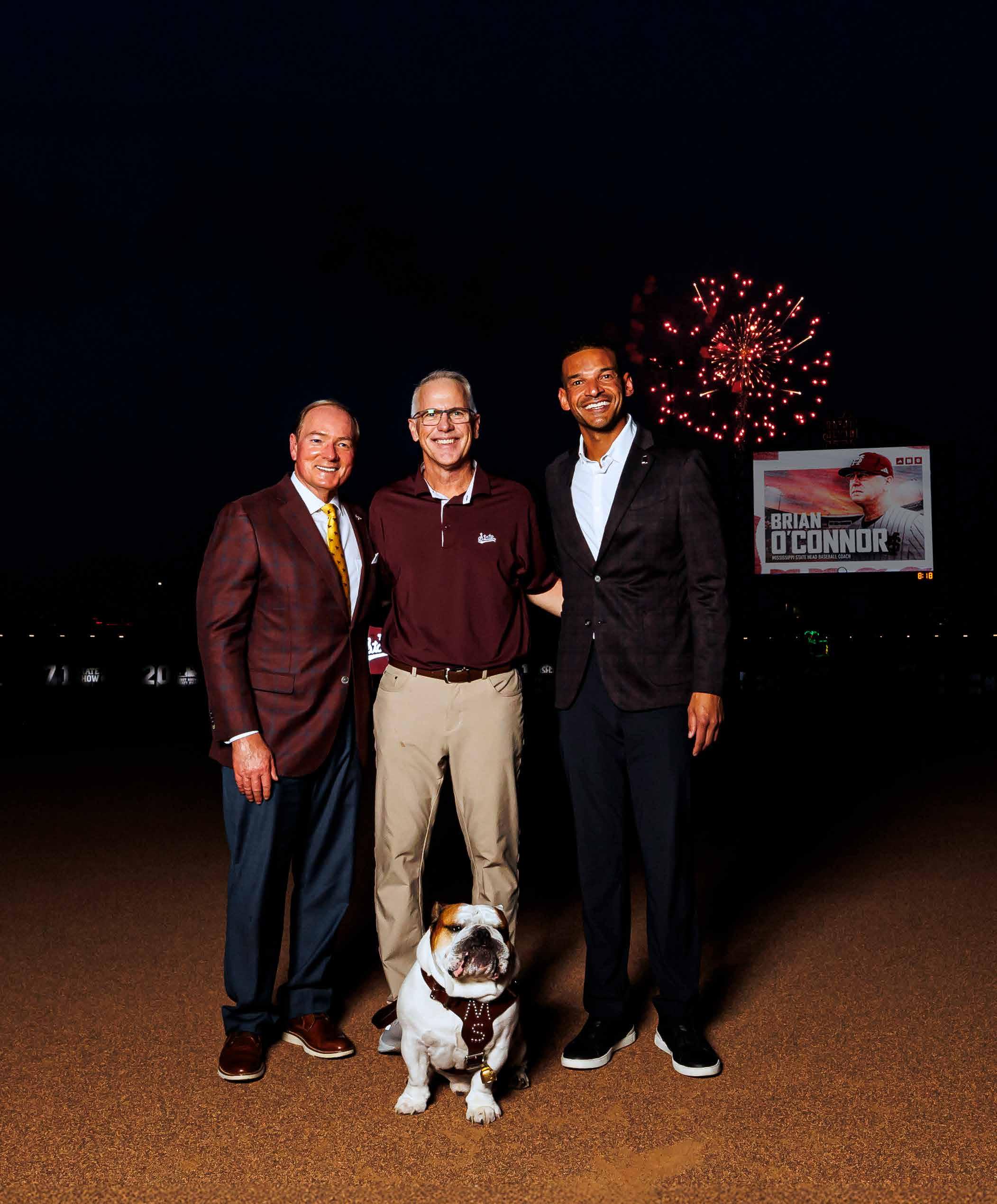

THE NEXT CHAPTER
MSU Bulldog leaders usher in a new era for storied Diamond Dawgs program p. 26
$1 BILLION

BILLION
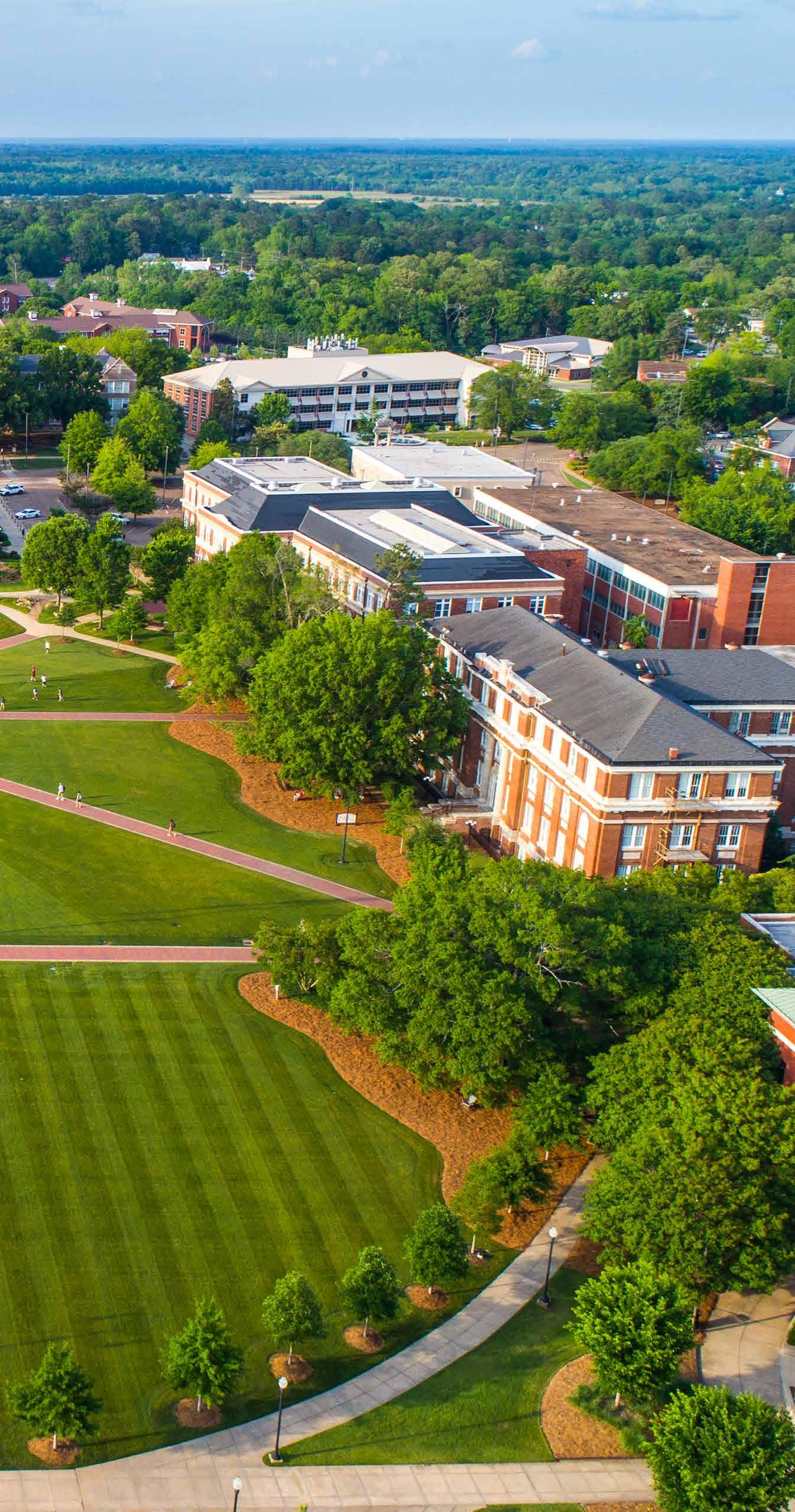
BILLION DOLLAR BULLDOGS
A fiscal year 2025 fundraising record of $260 million has grown Mississippi State University’s endowment, as well as its total assets, to more than a $1 billion value.
This was the second year the MSU Foundation has raised more than a quarter billion in a fiscal year.
University leaders credit unwavering support from alumni, friends and partners for getting the university to this milestone. Their belief in MSU’s mission and its vision for the future enables the university to continue to be a leader in research, teaching and service.
“This achievement not only showcases our donors’ generosity, it exemplifies our community’s dedication to the growth of our university and to the prosperity of our academic reputation,” explained John Rush, president and CEO of the MSU Foundation.
“These endowments are a key tool for attracting and retaining top talent, providing competitive salaries and resources for the faculty, as well as significant scholarship funding for students,” he added.
Currently, the MSU Foundation maintains 6,205 awards from private scholarships. It has established 110 endowed professorships and department chairs as well. n
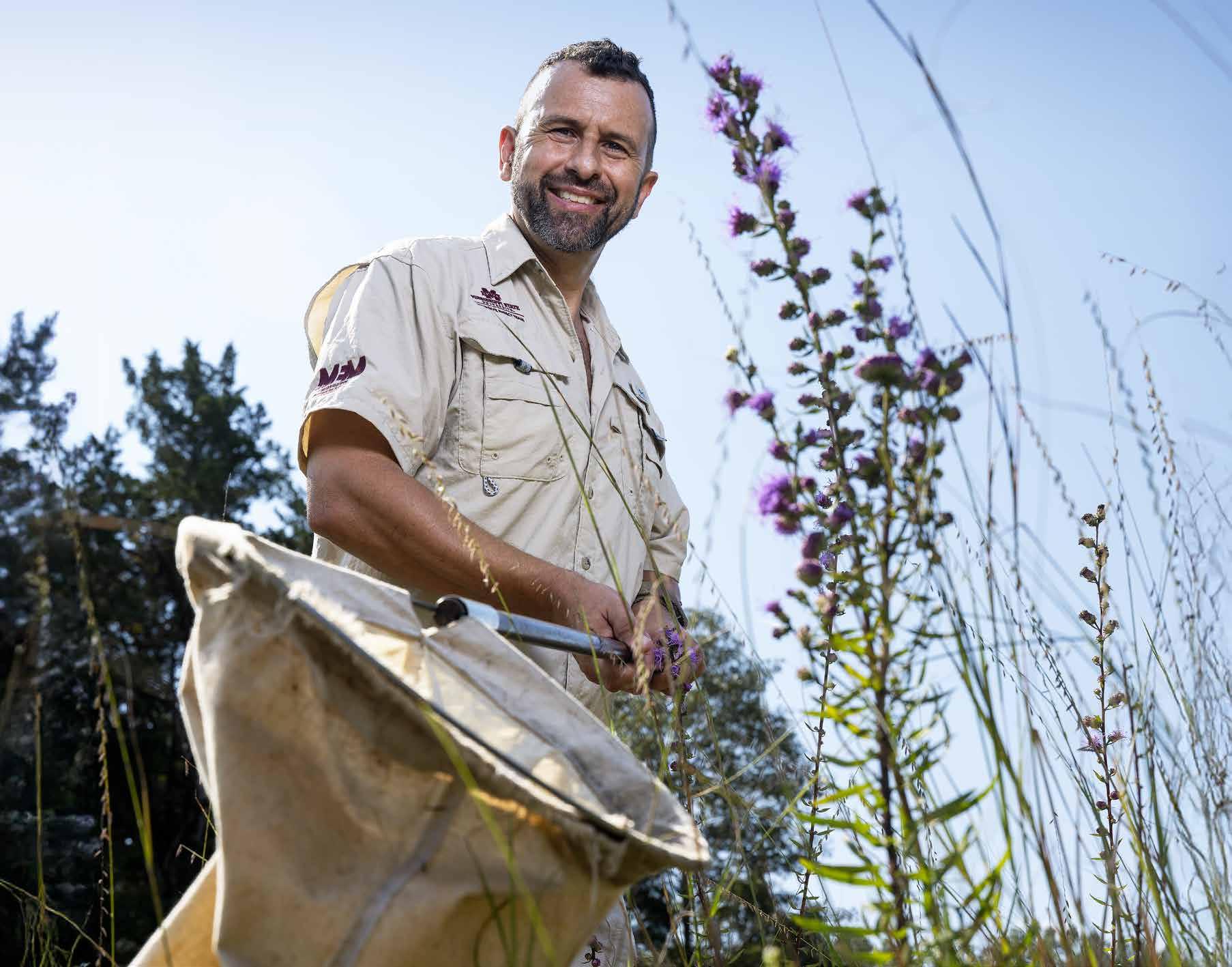
Hill,
the Mississippi Entomological Museum, chases grasshoppers with the same curiosity that first sparked his love for entomology as a child in Meridian—a passion that still drives his research today.
Three-time college Coach of the Year Brian O’Connor plans to leave his mark on the Diamond Dawgs program.
JoVonn
director of
Photo by Beth Wynn



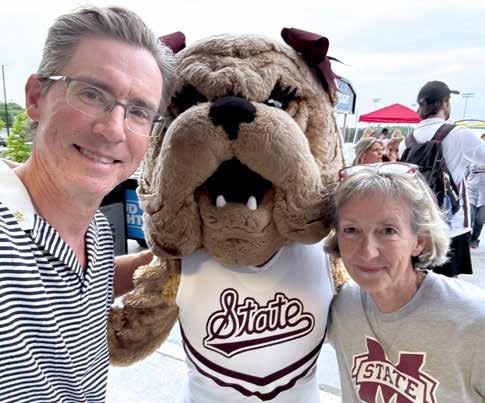

head baseball coach Brian O’Connor, center, stands with MSU President Mark E. Keenum and Director of Athletics Zac Selmon, joined by Dak the Bulldog mascot, during his welcome celebration at Dudy Noble Field. Photo by MSU Athletics
PRESIDENT
Mark E. Keenum, ’83, ’84, ’88
VICE PRESIDENT FOR DEVELOPMENT AND ALUMNI
John P. Rush, ’94, ’02
ALUMNI ASSOCIATION EXECUTIVE DIRECTOR
Jeff Davis
VICE PRESIDENT FOR STRATEGIC COMMUNICATIONS AND DIRECTOR OF PUBLIC AFFAIRS
Sid Salter, ’88
EDITORS
Susan Lassetter, ’07
Harriet Laird
WRITERS
Aspen Harris, ’26
Susan Lassetter, ’07
Allison Matthews, ’00
David Murray, ’80
Mary Pollitz, ’16
Shunecy “Shun” Pounds, ’14, ’18
Bethany Shipp, ’08
Carl Smith, ’10
Kevin Tate, ’94
Brock Turnipseed, ’99, ’01
DESIGNER
Heather Rowe
PHOTOGRAPHERS
Grace Cockrell
Emily Grace McCall, ’23, ’24
Beth Wynn
EDITORIAL OFFICE
P.O. Box 5325
Mississippi State, MS 39762
662.325.0630 slassetter@opa.msstate.edu
ADVERTISING
Leanna Smith 662.325.3360 lsmith@alumni.msstate.edu
Mississippi State University’s Alumnus magazine is published three times a year by the Office of Public Affairs and the Mississippi State University Alumni Association. Send address changes to Alumni Director, P.O. Box AA, Mississippi State, MS 39762-5526. Call 662.325.7000, or email cturner@advservices.msstate.edu.

U.S. Secretary of Agriculture Rollins
announces Rural Veterinary Action Plan during visit to Mississippi State University
By Allison Matthews
In a recent visit to Mississippi State University, U.S. Secretary of Agriculture Brooke Rollins announced a Rural Veterinary Shortage Action Plan to address critical needs relating to food animal health and large animal care in rural areas.
While in Starkville, Rollins toured many parts of campus, including MSU’s College of Veterinary Medicine, where she observed an equine emergency surgery in progress before making her announcements regarding the nationwide shortage in rural veterinary practice.
“Limited access to vet care is more than an inconvenience, it’s a direct threat to herd health and livelihoods. That’s why the USDA will continue to build significant partnerships with states, universities and farm groups to increase the number of veterinarians across rural America,” Rollins said.
“Being here at Mississippi State feels like coming home,” Rollins said. “Mississippi State is truly leading the way in cutting-edge technology as we fight for food security and farm security, meaning national security. We have no country if we cannot feed ourselves.”
While visiting MSU with U.S. Sen. Cindy Hyde-Smith, Rollins was briefed on the university’s leading research on Uncrewed Aircraft Systems, as well as its groundbreaking work in agriculture autonomy. She viewed the country’s largest and most capable fleet of UAS in academic use and learned about university advancements in the areas of antimicrobial resistance, aquaculture and fisheries, poultry and laminitis research.
MSU President Mark E. Keenum welcomed Rollins and Hyde-Smith and touted the university’s world-class faculty, leading
“Mississippi State is truly leading the way in cutting-edge technology as we fight for food security and farm security, meaning national security. We have no country if we cannot feed ourselves.”
~ Brooke Rollins
veterinary curriculum, as well as expanding facilities including a new large animal hospital and equine center.
“You got to see a surgery in progress, an equine emergency—that’s what we’re here to do—to serve our state, to prepare outstanding future leaders to excel in the profession. As you know, Madame Secretary, we have a dire shortage of veterinarians, especially rural practitioners, and so I appreciate your interest and your leadership to help address these critical challenges we face not only as a state, but as a nation,” Keenum said. “We’ve got to do all we can to serve our food animals, and of course we want to address issues for our companion animals, and we do an outstanding job with that. Looking at our vet students who are with us, we’re so
proud of what you are achieving.”
In further explaining the Rural Veterinary Shortage Action Plan, Rollins said, “We are enhancing and streamlining USDA’s veterinary grant programs. We’re making an additional $15 million available for the veterinary medicine loan repayment program and streamlining the application process to collect less information and allow submission via an online portal.
Second, we are commissioning new economic research to analyze and project veterinary shortages in rural areas, especially for food animal veterinarians.
Third, USDA is pursuing strategies to make federal service more attractive for our vets to create a direct pipeline into public service. And lastly, we will work with veterinary schools—including the great one
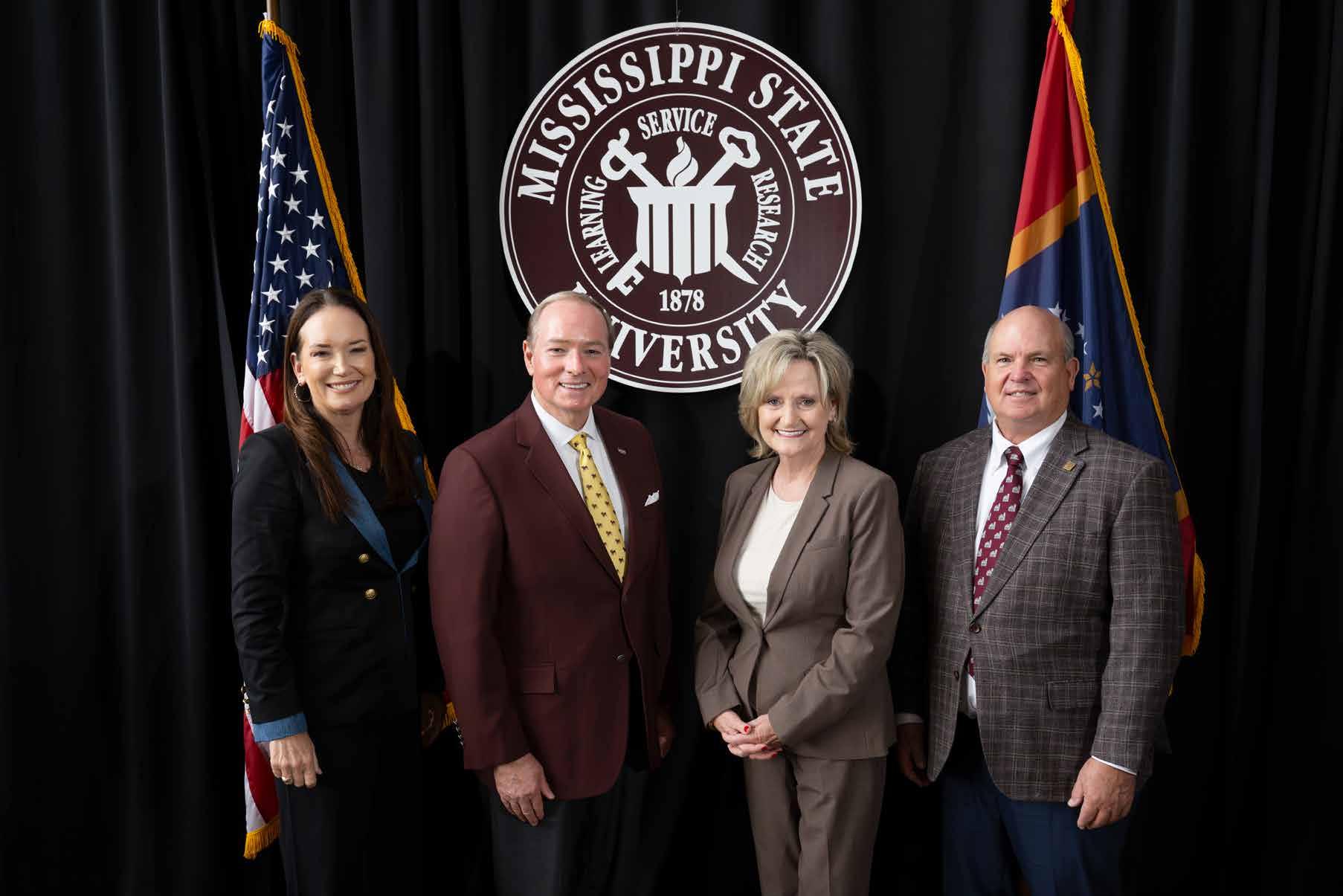
LEFT-RIGHT: U.S. Secretary of Agriculture Brooke Rollins, Mississippi State University President Mark E. Keenum, U.S. Sen. Cindy Hyde-Smith and Mississippi Farm Bureau Federation President Mike McCormick at MSU’s College of Veterinary Medicine following Rollins’ announcement of a Rural Veterinary Shortage Action Plan. (Photo by Beth Wynn)
Campus NEWS
right here in Starkville and across the country— to increase recruitment from rural America. Our ranchers can’t do their jobs without skilled veterinarians,” Rollins said.
Hyde-Smith referenced her own family’s Brookhaven stockyard.
“I know firsthand the hardships that farmers face when it comes to veterinary care,” HydeSmith said. “The announcement made today is going to have significant impact, and I am so grateful that we had the Secretary to come and do this. There are so many key issues to the health and the ag sector. It is national security. We have to be able to feed our people, we have to be able to feed this country.”
Mississippi Farm Bureau Federation President Mike McCormick also spoke of the partnerships needed to move rural communities forward in Mississippi and across the U.S.
“Mississippi State has long been a steadfast partner in this effort, preparing the next
generation of veterinarians who will dedicate their careers to the rural communities and livestock producers,” McCormick said. “We remain strong advocates for our rural communities, knowing full well that the future of agriculture depends on access to veterinary care. Without veterinarians, our farmers and ranchers cannot thrive. Without thriving farms, our rural towns and communities cannot thrive.”
Rollins also announced two new MSU alumni recipients of the veterinary services grant program. Dr. Rachel McCurdy, a 2020 MSU veterinary graduate who practices in Scott and Newton counties, will receive $125,000 for equipment for her clinic serving 200 recurring client farms in the shortage area. Dr. Kimberly Klunk, a 2021 MSU veterinary graduate and Pike County resident, will receive $125,000 for livestock reproductive equipment for her practice serving the area that includes Lincoln, Franklin and Adams counties. n
U.S. Secretary of Agriculture Brooke Rollins outlines strategies to combat the nationwide shortage of rural veterinarians, an issue with direct connections to food security, farm security and national security, she said, during her visit to Mississippi State University. (Photo by Emily Grace McCall)
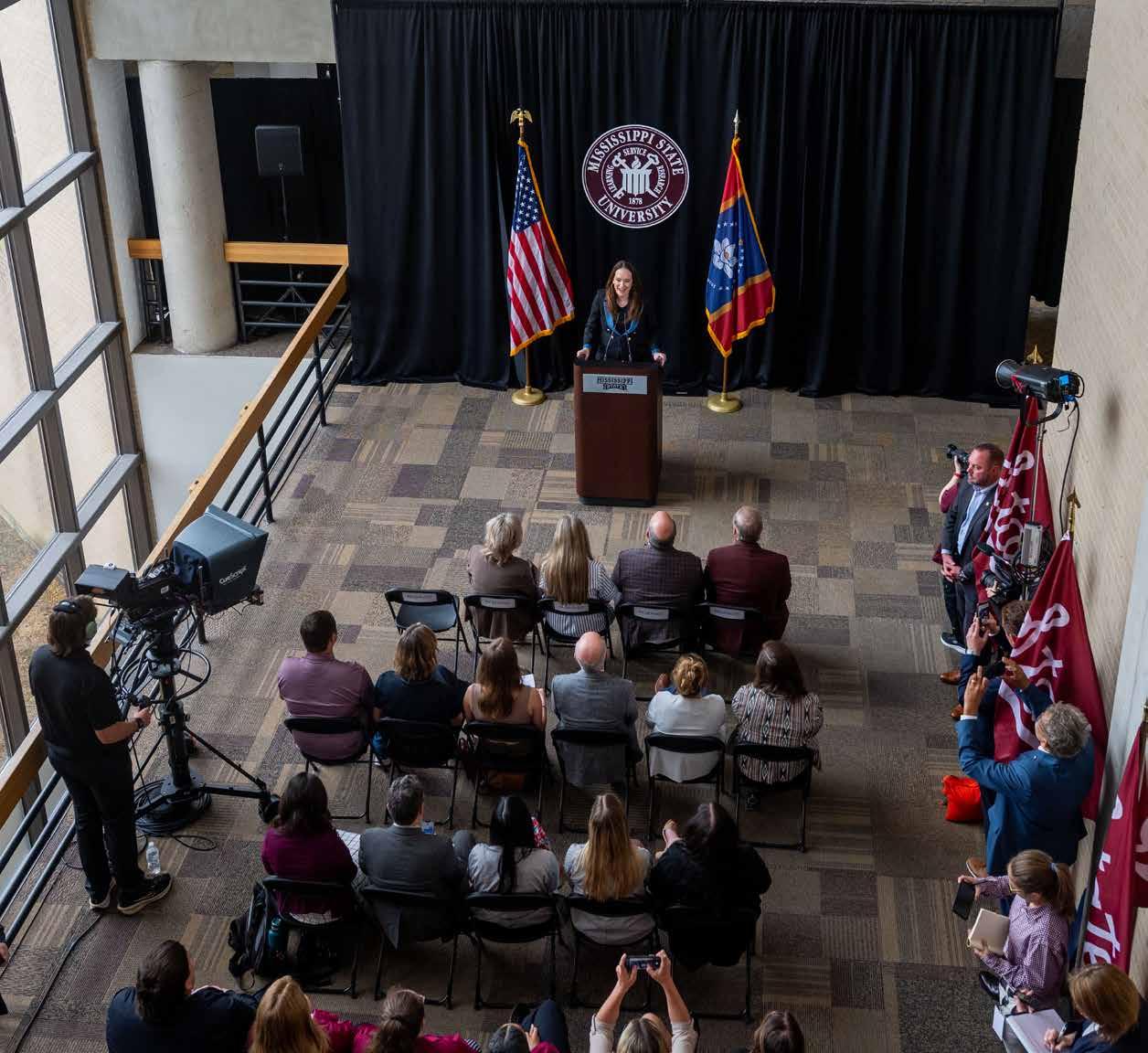
RIGHT: U.S. Secretary of Agriculture
Brooke Rollins visited Mississippi State University to learn more about the institution’s nationally recognized research and training. At Raspet Flight Research Laboratory, she toured the country’s largest academic fleet of uncrewed aircraft systems and received updates on MSU’s leadership through the Agricultural Autonomy Institute and the ASSURE alliance. She also spent time at the College of Veterinary Medicine, where she observed an equine emergency surgery before addressing the growing shortage of rural veterinarians. (Photos by Emily Grace McCall & Beth Wynn)
SHORTAGE OF VETERINARIANS AT USDA AND IN RURAL AMERICA PROMPTS ACTION PLAN
The growing shortage of veterinarians, within the USDA and across rural America, is alarming and carries the potential to threaten the safety of the U.S. food supply chain. In response, U.S. Secretary of Agriculture
Brooke Rollins announced a Rural Veterinary Action Plan to address this critical challenge.
Key elements of the Action Plan include:
• Enhancing and streamlining veterinary grant programs
• Conducting in-depth analysis of rural veterinary shortages to better define needs
• Recruiting and retaining USDA veterinarians
• Cataloging federal resources available to veterinarians starting or expanding a practice
• Engaging stakeholders, including veterinary schools, to better understand barriers to entry and strengthen recruitment from rural areas



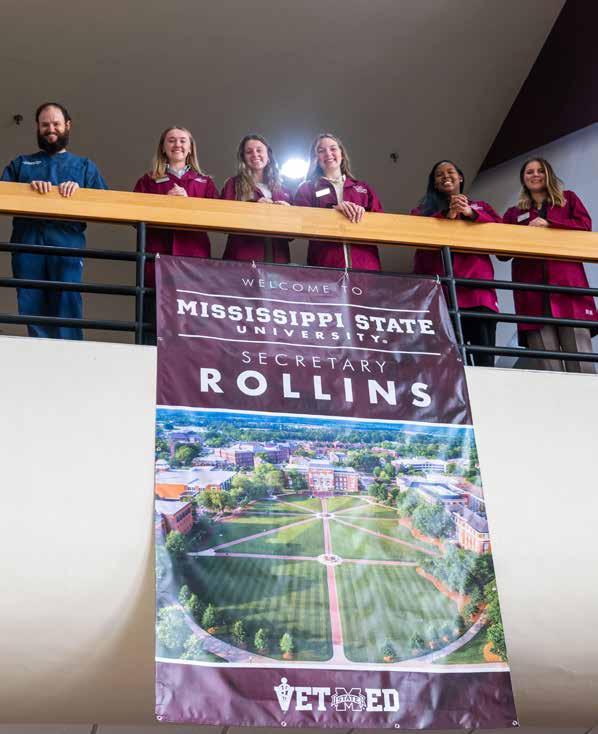

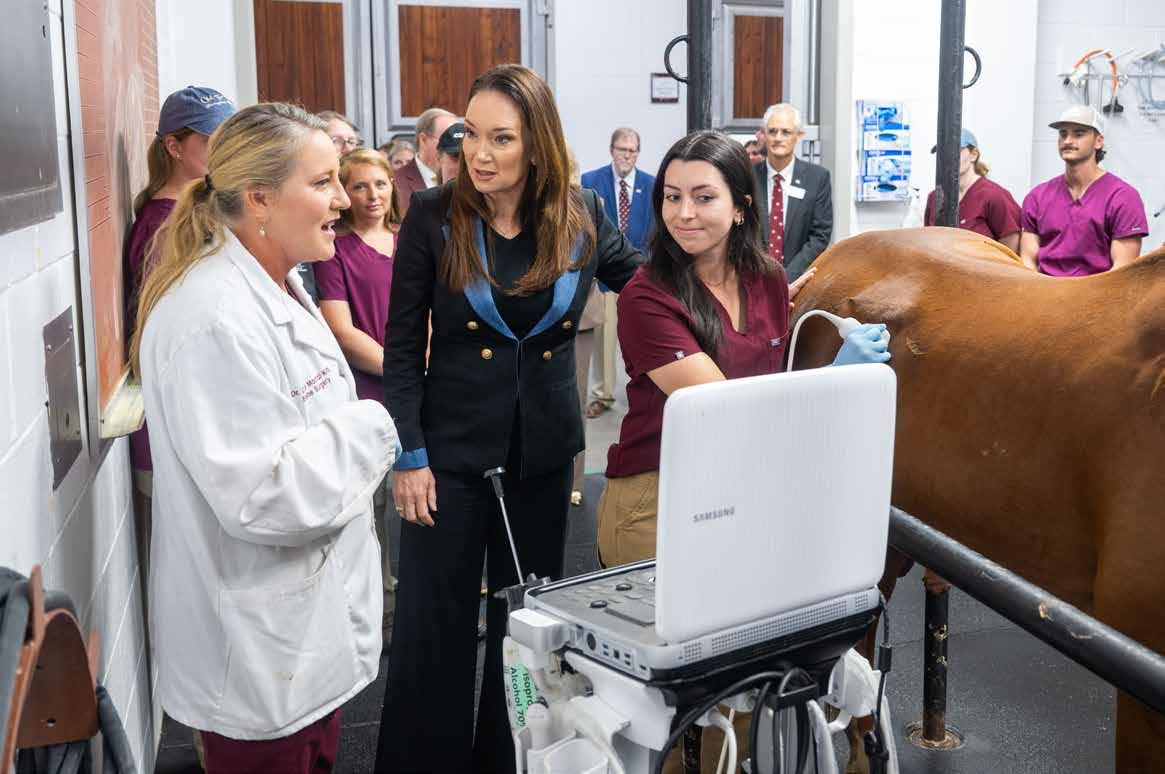

FINDING YOUR PLACE AT STATE
MSU creates pathways to belonging, support to better ensure student success
Mississippi State University helps students pursue success by fostering a sense of belonging and providing the tools they need to thrive—both inside and outside of the classroom.
Today’s student body includes Bulldogs from all 82 Mississippi counties, all 50 states plus Puerto Rico and the Virgin Islands, and 94 different countries—all bringing unique experiences to campus, but all sharing the need to feel supported and connected.
Research from Terrell Strayhorn, an American scholar and researcher on student success in higher education, shows that students who develop a sense of belonging are more likely to engage, persist and succeed. That’s why MSU prioritizes helping students—whether they’re from in-state or out—find their place, starting with fostering early relationships during the admissions process.
“Once a student applies or visits campus, we want to help them make personal
By Brock Turnipseed, Photo by Emily Grace McCall
connections, even before they enroll,” said John Dickerson, associate vice president for enrollment services. “We provide them with information on everything you can think of in the enrollment process, such as academic programs, financial aid, housing, campus life and involvement, and the Starkville community.”
Campus tours and preview days give students a firsthand look at these resources and the welcoming community waiting to support them.
According to Regina Hyatt, MSU’s vice president for student affairs, campuswide surveys conducted the last few years showed that about 25% of MSU students reported lacking a sense of belonging. This led to the university being more intentional in its approach to helping students build meaningful connections with peers, faculty and staff.
Fraternity and Sorority Life, or FSL, has been a consistent place of belonging that
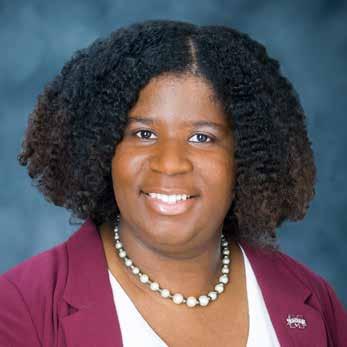
“Being involved and connected is important to student success because it’s how you expand your network, build community and understand the world around you.”
~ Ra’Sheda Forbes
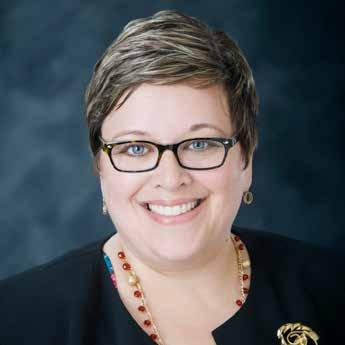
“Ultimately, our goal is to help students get their degrees. Evidence points to the importance of students building connections to campus as a way to help them get there. My excitement comes from seeing us move the needle so that more students are graduating and moving on to meaningful lives after college.” ~ Regina Hyatt
offers a structured community, leadership opportunities and academic support. FSL students return at a 93% rate and graduate at rates 15% higher than the MSU average.
For those who prefer different routes, MSU offers over 300 organizations to help boost student involvement. To broaden access and awareness, MSU launched the “Find Your People” campaign in 2023 with input from student leaders.
Events tagged with the campaign are promoted on Cowbell Connect, MSU’s source for students to find events and organizations, and through social media and campus signage.
“Our student leaders came up with the ‘Find Your People’ campaign, and our staff facilitated it by developing interventions, including programs and one-to-one engagement with students who may not have found their people,” Hyatt said.
MSU’s Division of Access, Opportunity and Success, or AOS, led by Vice President Ra’Sheda Forbes, helps students who are firstgeneration, limited-income, in foster care or experiencing homelessness build supportive networks with peers who share similar experiences through programs like TRiO, Promise and Thrive.
TRiO provides first-generation and limited-income students with academic, financial and career guidance. Promise helps students from economically challenging backgrounds transition to college life. Thrive offers skill development and resources to students who are or have been in the foster care system or impacted by homelessness or the loss of both parents. Students who take part in these programs demonstrate dramatically higher success rates than their peers.
These programs also help students get connected with the larger MSU community.
“Being involved and connected is important to student success because it’s how you expand your network, build community and understand the world around you,” Forbes said.
Hyatt noted time and cost often limit involvement, so MSU encourages organizations to reduce or remove financial barriers to increase accessibility. MSU has also increased financial support for FSL scholarships, making fraternity and sorority involvement available to a larger number of students.
AOS emergency funds help students who are experiencing unexpected financial challenges that could otherwise pause their education. For students facing these challenges, a strong support system is essential.
The Holmes Center for Student Success, named for Dr. Richard E. Holmes, MSU’s first African American student, provides a study space for students and partners with campus resources like the Career Center and the Center for Academic Excellence, or CAE, to provide academic and career support.
The CAE lays a foundation for student success from the start. The Freshman Success Kick-off Carnival introduces students to essential campus resources and services. All first-year students are assigned a Freshman Year Navigator who offers a personal connection and guidance, and the FirstYear Experience course provides a strong foundation in transitioning to college.
When students encounter roadblocks or hardships, the CAE can help get the student back on track through efforts like tutoring, Bulldog Rebound—which supports students on academic suspension—and Supplemental Instruction, or SI.
Through SI, students who previously earned an A in a traditionally challenging
course attend lectures and then lead regular study and review sessions. Used over 48,000 times in 2024–25, SI has helped students form study groups and supportive peer networks.
Support for student growth doesn’t stop at the classroom door. The university is equally committed to helping students take what they’ve learned and connect it to real-life skills and experiences.
MSU’s Quality Enhancement Plan, the Bulldog Experience, focuses on helping students translate classroom knowledge into practical problem-solving. One of the most accessible and impactful ways to do that is through on-campus employment.
Thousands of students work across campus, and the Maroon Leadership, Employment and Development for Students, or L.E.A.D.S., initiative ensures those jobs offer more than just a paycheck.
Through LinkedIn Learning modules and guided reflections, students develop careerreadiness competencies while supervisors provide feedback and connect their daily tasks to future goals.
The Career Center helps students find on-campus employment and develop careerreadiness skills, including resume writing, interviewing and networking.
Whether it’s a student who finds their people through an organization, a mentor in their academic program or a meaningful job on campus, MSU works to ensure every student has the chance to thrive.
“Ultimately, our goal is to help students get their degrees,” Hyatt said. “Evidence points to the importance of students building connections to campus as a way to help them get there. My excitement comes from seeing us move the needle so that more students are graduating and moving on to meaningful lives after college.” n

ESPORTS BULLDOGS DOMINATE IN FAST-GROWING GAMING LEAGUE
As a nationwide leader in emerging technological trends, it should come as no surprise that the Bulldogs lead the Magnolia State in competitive video gaming, known as esports.
In October, Mississippi State Esports won the 7th Annual Esports Egg Bowl hosted in Oxford. It was the team’s second consecutive victory against in-state rival Ole Miss, bringing the Bulldog’s all-time record to 5-2 when facing the Rebels—and they’re just getting started.
Through events, streaming channels and fundraising to support expansion, training and visibility, club president Ben Maier says MSU Esports is poised to give the Bulldog family more reasons to cheer.
“I’m very excited to be leading this club and of the success we’ve had. But there’s
more to come,” Maier, a junior in aerospace engineering, said. “We’re planning a lot of things that will help take us from a niche club to a mainstream team that’s known across campus.”
Though its roots go back to the 1970s, esports is a relative newcomer to the competitive sports scene. And while those unfamiliar with the field sometimes balk at the term “sport” being applied to video gaming, those who compete are quick to point out the similarities between their pastime and more traditional athletic endeavors.
Like other sports, competitive video gaming requires fast reflexes, strategic thinking, impeccable hand-eye coordination, specialized knowledge and teamwork. The only difference is these skills are applied to a
By Susan Lassetter, Photos by Emily Grace McCall
digital environment rather than a field, pitch or court.
“It’s just like a regular sport,” explained Will Bratton, a senior in geosciences, who served as club president last year. “We are constantly refining our craft, and each team member brings certain skills and abilities to the group.”
Within an esports team are specialized rosters that focus on a specific video game— similar to how baseball teams will have a roster of players to fill different positions. Esports competitions involve one or more preselected video games that will be played. Each team will then "field” their best players for each game. A competition could be determined by who performs the best on the selected title or, when multiple games are
Mississippi State Esports team members (L–R) Henry Tate Smith, Nathan Ruda, Mason Marchionda, Eric Cooper and Gage Fulwood helped the Bulldogs secure their second straight Esports Egg Bowl win over Ole Miss. With more than 25 competitive rosters and a growing national presence, MSU Esports continues to prove that Bulldogs dominate in the fast-growing world of collegiate gaming.
played, performances are combined to decide the overall competition winner.
In the Esports Egg Bowl, for instance, each competition includes three to seven different video game titles. The best performing roster for each title earns that “win” for their university. At the end, the university with the most wins, wins the Esport Golden Egg. Last year, MSU took the Egg Bowl in a tight 4-3 decision.
MSU Esports boasts more than 25 competitive rosters that cover 18 esports titles. Since its creation, MSU Esports has had six teams place nationally in league play. Leagues operate much like the Southeastern Conference or NCAA by bringing together competitors under umbrellas that formalize the competition process. One of the largest of these organizing bodies is the National Esport Collegiate Conference which has more than 500 member schools and 30,000 active students.
“We have seasons, tournaments and championships. It’s really well organized and extremely competitive,” Bratton explained. “And just like a regular sport we want bragging rights.”
Bratton says one of the main differences between MSU Esports and those that fall under the NCAA is the level of financial support.
While those sports recruit players through scholarship offers, MSU Esports has no such incentive to offer at this time. Instead, the members of MSU’s Esports community, which is more than 2,000 strong, are all involved simply for love of the game.
“Other schools offer esport scholarships and have staff members dedicated to coaching and organizing the teams,” Bratton said. “At MSU, we’re completely student led. As successful as we’ve been, think how far we could go with more resources.
“It’s the fastest growing competitive scene in the world, and we want to be the best of the best,” he continued. “I think it’s important to continue to push the bounds of what esports can be at MSU.”
Both Bratton, a St. Louis, Missouri native, and Maier, who hails from Texas, came to MSU for its academic offerings. While Bratton had competed in esports in high school, Maier was a casual gamer when he arrived on campus. Maier said that’s part of what makes esports special.
“You don’t have to be a hardcore gamer to be part of our club,” Maier explained. “It is competitive, but it’s not just that. It’s also a community, a connection. College can be hard and, without friends, it would be even harder.”


Bratton added, “But if they want to put the time in, they can become elite players. That’s the great thing, just about anyone can be part of esports.”
Much of MSU Esports’ activities take place online, but leaders also host in-person events for the community. The group also now has a dedicated space in the newly renovated Butler Hall, which houses the Department of Computer Science and Engineering.
With this dedicated physical space, and plans to host the Eighth Annual Esports Egg Bowl in November, Maier said the club is poised to rise in popularity. In addition to start of the semester recruiting events, he said the team is going all in for the next Esports Egg Bowl.
Maier said they have plans for interactive demonstrations at the event, as well as livestreams of the competition and complete analysis and coverage worthy of ESPN.
“You might think it’s just people pushing buttons at a keyboard, but it really is a spectacle to watch,” Maier said. “We’re happy to have won the past two Egg Bowls and we plan on defending that streak with everything we have. And I encourage everyone to come out or tune in and watch to see what MSU Esports is all about.” n
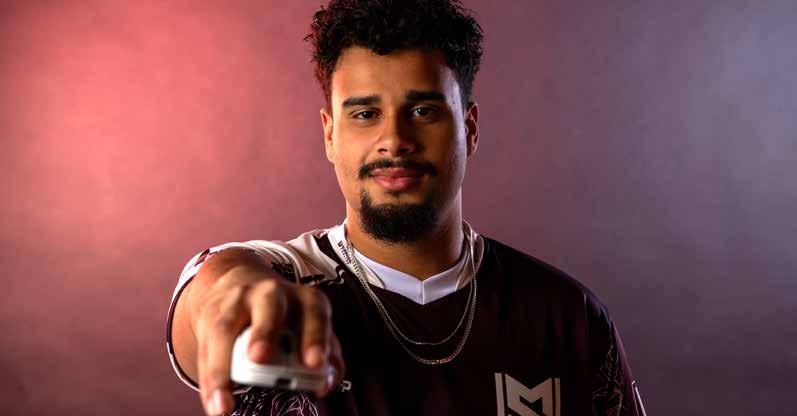
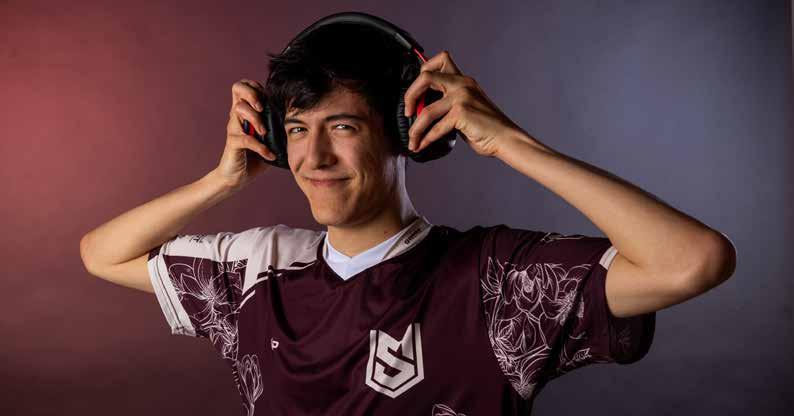
UNVEILING THE TRANSFORMATIONAL CROSSROADS DISTRICT

Anew 15-acre, mixed-use development will create a crossroads of entertainment, culture and history at the intersection of Mississippi State’s campus and the historic Cotton District.
Called the Crossroads District, the planned development was announced in August. It will be anchored by Hotel Madelon—a 122-room Marriott
Tribute Portfolio hotel. Construction of Hotel Madelon is currently underway, and the hotel is expected to open in the summer of 2027. It will include a fullservice restaurant and rooftop bar, offering dynamic views of campus and downtown from its prime location on University Drive.
The district itself will develop in phases over the coming years and is expected to include:
• Local restaurants, curated shopping and dynamic entertainment venues
• A new home for the Ulysses S. Grant Presidential Library
• A pedestrian land bridge over Highway 12 for a direct and safe connection between the university and the development
• New housing for faculty and staff
• State-of-the-art office and innovation spaces
• Convenient parking with a 700-space garage




HAVE A YOUNG BULLDOG IN YOUR LIFE? HAVE A YOUNG BULLDOG IN YOUR LIFE? Wrap them in Maroon and White

Campus

Johnie N. Jenkins was named a 2025 Samuel J. Heyman Service to America Medal honoree. Considered the “Oscars of government service” the award celebrates individuals and teams whose accomplishments demonstrate the vital role expert, apolitical civil servants play in daily life. Jenkins is director of the USDA’s Agricultural Research Service Crop Science Research Laboratory at Mississippi State University.

Ridwan Ayinla, a doctoral student from Mississippi State’s College of Forest Resources, is one of only 35 people from across the globe joining the American Chemical Society’s prestigious Chemical Abstracts Services Future Leaders Class of 2025.
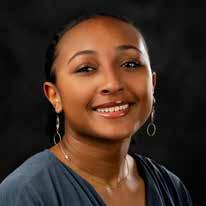
Nyla Jones, a natural resource and environmental conservation major from Memphis, Tennessee, has been named a fellow in the Public Policy and International Affairs Program’s Junior Summer Institute—a prestigious and intensive national fellowship
program at Harvard University. She is an MSU John and Renee Grisham Presidential Endowed Scholar.

North Little Rock, Arkansas native Claire Green earned multiple national honors last spring. She was named a 2025 Udall Scholar recognizing her rising impact on public policy and environmental health and earned the prestigious Truman Scholarship, receiving up to $30,000 in graduate-study expenses. The biochemistry major concentrating in entomology is a Louis A. Hurst Jr. Presidential Endowed Scholar and student in the Judy and Bobby Shackouls Honors College.
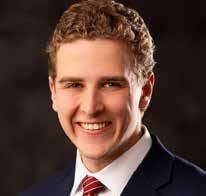

Physics and biological engineering major Spencer Lile of Benton, Arkansas, and electrical engineering major Brittin Perdue of Tuscaloosa, Alabama, are the university’s latest recipients of the nationally renowned Astronaut Scholarship, a designation that recognizes the best and
brightest science-, technology-, engineeringand mathematics-focused students in the U.S. Lile and Perdue—both students in MSU’s Judy and Bobby Shackouls Honors College— also are the university’s 26th and 27th national Barry Goldwater Scholars.

Mississippi State’s own Andrew Rendon, the university’s executive director for veteran and military affairs, is the Magnolia State’s 2025 Veteran of the Year, designated by MilitaryFriendly.com. In addition to his civilian role as a longtime professional member of MSU’s Division of Student Affairs, Rendon is a brigadier general in the Mississippi National Guard.

Jamie Runnells, who taught at MSU from 2002-2013, returns after serving a stint as coordinator of Jacksonville State University’s Master of Fine Arts program, where she also held the title of distinguished professor of visual communication. Runnells began her new role in the College of Architecture, Art and Design in July.
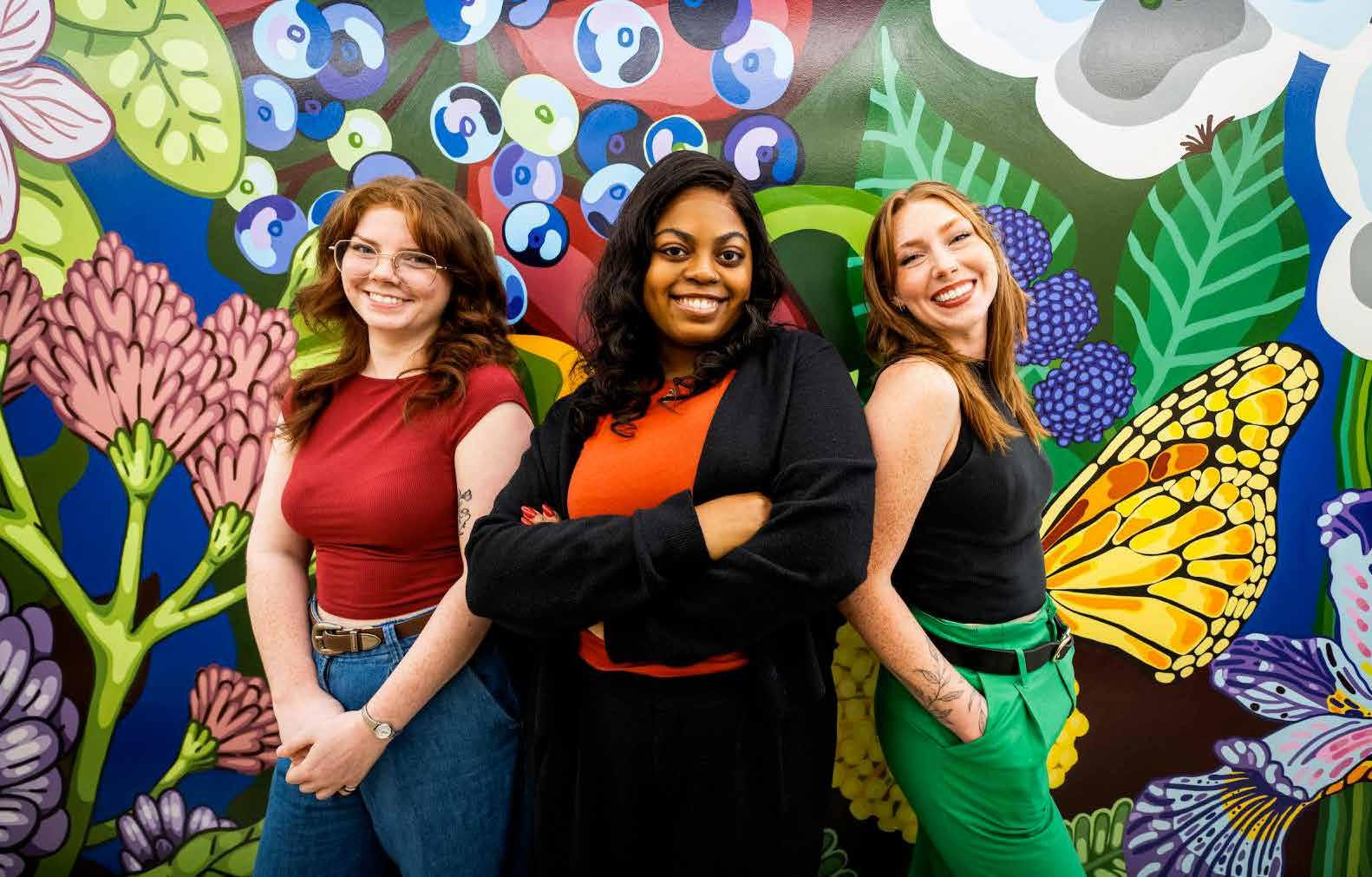
Another mural is brightening the halls of campus through a collaboration of Mississippi State’s Department of Art and the Department of Biology. Located on Harned Hall’s ground floor near the university’s herbarium, a vibrant mural featuring native Mississippi plants and pollinators was begun by Starkville native Mary Sanders, a 2023 graduate. Under the guidance of their advisor, Professor Soon Ee Ngoh, senior art major Sarah Demus of Jackson and May 2025 art graduate Sadie “Bella” Brownlee of Louisville have spent the past year adding new artwork that seamlessly ties into Sanders’ work.
Eight Mississippi State students are heading abroad this year with the help of the highly competitive Benjamin A. Gilman International Scholarship, marking the largest group of MSU recipients in university history. Funded by the U.S. Department of State, the Gilman Scholarship provides financial support for undergraduates to study abroad, with the goal of broadening access to global education. 2025 MSU Gilman Scholars include: Jeremy Padilla of Bay Springs, Nicholas Welch of Biloxi, Jesus Morales of Brandon, Kaylee Reid of Brilliant, Alabama, Rayne Lewis of Jackson, Yuvraj Singh of Madison, Apollo Stafford of Saucier, and Shamar Hunt of Southaven.
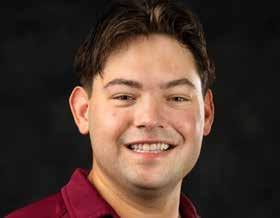
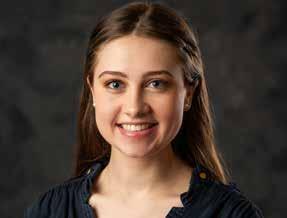

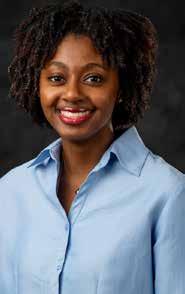
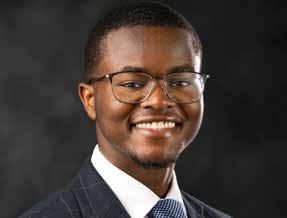
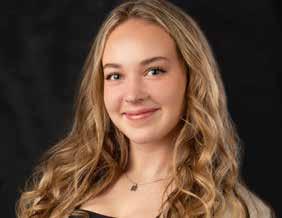
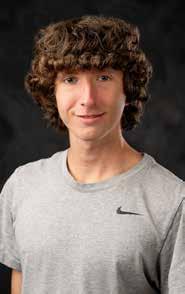

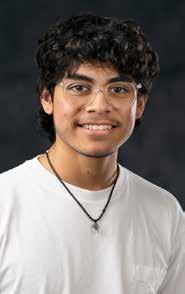

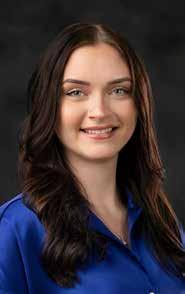

Four Mississippi State spring graduates are 2025 Fulbright finalists—a record number for the landgrant institution. Julian Dedeaux of Biloxi, Alijah Jones of Greenwood, Lily Langstaff of Southaven and Alyssa Williams of Franklin, Tennessee, were named finalists for the prestigious Fulbright U.S. Student Program awards—the U.S. government’s flagship international educational exchange program—for the 2025-2026 academic year. All four students were members of MSU’s Judy and Bobby Shackouls Honors College during their undergraduate studies.
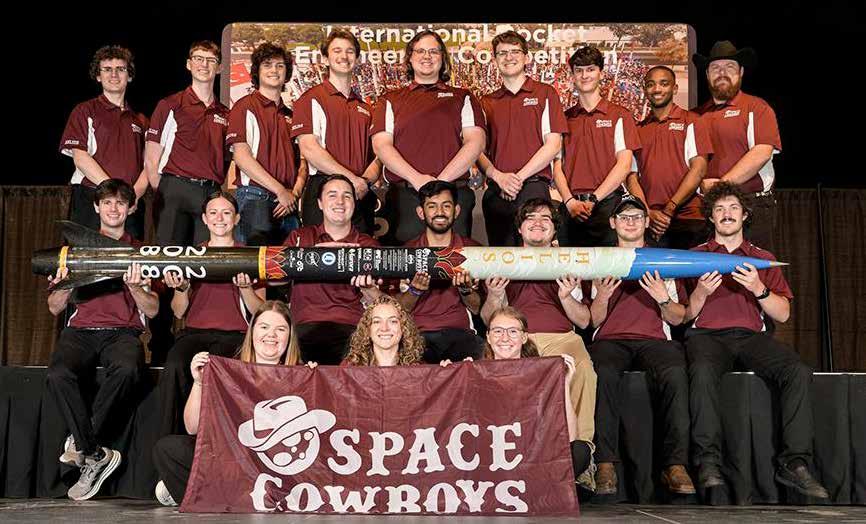
Building on the university’s generations of support for America’s veterans, Mississippi State is being recognized this year as a Top 5 Military Friendly School.
Mississippi State's Department of Classical and Modern Languages and Literatures now offers the Global Seal of Biliteracy to MSU students, becoming the first university in Mississippi to sponsor the internationally recognized credential. The Global Seal of Biliteracy certifies an individual’s proficiency in both English and at least one additional language. Established in 2018, the Global Seal is available in approximately 60 countries worldwide.
Mississippi State’s Department of Communication, Media and Theatre has earned national ACEJMC accreditation for its undergraduate programs in journalism and public relations, a distinction held by just 120 programs nationwide that enhances reputation, curriculum and career opportunities.
The Mississippi State Space Cowboys rocketry team soared to a first-place victory in August at the 2025 International Rocket Engineering Competition, marking the second time in the last 10 years the team has won a category. Held in Midland, Texas, the event welcomed more than 143 teams from 22 countries to evaluate their rockets on altitude, engineering design, safety and mission objectives. MSU finished sixth place in the overall competition.
Padilla Welch Morales Reid
Lewis Singh Stafford Hunt
Dedeaux Jones
Langstaff Williams

NEW WAY OF THINKING MSU helps high school students, teachers explore innovative applications of AI
When you think of artificial intelligence, what comes to mind?
For many, it’s text-based prompts. But for Mississippi State researchers, it’s much broader. As they look to the future of AI applications, they’re introducing the next generation to a new world of possibilities.
This summer, MSU hosted high school students and teachers for a weeklong camp filled with innovative, hands-on activities focused on machine learning. But the fun didn’t end with camp. The MSU interdisciplinary team will continue to work with the cohort throughout the school year. Supported by a $1.2 million National Science Foundation grant, the project aims to promote AI competency and career readiness.
Yan Sun, an associate professor of instructional technology in MSU’s College of Education, serves as the project’s principal investigator. The collaborative effort also includes Jingdao Chen and Zhiqian Chen, assistant professors of computer science and engineering, as well as undergraduate
By Bethany Shipp, Photos by Emily Grace McCall
mentors. Over the course of the three-year grant, the team will work with 60 students and 15 teachers from high schools in rural areas of the Magnolia State.
A PARADIGM SHIFT
The idea for the project stemmed from the team’s observation of the rapidly changing AI landscape and its impact on education.
Sun believes that with the explosion of AI, it’s time for a fundamental shift in computing education. Traditionally, it has been focused on programming, which involves giving a computer a set of instructions for performing a specific task.
“AI is changing everything in our daily life–how we work, how we live. So, it’s time for us to also have a change in computing education,” Sun said. “With our project, instead of just focusing on programming, we’re introducing a new paradigm focused on computational action, emphasizing the empowerment of students to use their computational skills to address real-
world problems and contribute to positive social change.
“When students are programming in the traditional sense, the machine simply follows explicit instructions. It’s not really ‘thinking,’” Sun explained. “But with computational action, students will be training the machine to recognize patterns and make decisions, which mimics intelligent behavior. That’s why we need to teach students to think in fundamentally new ways—very different from how we taught programming in the past.”
This new approach is a learning curve for not only students but also their teachers, which is why the team is including high school computer science teachers in the project.
“We’re hoping the teachers will implement what they learn through our project in their own classrooms,” Sun said. “Traditionally, K-12 teachers and university researchers have been two separate academic communities. But we want to use this project to link the two communities and serve as a future resource for teachers.”
GETTING HANDS-ON
During the summer camp, the MSU team engaged participants from Clay and Lowndes counties in creative games and activities that incorporated image classification, a cuttingedge AI technique. In simple terms, image classification is the process of training a computer to recognize and categorize images through machine learning, which enables the computer to detect patterns and make decisions based on data.
For Tullos Walker, a 10th grade student at New Hope High School, the best part was the TurtleBot activity, which involved guiding a robot through a maze using AI. To accomplish this task, the students designed their own stickers and used Google Teachable Machine to train an image classification model to recognize them. By applying this trained model and precoded rules that link each sticker to a specific movement, the students were able to guide a TurtleBot through the maze by placing the stickers along the path.
“The TurtleBot had a camera on the end that was connected to an image classification model,” Walker explained. “So, we put stickers down and trained the model to recognize the images on those stickers. One image could mean move 10 inches forward. Another could mean turn right or left–all the directions we needed to get our TurtleBot through the maze.”
Not only was the activity a fun way to illustrate image classification, it also gave students a chance to exercise problemsolving skills.

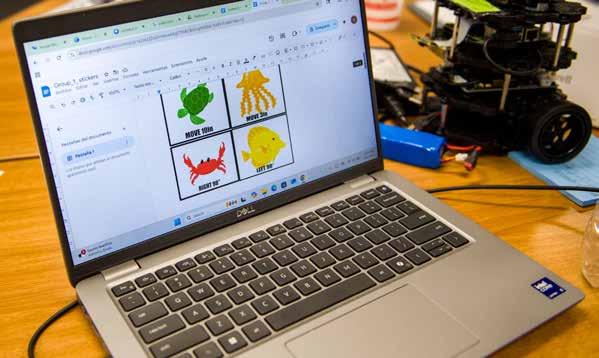
“I really like how it brought our team together. Problem solving and using our time effectively was a huge part of it,” Walker said. “The camp activities definitely opened my eyes to the different ways AI can be used.”
The TurtleBot activity was Jaya Herman’s favorite as well. A 10th grade student at West Point High School, Herman also enjoyed the balloon pop game, which was built by MSU researchers using machine learning techniques.
“The balloon pop was really fun to do but also fun to analyze,” Herman said. “After we played the game that the project team built, we got to make our own. We looked up our own balloon images, fed them to the model, and then got to play them in class and see how well they worked.
“It was kind of funny because all of us had the same issue. It wasn’t perfect, but we got to try it out for ourselves and fix things,” Herman recalled.
While the camp provided plenty of hands-on learning activities, it also gave students opportunities to present. Herman, for instance, gave nine presentations during the camp.
“This experience got me out of my comfort zone,” Herman said. “I don’t think I’m ever going to have a problem with presenting in class again.”
FUTURE IMPACT
Susie Oglesby, a two-time MSU education alumna, and a STEM teacher and robotics coach at New Hope High School, loved the


collaboration during the camp and how well the undergraduate mentors related to the students. She also noted how impressed she was that the MSU team taught the students to present, which she says is very rare.
“I can see the benefits of this project as a teacher because I know how valuable it is for students to present, to have hands-on experiences,” Oglesby said. “Some of the activities are simple enough that I can do them in my own classroom.
“The impact of this project is going to change these students’ lives because now they’ve made new friends, and they’ve met someone who is connected to the university. I wish every high school computer education class could go through a program like this,” Oglesby added.
During the academic year, the MSU undergraduate mentors will visit the school districts weekly to continue working with the cohort on increasingly complex projects, such as a smart door system and sorting machine. Their hard work will culminate in a showcase next summer.
From Sun’s perspective, the camp was a successful first step in the cohort’s AI journey. Her hope is that the students will develop a further interest in STEM fields and create their own AI solution one day.
“After this project, we hope to send these students into the trajectory of a STEM career related to AI,” Sun said. “Perhaps they will develop their own intelligent system in the future that will serve our community’s needs.” n

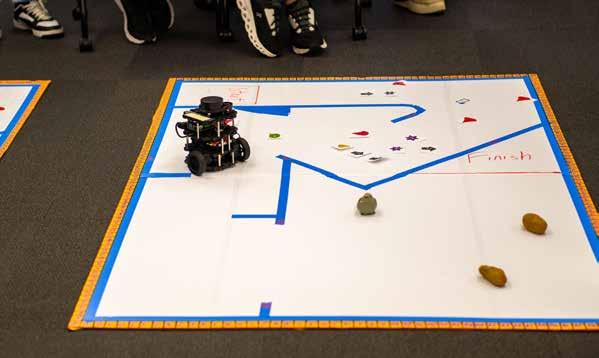
HE’S GOT ‘HOPS'

Mississippi State entomologist JoVonn Hill has turned a childhood curiosity for chasing insects into a career of discovery. His work is expanding one of the South’s largest biological archives while documenting more than 50 new species.
MSU entomologist discovers 50 species, contributes to university’s ‘library of life’
Before he was the director of the Mississippi Entomological Museum at Mississippi State, JoVonn Hill was a curious kid in Meridian chasing bugs through his backyard. He spent countless hours outdoors, collecting insects without knowing he was building the foundation of his life’s work and passion.
“I’ve got the job a little kid would like to have,” he laughed. “I go and I catch bugs for a living.”
Today, that childhood passion has taken him through prairies and deserts—from Mississippi grasslands to the arid landscape of New Mexico and Arizona—leading him to discover more than 50 new species of grasshopper. Each one Hill documents, names and preserves as a part of MSU’s evergrowing biological archive.
By Mary Pollitz, Photos by Beth Wynn
Hill said there’s not a specific formula for grasshopper-catching success, but thanks to his childhood curiosity and years of practice, he’s almost perfected the art.
“There may not be science, but there’s definitely a skill to it,” he said.
Now the director of one of the top entomological collections in the Southeastern Conference—one which houses more than two million specimens—Hill leads the charge in taxonomy and species discovery for the university. He’s quick to credit his team and his mentor, former museum director Richard Brown, for paving the way.
“I’ve added a lot of specimens here, but I’m just keeping up the momentum that my predecessors started,” he said. “Our collection here at MSU spans years. It’s a library of life.”
FINDING GRASSHOPPERS
In 2010, Hill was walking through a cedar glade in Nashville—a habitat that’s been studied since the 1800s—when a grasshopper caught his eye. It didn’t match anything he’d seen before. He took it back to the lab, placed it under the microscope and compared it with existing collections and literature.
It turned out to be the first new species the then-graduate student would discover. Though it’s happened 49 more times, he claims that first was just pure luck.
“Definitely serendipitous,” he said with a laugh. “There’s a ton of research I do beforehand now. But that day, I just walked into the glades, and it was the first thing I saw.”
After that, he was hooked. He soon
discovered enough new species that he started to run out of names. This led him to one of his most noted discoveries: a new Texas hopper he named in honor of one of America’s greatest country music icons.
Melanoplus nelsoni, named after Willie Nelson, was discovered in prairies and grasslands throughout central Texas. Belonging to the Melanoplus genus, one of the largest groups of American grasshoppers, Hill named the new species in honor of the style of music he and his field crew listened to while driving from site to site.
Finding a unique species is a rigorous process, he said. Governed by the International Code of Zoological Nomenclature, every species must be justified, have its differences described in detail and a “type specimen”—the gold standard for that species—designated.
“That one specimen becomes the reference for the whole species going forward,” Hill explained.
Though tasked now with paperwork, teaching courses and managing a team of graduate and undergraduate researchers, fieldwork remains his first love— especially with company.
“I just recently went on a trip to North Georgia by myself. It wasn’t nearly as fun,” he said. “Catching grasshoppers is great, but being out there with my staff and students, that camaraderie and mentorship, makes it twice as fun.”
HELPING OTHERS
A three-time MSU graduate, Hill said he wants to emulate the impactful mentorship he felt as an undergrad. Being able to pique students’ curiosity and help them find paths to success is just another aspect that makes his job incredibly worth it.
“I love finding ways for others to succeed,” he said. “I always felt I was very fortunate because Dr. Brown reached out to me about graduate school. I felt that I was in the right place at the right time. But that wasn’t it.
“He didn’t grab the first person that walked by. He saw something in me,” Hill continued. “Now I’ve been
able to do that and there’s no better feeling than seeing somebody grow and mature, and plugging them into the right thing.”
What his predecessor and mentor did for him, Hill has passed on to museum research associate and Starkville native Shelby Grice. As an undergrad, Hill helped her land a student-worker role, where she quickly fell in love with taxonomy, the science of describing and classifying organisms.
“This was something I could really sink my teeth into,” Grice said. “It’s such a deep field. Surface knowledge doesn’t even begin to explain it.”
Grice remembers her first time in the field—sweeping Sumter Prairies in Alabama. She found a specimen she recognized, but it was one that Hill, despite visiting the site countless times for 20 years, had never encountered in the region.
“I’d never seen a more flabbergasted look on his face,” she said with a laugh. “It ended up being a new state record for Alabama. It was funny to both of us that on my very first trip, I’d make this discovery. Just like he did as a student.”
Along with other graduate students, Grice has traveled with Hill across the country, stopping in Texas and Arizona, collecting specimens, and making pit stops to stretch their legs and sweep through roadside grasslands just in case something interesting was hiding there.
“No matter where we were, everything we found in the field, JoVonn knew,” Grice said. “He could tell us their entire background. He comes out in the field with his utility belt and supplies and looks just like Batman.”
But for all his experience and discoveries, she said, Hill remains humble.
“He doesn’t brag at all,” she said. “He’s very good at what he does, and he’s made a ton of discoveries that have contributed so much to Mississippi State. It feels surreal to work and learn from him. I’ve made all these connections in entomology because of him. He’s the reason I’m here.” n

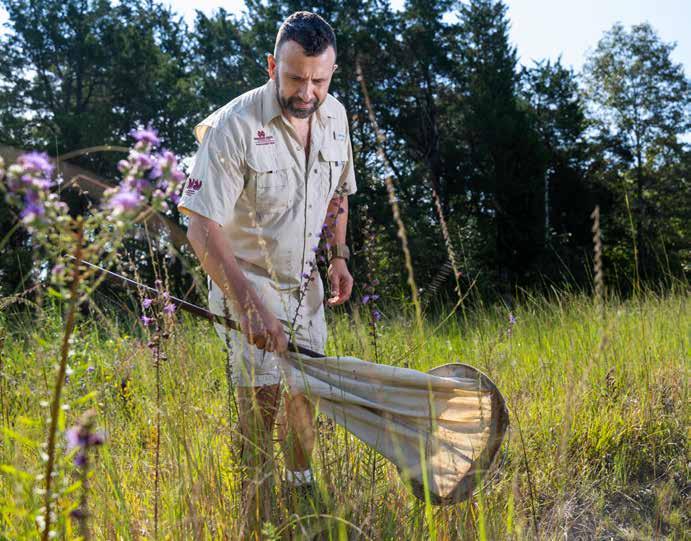



SKETCHING SCIENCE
MSU scientific illustrator combines science, art
By Mary Pollitz, Photos by Beth Wynn
By the time Joe MacGown sold his first piece of art at age 11, he already had logged several years investigating insects under a microscope. Even at that age, blending science with his creativity came naturally.
“I’ve been looking through a microscope since I was 5,” he said. “I’ve always thought drawing them was the best way to learn about organisms. I think it’s so cool how everything is connected.”
That belief has guided MacGown through a decades-long career at the Mississippi Entomological Museum on Mississippi State’s campus, where he has worked for 37 years as a scientific illustrator and research technician. His legacy is a continuation of family tradition—his father earned a doctoral degree at MSU and spent years researching and teaching in the same museum, and his son recently graduated from MSU and works with the museum’s gardens and murals.
MacGown says he basically grew up in the museum halls of Clay Lyle. As early as 1976, he remembers drawing freelance illustrations for MSU graduate students.
“I wasn’t officially working back then, but I was in the lab,” he said. “I did drawings for people’s presentations and research projects. Even though I wasn’t being paid by the university, I was still here.”
After graduating from Starkville High School, MacGown moved to Tennessee to study at Memphis College of Art. After a year, he returned for family reasons. What began as a temporary illustration job with the entomological museum turned into a permanent position and a career of illustrations and scientific research papers.
“I love learning, and I wanted to learn something new every day,” he said. “This was a great place to do it.”
Over the years, he has illustrated thousands of insect specimens and contributed to hundreds of websites, presentations, news articles and scientific papers, many of which he also wrote. He officially retired in 2020, but was back in the lab within a year.
“I’m what you call a retiree rehire,” he laughed. “I came back because I had so many unfinished projects and I
just want to share everything I have and know with others.”
For MacGown, accurate and accessible visuals are crucial in scientific research. Mississippi Entomological Museum Director JoVonn Hill said MacGown’s work adds a dimension that photographs often can’t capture.
“Joe is, by far, the best scientific illustrator I’ve ever seen,” Hill said. “He’s completely self-taught. A photo can mislead someone into thinking a species must look exactly like that one example, but Joe’s drawings show the species more clearly.”
Though he was born in Maine, MacGown spent most of his life in Starkville. His work has taken him across the country, studying environments, documenting species and connecting with the world through science.
“Writing these papers, traveling around and doing illustrations has connected me to the entire world,” he said. “I love the inter-connectivity we have because science is available to everyone and we’re able to disseminate this information to people all over from this lab.”
MacGown said he didn’t plan this path. He didn’t want to live in Starkville, but somewhere along the way, he started to view everything from a different perspective.
“Once you start learning about what’s around you, it almost doesn’t matter where you live as long as you’re safe,” he said. “Everywhere can be interesting, and that’s the case here. I became so invested here, built a home and life.”
On paper, MacGown said his career might seem like happenstance. That wasn’t the case. He says he took every opportunity as a new way to grow, learn and educate others.
“It wasn’t luck. Luck allowed me to be born at this time, with arms, legs and a capable mind,” he said. “I just loved learning and never stopped. There’s no rule that says you can’t do more than what’s expected of you. You always can.” n
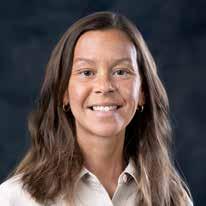
Mississippi State’s Liza Bondurant, an associate professor of secondary mathematics education, is among 46 nationwide recipients of Mathematical Association of America Outreach grants helping fund math outreach efforts across the U.S. and its territories this year.

Daniel Carruth, associate director at MSU’s Center for Advanced Vehicular Systems, or CAVS, has been named to the executive committee of the University of Michigan’s Automotive Research Center. As a committee member, Carruth will serve as the school liaison and strengthen institutional collaborations across ARC, a longstanding research partner for MSU on projects related to off-road autonomous vehicles. Carruth is nationally recognized for his expertise in modeling, simulation and off-road autonomy.

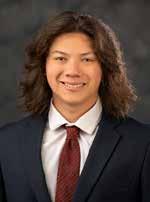

Three Mississippi State seniors were among this year’s recipients of the National Science Foundation’s prestigious Graduate Research Fellowship. The fellowship recognizes outstanding graduate students who have demonstrated the potential to be high-achieving scientists and engineers. It provides three years of scholarship support and an annual stipend of $37,000. The honorees include Alyssa Williams, a senior in biochemistry and psychology from Franklin, Tennessee; Chandler Woo, a senior chemistry major from Hendersonville, Tennessee; and Owen Smith, a senior industrial engineering major from Ocean Springs.
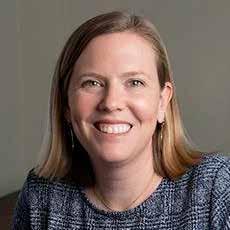
Associate Professor Amy Dapper is the university’s first recipient of the prestigious Presidential Early Career Award for Scientists and Engineers, or PECASE, the highest U.S. government award for early-career scientists and engineers. The PECASE, established by President Clinton in 1996, honors individuals who show exceptional promise in leadership and research.
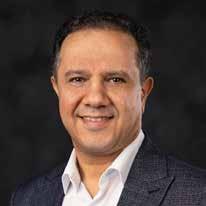
Associate Professor Saeed Rokooei is the university’s latest recipient of the prestigious Fulbright Specialist Program award. He traveled to Uzbekistan for six weeks, immersing himself in various educational and research activities including teaching, workshops, curriculum development, research collaboration and cultural presentations. He completed an urban planning project at Fergana Polytechnic Institute as part of the program that fosters exchanging knowledge and establishing partnerships between institutions and communities both in the U.S. and overseas.
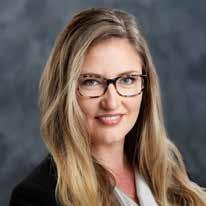
Hannah Thach has been named executive director of the Mississippi State University-led Alliance for System Safety of UAS through Research Excellence, or ASSURE, following the recent retirement of Ret. Col. Stephen “Lux” Luxion. Established as the Federal Aviation Administration’s Center of Excellence for Uncrewed Aircraft Systems research in 2015, ASSURE continues to lead advancements in UAS safety and integration into the national airspace.
Mississippi State University is in Money’s list of the 2025 Best Colleges in America. MSU is one of 732 four-year U.S. public and private nonprofit institutions making this year’s list after the national financial news outlet analyzed a pool of 2,400 schools.
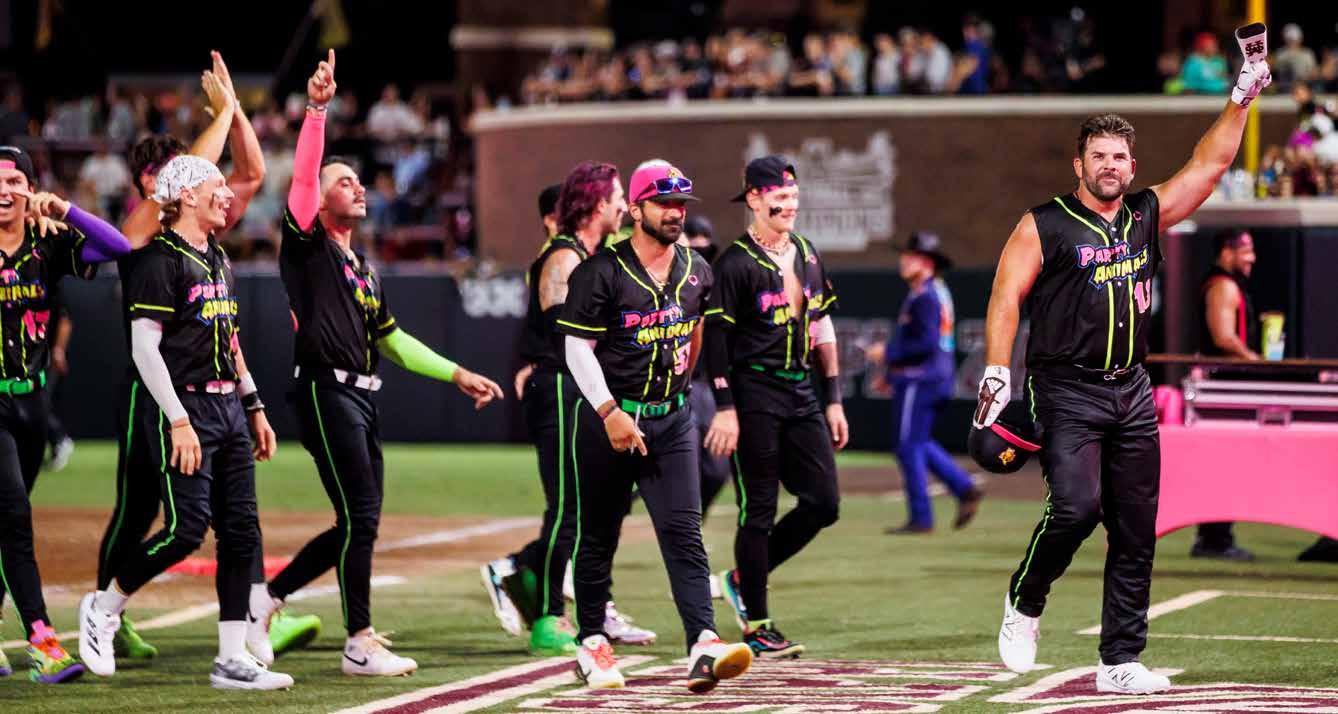
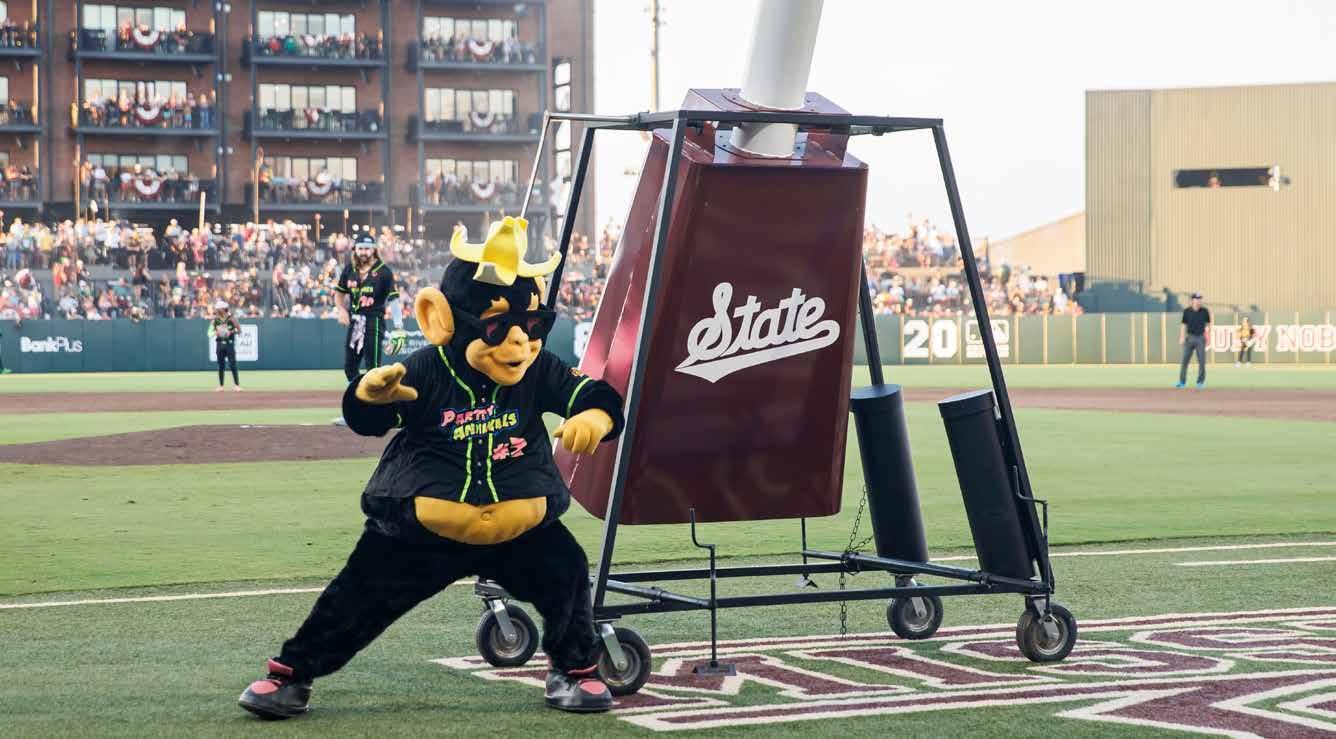



PARTY AT THE DUDE
In August, Dudy Noble Field played host to Banana Ball—a high energy, fast-paced, entertainmentfocused version of America’s favorite pastime. Headliners the Party Animals faced the Texas Tailgaters during the two night, sold out event. Left, top to bottom: Known for on-field, choreographed danced numbers and trick plays, the Party Animals welcome former Bulldog standout Mitch Moreland—a 2018 All-Star and World Series Champion—as a pinch hitter; Pharty, the Party Animals’ mascot, rings a giant cowbell with flair; legendary Bulldog Skipper Ron Polk guest coaches the Animals for one inning. Left: Famed Diamond Dawg hurler Jonathan Papelbon, who owns six All-Star titles and a World Series championship, returned to the Dudy Noble mound to face a Tailgater batter. Photos by MSU Athletics
‘I KNEW IT WAS THE RIGHT OPPORTUNITY’
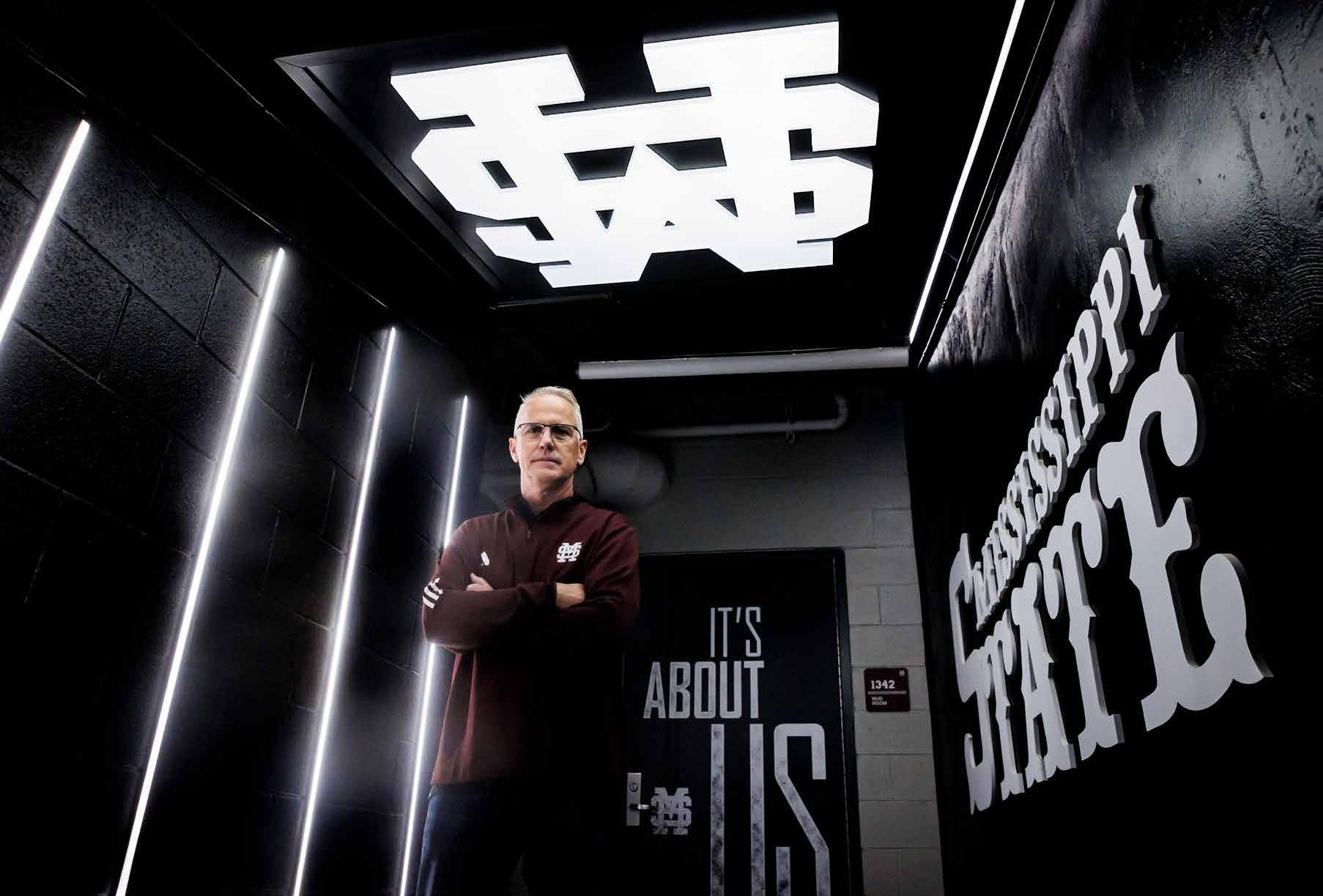
MSU WELCOMES O’CONNOR TO MAROON AND WHITE FAMILY
By David Murray, Photos by MSU Athletics
Mississippi State owns a national championship trophy. So does Brian O’Connor. Now, the parties have teamed up with plans to win another—together.
“I’m honored to be the new baseball coach at Mississippi State, and lead the program into the future,” O’Connor said as he was welcomed by thousands to Polk-Dement Stadium as the next and 19th leader of Bulldog baseball.
“We have very high expectations here,” MSU President Mark E. Keenum said during the June event. “This stadium is the finest in the nation and is built for us to host postseason play. We expect to compete for the SEC Championship, to host regionals and super regionals. And, yes, we expect to make our annual journey to Omaha.”

Count O’Connor in, and not least because Omaha is his old home ground.
“I love making something better than when you got there," he said. “Those things drive me. I’m excited about putting our footprint on the huge tradition here and making it the best we can make it during our time here. Maybe, making it better.”
O’Connor has already made one situation the best it ever was and may be. In 22 seasons at Virginia his teams won 917 games with a 70% success rate, which ranks O’Connor thirdbest among active skippers. All seven Cavalier appearances in the College World Series have been under his management. So are the nine NCAA Regional titles out of 18 berths.
Now the American Baseball Coaches Association Hall of Fame member and threetime college coach of the year has come to
Starkville to play for more championships, and do it in the sport’s grandest venue.
“There have been a lot of schools over the years that have reached out about their jobs,” O’Connor said. “But make no mistake about it, this was the right path in my career.”
A different path to the same goals, and bigger too.
As Zac Selmon, director of athletics, said, “We set the standard in college baseball. Now we’re going to elevate the standard.”
A Proven Winner
Minutes before announcing the news on the same Sunday evening the 2025 team’s season ended, Mississippi State teased Bulldog faithful with a social-media image of a Left Field Lounge grill issuing maroon smoke. The sentiment, which echoed the smoke

Coach Brian

a Bulldog
thousands of fans in attendance, the three-time national coach of the year was introduced as the 19th leader of MSU baseball, marking the beginning of a new chapter built on tradition, high expectations and the pursuit of championships.
signals used during the election of a new pope, was fitting. The church of Bulldog baseball has a seasoned shepherd.
O’Connor is the first sitting head coach hired by Bulldog baseball, unless one counts the second tenure of Ron Polk. O’Connor is entirely alone in MSU history as the first with a National Championship already on the resume, having led the Cavaliers to a College World Series title in 2015.
When Selmon and Keenum made a coaching change in late April, O’Connor’s name quickly percolated to the top. Even for a Mississippi Statelevel program, the college baseball world could not truly believe a big winner in a program he’d built could be moved.
The sales pitch was simple.
“There was a lot to talk about but we really focused on two things,” Selmon said. “Relentless effort to win championships, and the right
competitor to embrace the living, breathing monster program we have here. During our conversations it was crystal clear we had the same visions for the program.”
That vision: Not just maintaining a historic program, but pushing it to new heights. It’s a challenge he said excites him.
“That leads to why I coach. I love building young men and impacting their lives," O’Connor said. "I love making difficult decisions. I don’t shy away from them. It’s not an ego thing. If you’re a leader you can’t be afraid to make difficult decisions.”
A Considered Decision
Despite the appeal of the MSU job, O’Connor didn’t jump in with a “yes.” Leaving a home and a team you’ve built over 22 years isn’t a decision to take lightly. He asked for a day to consider—not
“This is amazing. The mecca of college baseball, right here in Starkville. The best environment for college baseball in America.”
~ Brian O’Connor
Mississippi State Director of Athletics Zac Selmon presents new Head
O’Connor with
jersey during the welcome event at Dudy Noble Field. With

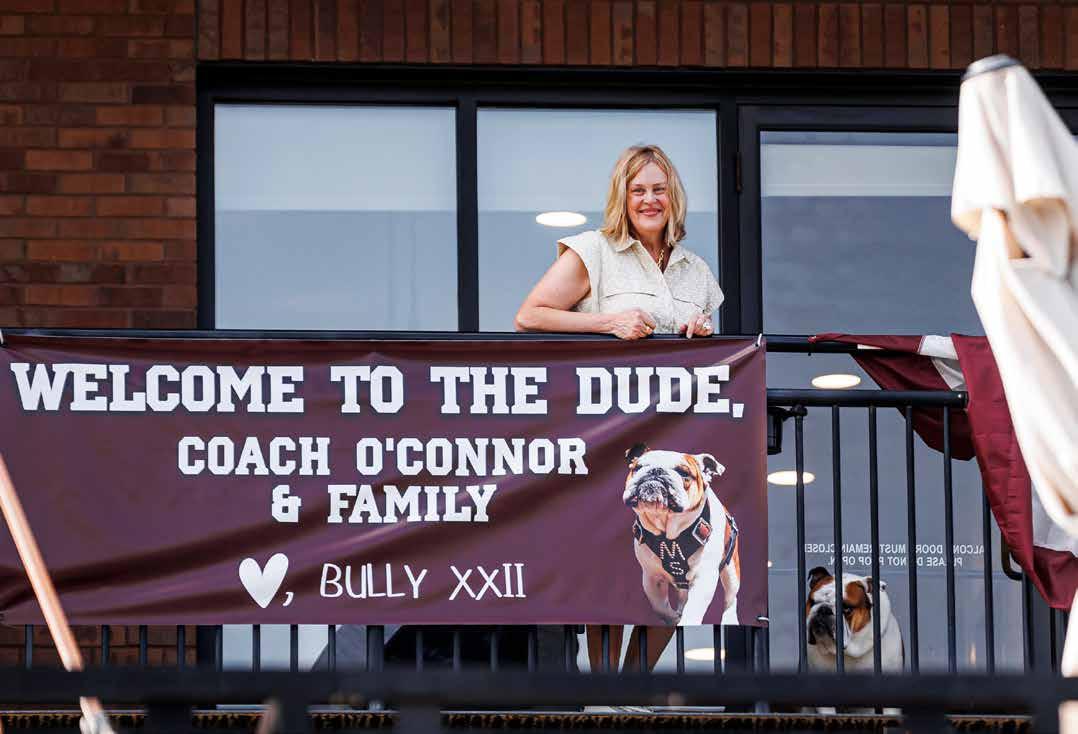


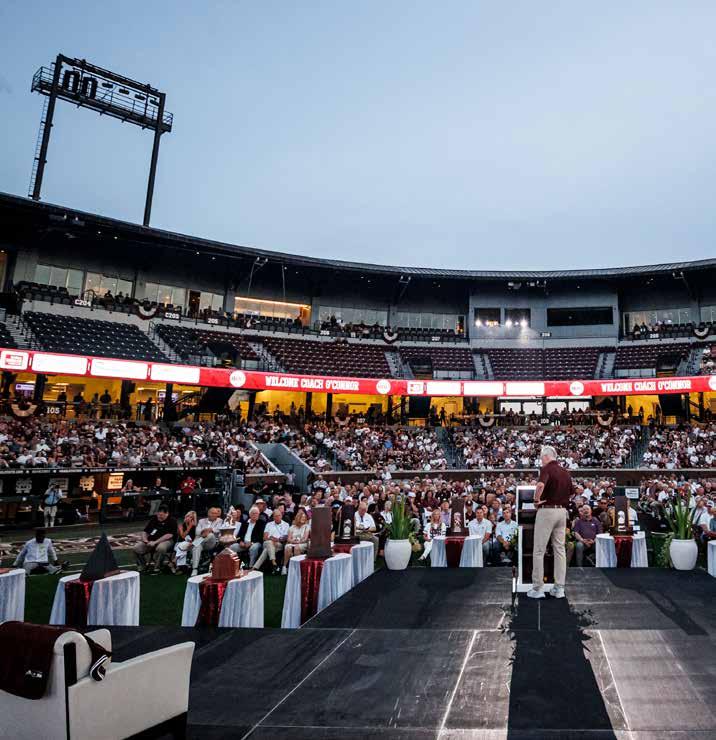
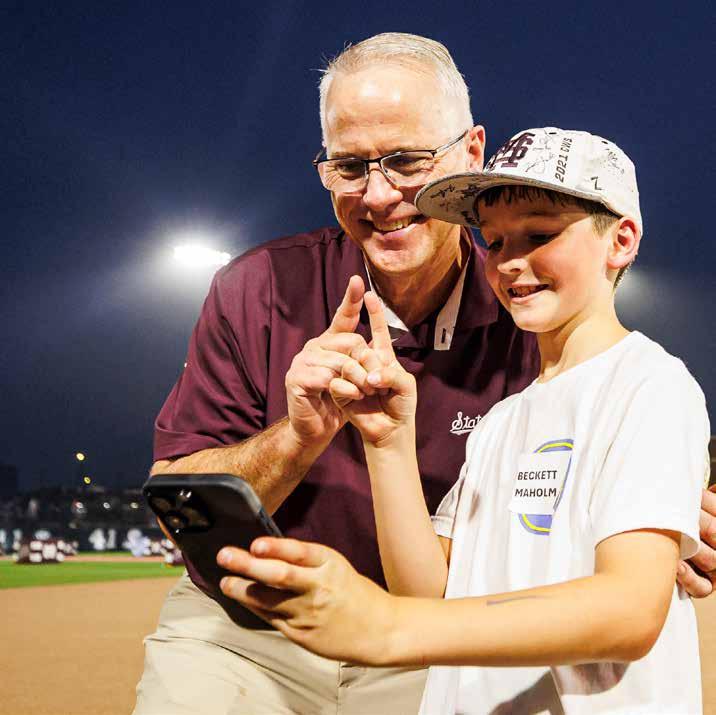


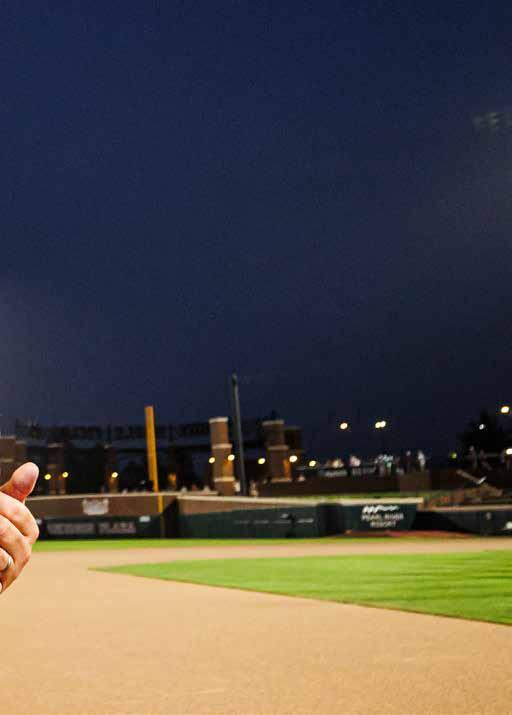
to get a sweeter deal, but to get input from his wife Cindy and son Dillon.
“I’m a little bit of a softie sometimes," O’Connor admitted. "So, I sat on the couch and I held their hands, and asked one last time, ‘Are you all on board?’ They looked at me and smiled saying ‘Yes, we are.’
“I knew it was the right opportunity, and then I called Zac back and told him that I wanted to be the next baseball coach here.”
With that decision, O’Connor became just the fifth coach with a College World Series title on his resume to move to another college job.
But Mississippi State is not just another college baseball job, something O’Connor knew already from scattered contact with Bulldog baseball. In fact, he had been to Dudy Noble Field before—in his role as Notre Dame pitching coach when the Irish and the 2000 Bulldogs battled into an extra inning of the Starkville Regional rubber game. It was O’Connor’s staff that gave up the 10th-inning solo shot by Ty Martin to walk-off the title.
“That was the last time I had been to Starkville,” O’Connor said.
His other interactions with the Maroon and White were also high-pressure situations. The 2013 Cavaliers, which had the core of the national title team two years later, hosted MSU in the Charlottesville super regional. Those Bulldogs took the series in two, en route to a national runner-up finish.
Then, in 2021, the Bulldogs handed the Cavaliers their first loss in that year’s College World Series with a 6-5, second-round game. The Dawgs, of course, left Omaha with the hardware.
Three Junes later, O’Connor had the 2024 Dogs on Virginia’s campus for a regional. The Cavaliers returned the favor with a pair of wins, and kept going on to Omaha once again. Given the number of Bulldog fans who went to Charlottesville, O’Connor knows the fanatical following he now intends to please.
A Beast to Tame
“This is amazing," O’Connor said of Starkville’s baseball atmosphere. "The mecca of college baseball, right here in Starkville. The best environment for college baseball in America.”
It is also a living, breathing and everhungry monster. Then again, Mississippi State
shares the SEC stage with many monsters. So O’Connor has to feed one beast and beat back a bunch more.
“It’s not for the faint of heart. It’s for the elite who want to play on the biggest stage,” Selmon said. “We wanted somebody to participate and chase championships at the highest level.”
To this end, Mississippi State is increasing investment. O’Connor is getting a handsome paycheck, second-largest in the SEC per reports, with lots of incentives built in. At the same time, his coaching assistants are getting greater funding, as well as off-field staffing.
“Obviously, the support is here,” O’Connor said. “This stadium, this fan base, everything that goes on with that to attract and retain the right talent to give your program a chance to win championships.”
Above and beyond, the coach noted, is the cultural investment in baseball which makes Mississippi State unique.
“When I walked out of this place and I knew what it was about," O’Connor said. "Twenty-five years later, it’s grown.”
Yet there is room remaining for even greater growth.
“That’s why Zac Selmon and I have committed to make sure this program and these young men and staff have the resources they need to compete at the highest level and meet our expectations,” Keenum said. “That’s why we decided to bring the best coach in the nation to Starkville to lead our team, and we’ve done that in Coach O’Connor.”
O’Connor set the tone at first talk. He will field a tough-minded team that plays with aggression.
“But we will play the game the right way, with class all the time," he said. "We won’t back down from anybody, but it will be played in a classy way that will represent this community the right way.”
There is one right way Mississippi State wants itself represented: winning championships, holding up trophies, and dog-piling while ribbons rain. Bulldog baseball has one championship trophy to prove it, and so does Brian O’Connor.
Now it is time to go get the next one. A challenge?
“My response is, bring it on,” O’Connor said. “Bring it on. That will be the attitude of the players as well. We need to go to work.” n

One Hall of Fame Bulldog Coach welcomes another to Polk-Dement Stadium
By David Murray

Bulldog baseball’s history was already well-represented in the American Baseball Coaches Association Hall of Fame. C.R.‘Dudy’ Noble was inducted in 1967, Paul Gregory in 1977, and Ron Polk in 1995.
Now, Mississippi State claims a fourth in Brian O’Connor, inducted just a year ago by peers. It was fitting Polk himself introduced the newest skipper to a cheering home crowd.
“Legend!” O’Connor said of Polk. “This man set the standard of this program. He built what is here today. So I can’t wait to sit down many, many times and learn and appreciate what you have done for this community.”
How much O’Connor has left to learn about college baseball is

speculative.What remains for him to learn? How this campus and community became a wellspring for the sport.
“Yes,” O’Connor said, “I will visit the museum,” meaning Polk’s homebased shrine.
Given how long each man has been in the game, it is surprising Polk and O’Connor never occupied opposing dugouts. And the Dawgs’ new coach is a rare exception in coaching circles as he does not have a “Polk Story” of his own to share.
But yes, even a young O’Connor knew who No. 1 was.
“I grew up in Council Bluffs, Iowa, right across the Missouri River from old Rosenblatt Stadium in Omaha,"
O’Connor recalled. "Mom and dad would take me and my two brothers every year, multiple times, to College World Series games. I’ve got game programs from when Coach Polk coached, with the player autographs in them, so this dates back a long time ago.”
O’Connor has other “autographs” by Polk. Once an established member of this field fraternity, he would receive the famed handwritten letters from the Godfather of SEC Baseball. Now, he can smell the cigar smoke for himself at PolkDement Stadium.
“I just always admired him as a coach and his ability. I’m just excited to spend some quality time with him." n
THE ROaRING ’20S
MSU USHERS IN A NEW ERA OF LEARNING OPPORTUNITIES
By Carl Smith, Photos by Grace Cockrell
The growth, prosperity and energy of the original Roaring ’20s are back at Mississippi State as the Magnolia State’s leading land-grant institution ushers in a new era of learning.
From researching, implementing and teaching students to use advanced technologies to initiating innovative healthcare programs, MSU is taking care of what matters by producing graduates who will solve the issues of tomorrow through knowledge gained today with the university’s new, innovative academic offerings.
“Our goal is to deliver instruction that not only teaches skills but also makes our students view the world differently, with a sense of curiosity they might not have had before. If we can inspire curiosity and develop their critical thinking, those skills will pay off for a lifetime.”
~ David Shaw

Since 2020, the university has created more than 50 new degree, certificate and other academic programs, founded two new colleges and transformed MSU-Meridian into a vital hub for healthcare education in the Southeast. In comparison, the university created 34 new programs in the 2010s. Other than a reorganization that formally established the College of Architecture, Art and Design in 2004, the last all-new college launched at MSU prior to 2020 was the College of Veterinary Medicine, created by the Legislature in 1974.
All of these new additions reflect MSU’s commitment to transforming education and meeting the wants and needs of today’s students so they’re prepared to make the world a better place for all.
“What we’re doing here at Mississippi State is being intentional and strategic, especially when looking at the rate of change we’re seeing today in society and the economy in general— not just locally and nationally, but from a global perspective,” said Provost and Executive Vice President David Shaw.
“President Keenum articulates this so well," he continued. “‘We need to be preparing students for jobs that do not exist today—the ones we haven’t even imagined yet.’”
Shaw explained that not only is MSU focusing on training students in specific fields but it's also teaching the critical-thinking skills that will make Bulldog graduates successful for years to come, no matter where they go or what they do.
“Our goal is to deliver instruction that not only teaches skills but also makes our students view the world differently, with a sense of curiosity they might not have had before,” he said. “If we can inspire curiosity and develop their critical thinking, those skills will pay off for a lifetime.”
‘FACILITATION, INTEGRATION, INCUBATION’
When Dean Jamie Dyer, talks about university collaboration and his vision for the College of Integrative Studies, he describes creating a web of interconnected, crossdisciplinary curricula and resources.
“The three words I use for the college are facilitation, integration and incubation,” he explained. “Our data science program is truly interdisciplinary, and the students are happy because they get a degree more workforce
oriented and personalized to their interests."
Approved earlier this year by the state’s Institutions of Higher Learning board, the College of Integrative Studies is the newest academic college at the university and home to two new degree programs—the Bachelor of Science in data science and Master of Applied Data Science—as well as a certification program for data science pedagogy designed for K-12 and college educators.
Students enrolled in the undergraduate program—the first of its kind in the Southeast—take general education classes to develop critical-thinking, writing and other skills. Those foundational courses are followed by the program core, which includes computer science, statistics, mathematics, business information and communication. Finally, students transition into applications of data science fundamentals in one of 10 concentrations spanning seven of the university’s other colleges.
When visualizing how students can progress through lower- and upper-level classes of their choosing across campus disciplines, the web comes into focus with the College of Integrative Studies as its hub.
“The student is the customer, and we have to work together to ensure they’re prepared
for life after college,” Dyer said. “They don’t want to be told, ‘Take these last three classes, and you’ll graduate.’ They want to hear, ‘The job market requires these skills, and these classes will develop those skills. Pick the ones that apply to what you want to do after you graduate.’
“We’re allowing them an educational pathway that makes their degree track unique,” he continued. "It’s almost like they’re building their own discipline.”
Dyer, who is more of a facilitator than a traditional administrator, comes from a diverse academic background, including physics, hydrology and meteorology. A professor in the Department of Geosciences and associate director of the Northern Gulf Institute, a National Oceanic and Atmospheric Administration Cooperative Institute managed by MSU, his research touches a wide range of topics. He also leads the university’s Gulf Scholars Program, another avenue for students enrolled in science-focused majors to gain a cross-disciplinary education tailored to their interests.
The program, which is entering its third year of funding through the National Academies of Sciences, Engineering and Medicine, highlights how the college is
charged with incubating programs Dyer says “simply couldn’t exist under one roof” while providing these diverse learning opportunities. MSU will soon offer a minor through the program.
“We’re making change agents for the whole Gulf Coast from Texas to Florida,” Dyer said. “We’ll take students studying anything from wildlife, fisheries and aquaculture to geosciences, look at their major’s requirements and develop courses that can be integrated into their current track.
“None of those classes deal specifically with science, and that’s the point. We want to create well-rounded, well-informed graduates,” he added.
To continue growing this web of connections to the College of Integrative Studies, Dyer links up with industry representatives to keep tabs on job demands. He also maintains communication with MSU’s various academic departments and monitors new class reports from the University Committee on Courses and Curricula. With an eye on the future, he said he hopes the college can develop programs that fill needs and meet opportunities in the state, including tourism, event management and economic development.
“One of the things Dr. Keenum always talks about is our land-grant mission of being here to serve the people. Simply put: We’re the people’s university, and we’re responding to the emerging needs of the state, region and nation—the shortage of healthcare providers—in a very real way.”
~ David Buys
“It’s fun; it’s challenging; it’s the future,” Dyer said of the college’s work.
“We now have a pathway for these universitywide initiatives to be developed,” he continued. “Students see value in these collaborative programs, and seeing them graduate and move into meaningful careers is what makes me feel successful at the end of the day.”
MAROON AND ALL RIGHT
Each year at MSU-Meridian, Bulldogs graduate with the life-changing—even lifesaving—skills needed to take care of what really matters: people.
To address the current and future shortages of healthcare providers in the Magnolia State and beyond, the university has introduced a plethora of innovative, first-of-their-kind degree programs and learning opportunities in the first half of the 2020s. These efforts further solidify the university’s Meridian campus as a leader in healthcare education.
The Meridian campus’ School of Nursing, School of Health Professions and Division of Education house these opportunities, which have benefited from immense university,

community and state support. Among the resources benefitting MSU Meridian’s growing catalogue of academic programs are innovative technologies, like a cutting-edge simulation lab where students can practice hands-on learning; supportive community partnerships with local philanthropic groups including the Riley, Phil Hardin and Paul and Sherry Broadhead foundations; and a local base of established healthcare systems, featuring Ochsner Rush Health and Baptist Anderson Regional Medical Center-South.
By providing not only healthcare education but also a space to hone their skills, MSU-Meridian is helping address a need affecting all of Mississippi’s 82 counties, most of which are federally designated as Health Professional Shortage Areas. This means most of the state’s population lives in areas without enough primary care, dental or mental service providers.
“One of the things Dr. Keenum always talks about is our land-grant mission of being here to serve the people. Simply put: We’re the people’s university, and we’re responding
to the emerging needs of the state, region and nation—the shortage of healthcare providers—in a very real way,” said David Buys, MSU-Meridian associate vice provost of Health Sciences and interim head of campus. “We’re always looking for ways to help improve the state’s standing and make the population healthier by adding programs that fill the gaps in education.”
Filling these gaps takes a coordinated effort, and the healthcare programs established this decade at MSU-Meridian focus on patients’ complete care.
In 2021, the university founded the Magnolia State’s first physician assistant program at a state institution. This pathway prepares graduates to evaluate, diagnose and treat patients under the guidance of a general practitioner without the need for a Doctor of Medicine degree.
Each January, approximately 30 students begin a 29-month program divided into classroom studies and multiple clinical rotations at sites dedicated to internal medicine, family medicine, women’s health,
pediatrics, behavioral health, emergency medicine, general surgery and other specialties.
Growing more competitive in terms of applicants, the Master of Physician Assistant Studies program seated its fifth cohort this year—a group of 32 students representing states from California to Florida. Since 2023, the program has graduated more than 60 needed healthcare practitioners.
The Master of Science in nursing’s inaugural class of 34 graduates received their degrees this summer after the program—the first one in the state to offer an accelerated, direct-entry pathway into the field—began last year. The 12-month, patient-centered program provides those holding non-nursing degrees a fast track to national licensure through NCLEX exams as registered nurses. Nationally accredited by the Commission on Collegiate Nursing Education, the program is expected to expand to approximately 60 students in the future.
Also in the near future, MSU-Meridian will begin addressing another crucial patient need: physical therapy. Receiving State

“The three words I use for the college are facilitation, integration and incubation. Our data science program is truly interdisciplinary, and the students are happy because they get a degree more workforce oriented and personalized to their interests.”
~ Jamie Dyer
“We have to be studentready instead of making sure students are college-ready, and that requires us to truly understand their needs. Since learning is a lifelong process, meeting these students requires multiple pathways so they can come in where they are at that stage of their life.”
~ Susan Seal
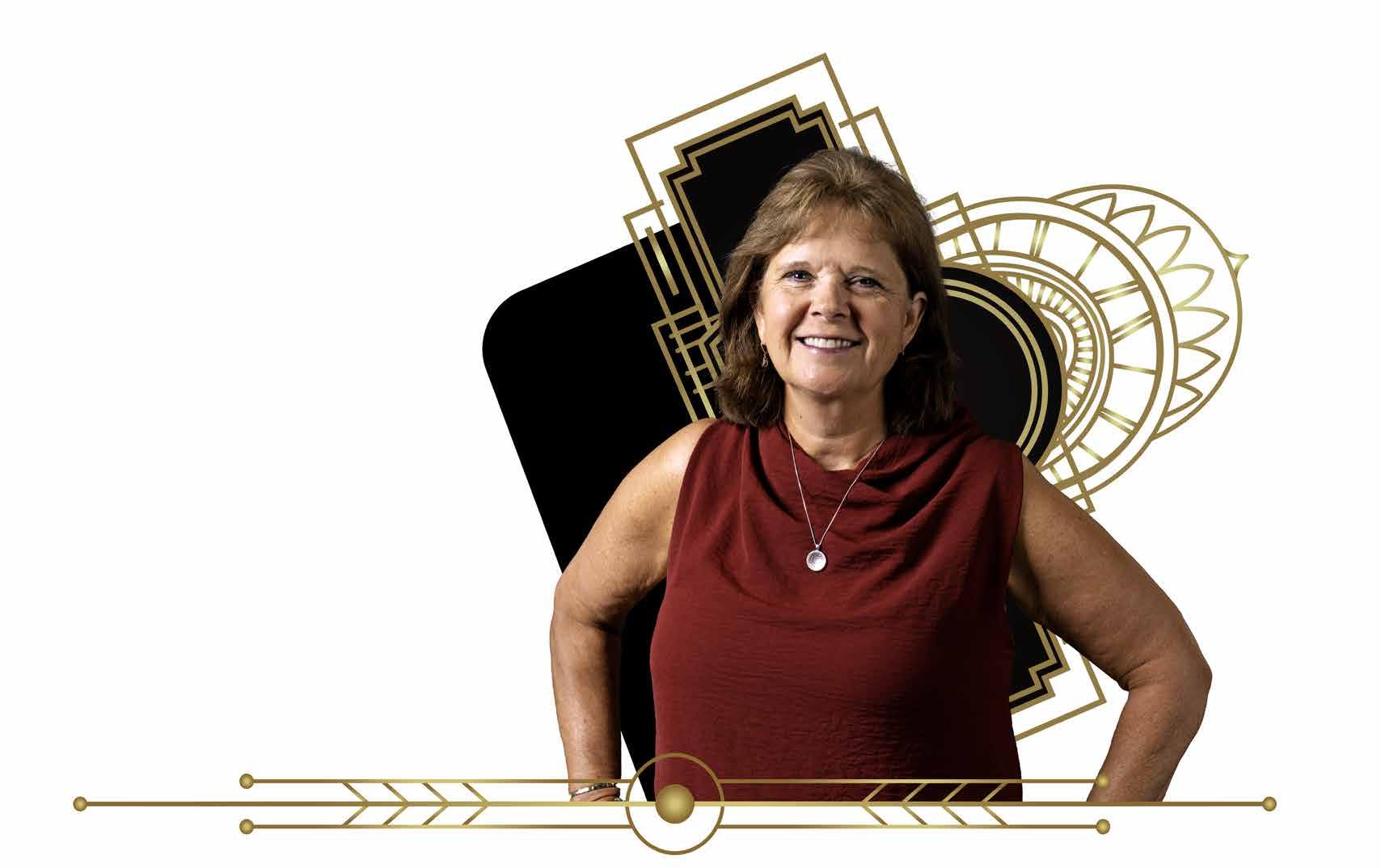
College Board approval in June, this 120hour, hybrid program is expected to enroll approximately 250 students in its first five years. The university is in the planning-anddevelopment phase, and implementation and national accreditation are projected in approximately five years.
As a forthcoming School of Health Professions offering, the Doctor of Physical Therapy program will follow a hybrid delivery model, with coursework offered in online formats and on-campus and in-person learning settings, including time spent in labs and clinical environments.
Moving to address mental-health needs, the board approved MSU-Meridian’s first doctoral program—the Doctor of Psychology in combined health service psychology—in 2023, joining it with existing master’s and education specialist programs in the Division of Education.
The 91-hour program includes three concentration options—clinical, counseling or school psychology—and students can earn a master’s in health services psychology or
school counseling, or an Education Specialist degree in school psychology while completing the doctoral program. Graduates are eligible for licensure as psychologists in Mississippi and can specialize in a variety of areas including marriage and family, substance abuse, trauma, and child and adolescent therapy.
Even the business side of the industry is covered through the School of Health Profession’s healthcare administration program. Its Bachelor of Science in healthcare administration, established in 2023 and offered both in-person and online, prepares graduates to handle organizational leadership roles anywhere from small practices to larger facilities and systems. A similar Bachelor of Applied Science debuted one year later. Tailored to transfer students holding an associate degree in a healthcare-related field, it allows them to transfer and apply technical credits toward their new degree.
Tying all of these and other established mental- and physical-health and socialwelfare programs together is the MSU-
Meridian Interprofessional Simulation Center, a cutting-edge training facility where students take classroom lessons and apply them in real-world scenarios.
The interdisciplinary laboratory is housed in an almost-8,000-square-foot facility located in the Riley Campus’ I.A. Rosenbaum Health Sciences Building. It features practice exam rooms for clinical and surgical scenarios, observation areas, and pre- and debriefing rooms with recording and reviewing capabilities.
First open to PA and nursing students, the simulation program now integrates learners from a wide array of healthcare-related degree programs and concentrations at MSUMeridian, including those studying social work, mental-health counseling and applied behavior analysis.
“It’s amazing—just like you see in the real world, in a hospital or clinic setting, there are far more than just one discipline engaged to care for patients," Buys said. "For example, in a recent scenario, our PA students worked on the diagnostic piece, the nurses worked
on the care piece and our social workers handled the aspects of what would happen to these patients when they go home.
“The more experiential, hands-on learning opportunities we can provide, the more our students can say, ‘I’ve done this,’" he continued. “Not only does that help them get hired, but it makes them better caregivers from the start of their careers. Everything we’re doing in Meridian illustrates our commitment to supporting Mississippians now and in the future.”
LIFELONG LEARNING, LIFELONG SUPPORT
Susan Seal isn’t an expert on hockey, but when it comes to education, she said she follows one of the sport’s guiding principles. To be effective on the ice, players must skate to where the puck is going, not where it is at the moment.
“We’re focused on meeting students where they are. The way we see it, anyone can be a student at any point of their lives,” she said. “Maybe you’re in high school and receiving dual credits that’ll be ready to use when you come to the university for the first time; maybe you’re a 40-year-old going through a career change, so you need to upskill through an online certificate program; or maybe you’re 60 and interested in some of our enrichment opportunities. No matter where you are on your educational journey, there’s a place for you at Mississippi State.”
Seal is leader of the MSU College of Professional and Continuing Studies, a central example of the university’s commitment to serve nontraditional students. From professionals seeking new career advancements to learners who engage better through self-guided, virtual instruction, the college’s blend of services offered by the university’s Center for Distance Education and Center for Continuing Education are for anybody who wants to learn.
Since its founding in 2023, CPCS offerings have grown to include bachelor’s of applied science degrees with majors in applied science, public management and business office technology, and noncredit credential programs for
those looking to add new skills to their resumes. Leadership is also a college focus, with opportunities including the noncredit Promoting Innovation, Leadership, Learning, Advancement and Resilience Institute, a bachelor’s degree in organizational leadership, a 12-credit hour graduate certificate of applied leadership and a master’s in applied organizational leadership.
“What we’re doing here at Mississippi State is being intentional and strategic, especially when looking at the rate of change we’re seeing today in society and the economy in general—not just locally and nationally, but from a global perspective.”
~ David Shaw
As CPCS dean, Seal is tasked with positioning MSU to offer tailor-made learning experiences that meet students on their own schedules, terms and needs across the entire university, all while the college offers its own degrees and programs.
To do this, Seal and MSU are turning an old adage on its head.
“We have to be student-ready instead of making sure students are college-ready, and that requires us to truly understand their needs,” she said. “Since learning is a lifelong process, meeting these students requires multiple pathways so they can come in where they are at that stage of their life. Many of them are working or have families—different responsibilities than your traditional college freshmen. We have to offer them the support they need to be successful now and into the future.”
With this in mind, CPCS staff maintain connections with students— prospective, current and alumni—industry partners and community groups to
continually monitor how MSU can better serve its stakeholders, gaining input on developing trends in employment and education to plan for future opportunities. Specialists also work to better understand new pedagogy, including how to better supplement instruction with emerging technology like artificial intelligence and virtual reality.
Leveraging these tools will better connect students to subject matter through immersive learning opportunities, thereby increasing their opportunities to succeed in the virtual or traditional classroom, Seal said.
“Students can’t feel like they’re stepping back 10 years when they take a university-level course," Seal said. "These efforts are all about meeting students where they are. We talk all the time about how we’re training students for jobs that don’t exist yet but we’re also focused on teaching them transferable skills they can build on, regardless of how the future goes.”
As MSU lays the foundation for what the education of tomorrow looks like through the expansion of opportunities and offerings seen during the 2020s, Seal said it’s growing a culture of innovation and collaboration that will ensure success throughout the rest of the century and beyond.
“At MSU, we really do care about students and their lifelong success, and it takes collaboration to make them successful," Seal said. "We have many resources and areas of expertise that we can bring together for the benefit of our students, whether they are seeking an academic degree or engaged in a continuing education program.
“When our university operates as a unified community, our collective expertise and shared commitment elevates our impact far beyond what any individual could achieve alone,” she continued. “I’m excited by how our leadership has embraced these ideas of collaboration and innovation to help meet student needs, and we’re truly seeing so many transformational changes now that will shape the future.” n
MISSISSIPPI STATE GIVES NEW MEANING TO ‘ROARING ‘20S’
Mississippi State kicked off the 2020s with a roar, reaching the midpoint of the decade making historic strides on all fronts. From new construction and record enrollment to economic impact and landmark partnerships, great things are happening in the Bulldog family. And with more than 50 new academic offerings, combined with our existing, world-renowned programs, the university has something to support all career goals—including the study of cutting-edge fields in which we are leading the way.
NEW DEGREE PROGRAMS INCLUDE:
Bachelor of Applied Science in Business Office Technology
Bachelor of Applied Science in Cybersecurity
Bachelor of Applied Science in Healthcare Administration
Bachelor of Applied Science in Organizational Leadership
Bachelor of Applied Science in Public Management
Bachelor of Applied Science in Weather and Environmental Science
Bachelor of Arts in Integrated Design and Built Environment
Bachelor of Business Administration in Entrepreneurship
Bachelor of Business Administration in Supply Chain Logistics
Bachelor of Music in Performance
Bachelor of Science in Applied Behavior Analysis
Bachelor of Science in Applied Sociology
Bachelor of Science in Artificial Intelligence
Bachelor of Science in Data Science
Bachelor of Science in Educational Psychology
Bachelor of Science in Healthcare Administration
Bachelor of Science in Learning and User Experience Design
Doctor of Education in Educational Policy and Organizational Design
Doctor of Philosophy in Higher Education Leadership
Doctor of Psychology in Combined Health Service Psychology
Education Specialist in Professional School Counseling
Education Specialist in School Psychology
Master of Applied Science in Organizational Leadership
Master of Agriculture in Animal and Dairy Sciences
Master of Agriculture in Agricultural and Extension Education
Master of Agriculture in Entomology
Master of Agriculture in Plant Pathology
Master of Agriculture in Poultry Science
Master of Applied Data Science
Master of Arts in Communication
Master of Arts in Teaching-Elementary Level Alternate Route
Master of Fine Arts in Historic Preservation
Master of Public Health
Master of Science in Architecture
Master of Science in Artificial Intelligence
Master of Science in Conservation Education
Master of Science in Construction Management
Master of Science in Data Science
Master of Science in Early Intervention
Master of Science in Fashion Design and Merchandising
Master of Science in Nursing
Master of Physician Assistant Studies
Master of Science in PK-12 Student Support Specialist
Master of Science in Student Affairs and Educational Leadership
Visit www.msstate.edu/academics to explore all of Mississippi State’s academic options including undergraduate and graduate degrees; minors; certificates and continuing education, as well as flexible delivery options to fit every lifestyle.
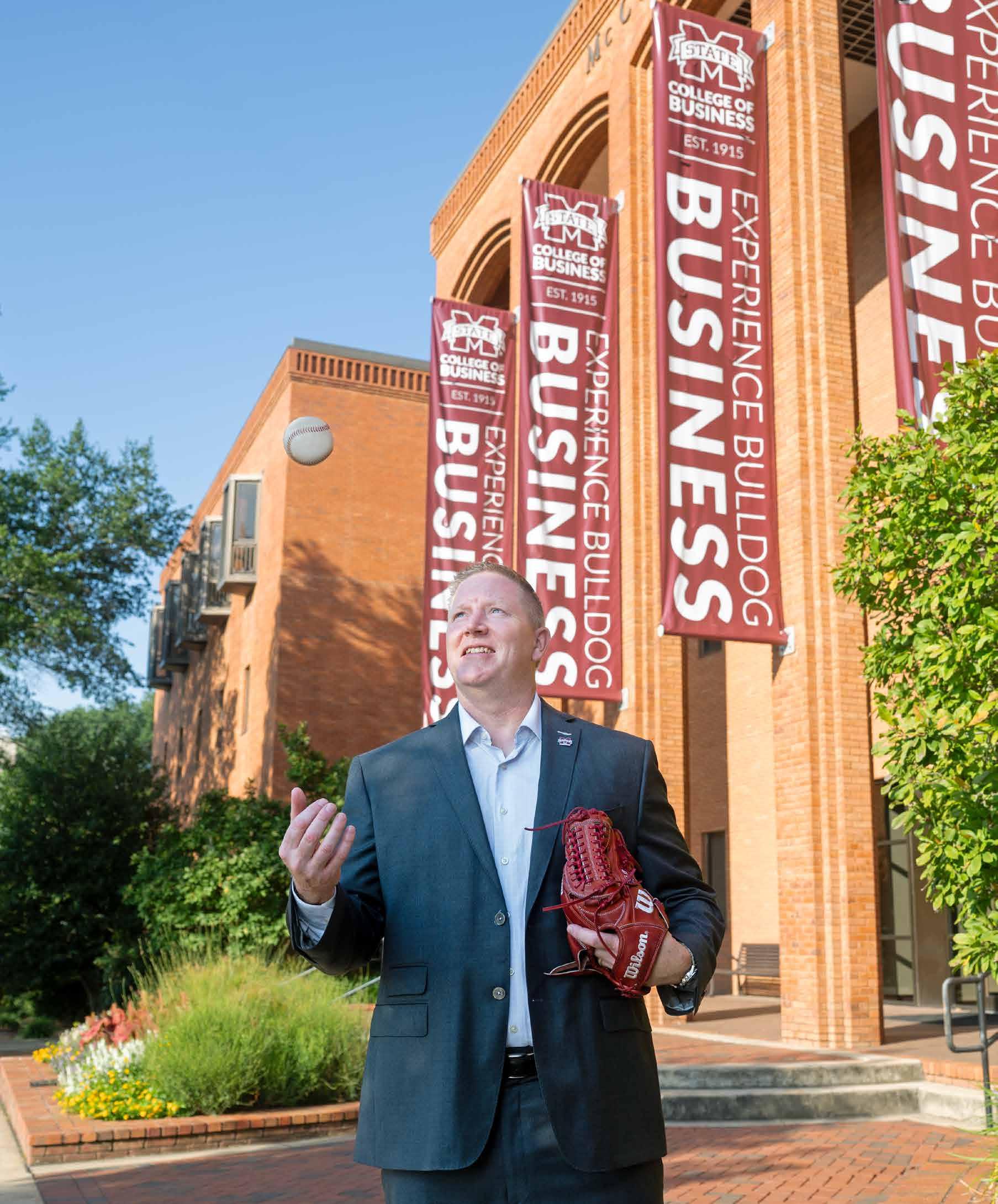
REAL-WORLD PROVEN
Grawe brings industry experience, academic expertise to College of Business helm
By Carl Smith, Photos by Emily Grace McCall
Scott Grawe couldn’t say no to Mississippi State twice.
Before he became the 11th dean of the MSU College of Business in 2023, the Iowa native was a sought-after high school pitcher on the radar of many college baseball coaches, including legendary Diamond Dawgs skipper Ron Polk.
Although Iowa State University eventually beat MSU and other schools to the young hurler’s signature, Polk’s personal recruiting style—and a lingering “What if?”—stayed with Grawe beyond his collegiate baseball career.
“I was getting letters and phone calls from all across the country, and then I committed in the early signing period. Once that happened, everyone stopped—except Coach Polk," Grawe recalled. "He’s the only one in the country that reached out to congratulate me and said he was looking forward to seeing me accomplish great things.
“Because of that, Mississippi State was always the school in the back of my mind," he continued. "Years later, I’d still flip the channel over to an MSU game and root for the Bulldogs once I was done watching Iowa State play.”
When a search firm contacted Grawe to gauge his interest in taking over for retiring Dean Sharon Oswald, whom he previously met through academic conferences, it seemed serendipitous.
“I always had a ton of respect for the people I knew at MSU, so it warranted a look. Having one of the best baseball programs in the nation didn’t hurt, either,” he joked.
That one look was all it took for him to sign on the dotted line this time.
Besides a 90-mph fastball—its velocity might have dropped a bit since his playing days, he admits—Grawe brings years of realworld experience and academic research in supply chain management to MSU. Entering into that specific field, however, wasn’t his original plan. Grawe earned a bachelor’s degree in finance from ISU and took a job with Principal Financial Group, a global investment management and insurance company headquartered in Des Moines, Iowa, before moving to Colorado with his wife Michelle.
There, fate—reputation, specifically—led him into his eventual area of expertise.
“I interviewed with Target for a human resources job, but an administrator asked if I would be interested in a transportation manager position that would open up later. That offer was purely based on his association of Iowa State and transportation excellence. I haven’t looked back since,” Grawe said.
“That’s an important lesson, and one I want to implement here at Mississippi State: Where you go to school—its reputation matters," he continued. "We have faculty here in the College of Business who are at
“Experiential learning empowers students to put their brains to work. It gives them ownership of their ideas and progress, and that satisfaction primes them for additional success.”
~ Scott Grawe
the very top of their field, doing outstanding research and truly care about their students. I want us to be known for that excellence.”
After almost a decade in the corporate world, which included a stint as an inventory control manager with Polaris Industries in Minnesota, Grawe re-entered academia and earned a master’s degree from the University of Minnesota’s Carlson School of Management and a doctoral degree from the University of Oklahoma’s Price College of Business. He then spent almost 15 years at ISU, working his way up to a full professorship and serving as chair of its supply chain management department, among other roles and responsibilities.
“The pandemic taught us all how important supply chains are to how we live,” said Frank Adams, MSU College of Business’ Mary Jo and Paul Karre Faculty Fellow and professor of supply chain logistics and marketing. “Dean Grawe learned those
lessons 20 year ago at Target and Polaris. He explored how supply chains impact all of us as a graduate student at the University of Oklahoma and as a professor at Iowa State. Now, his experience and scholarship guides the College of Business as we prepare our students and industry partners for the future.”
Grawe’s goal at MSU is to bring to the classroom more hands-on learning opportunities to better prepare students for rapidly evolving industry needs. In addition to this type of learning, he has many other assets under the College of Business’ umbrella to leverage toward success, including the MSU Center for Entrepreneurship and Outreach, Center of Family Enterprise Research, Family Business Education Initiative, Small Business Development Center and Idea Shop, among others.
“My academic career has always been about doing good research and taking care of students. It’s all about getting them excited about the careers they’re embarking on and having them take ownership of their learning," Grawe said. "Last year, we had 73 courses that had an experiential learning component to them, which is remarkable. I’m passionate about what I call live learning because students often get caught up with an answer key—wanting to just know what the answer to a question is. If we bring in real-world problems, they can get creative. That’s when they come up with solutions that nobody may have thought about before.
“Experiential learning empowers students to put their brains to work,” he continued. “It gives them ownership of their ideas and progress, and that satisfaction primes them for additional success.”
In addition to developing the hard skills needed to tackle future problems, Grawe wants students to be equipped with the soft skills required to advance their careers. Networking, team building and communication abilities translate across all lines of work and are invaluable assets job recruiters look for, he said.
“This is what I always tells students in one of my last lectures every semester: ‘If you take nothing else from this class, please understand that one of the most important skills you can learn in business is how to
build relationships,’” Grawe said. “No matter how big an organization is, they all rely on other business partners to help them out, and that means you, as an employer, must have people who can connect with others. A student’s ability to do that will open up so many doors for them throughout their career, just like it did for me.”
These relationship-building opportunities offered by the College of Business include numerous outreach efforts focused on serving Magnolia State communities and linking students with industry professionals. For example, COFER produces the Family Business Bulletin, a quarterly report providing insight, relevant research and resources tailored to family owned businesses, while industry-specific conferences including Supply Chain Connect Day and Insurance Day feature experts discussing the latest issues in their fields. The college also uses its growing Rolodex of Bulldog industry leaders who want to invest their knowledge—and sometimes capital— into the next generation of MSU graduates through a variety of mentorships.
You’ve Got Mail
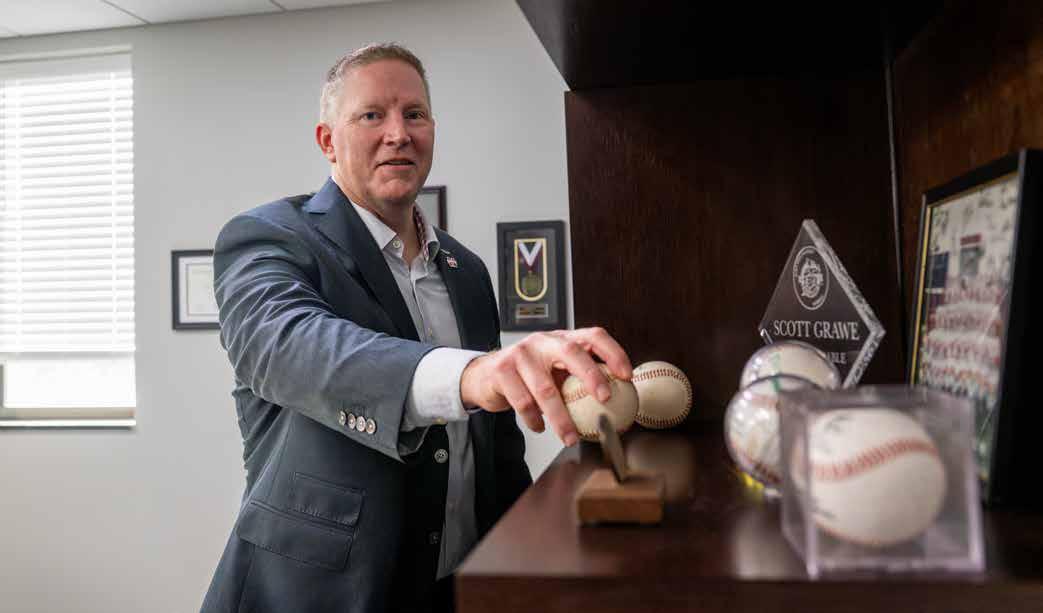
“I want our students and alumni to know we’re not done with you once you earn your degree. The four years or so they spend on campus—that’s just the beginning of their Bulldog business journey," Grawe said. "We want them coming back to us for seminars and programming; to share their expertise; to allow Bulldogs to help other Bulldogs in and out of the workplace.
“We’re also here for those who didn’t go to MSU," he continued. "The university is an important cog in Mississippi’s economic
Polk stays in touch with baseball acquaintances with thousands of letters through the years By
Not only did Ron Polk, the Godfather of Southeastern Conference Baseball, write the book on successfully coaching the sport, he’s also penned thousands of cards, letters and other correspondence to many of the people he’s crossed paths with during his 60-plus years as a coach.
The 2009 College Baseball Hall of Fame inductee has affixed his signature to simple missives ranging from birthday cards to well wishes for former players, coaches and others. Even some past recruits who chose not to join the Bulldogs received letters of congratulations for signing with other colleges and heart-felt good-lucks from Polk.
In all, Polk estimates more than 2,500 individual pieces of correspondence were delivered to former contacts the height of his outreach.
“These people wanted to be part of my life in some way, so I want to be part of
Carl Smith
theirs. It’s all about staying in touch with them because it’s the right thing to do,” Polk said. “People say they’re too busy to do things like this, that they don’t have time. It all boils down to this: I’m busy, too, but I’m doing things that others would like to do. That’s just how I was raised— disciplined and structured.”
Polk’s efforts are impressive because the self-described “old-school” coach eschews technology, opting instead for self-compiled, hand-written lists. He also completes much of his work by typewriter.
“I don’t have distractions. People think I’m crazy, but I get it done without all these smartphones,” he said. “My first cellphone came in 2001 when I was at Georgia. I still use a flip phone, and I don’t put a lot of names in my phone book.
“Sometimes, I’ll get a call from someone saying, ‘Happy birthday, coach, it’s Bobby,’” Polk continued, “and I’ll say, ‘Bobby who?’”
engine, and we’re here for businesses. Even if you graduated from that school up north—if you have a business challenge, we want to help you. We want people to build their businesses here in Mississippi and continue to provide jobs and support our communities.
“From our PGA Golf Management program to the MBA program, the College of Business is growing stronger and stronger each year,” he added. “I’m very proud of what we have to offer students, alumni and business leaders throughout the state.” n

The legendary Diamond Dawgs coach’s personal touch at communication is well known throughout the baseball world, and the interest in reaching out to Polk is mutual.
“One time, a sports information director let everyone know it was my birthday and put my phone number out on the internet so folks would call,” he said. “The phone started ringing at 6 a.m., and it went through midnight. Over the next few weeks, I had some people reaching back out and asking why I didn’t call them back that day. I said, ‘I couldn’t because of all the ringing!’”n

Teaching Tomorrowfor Landscape architecture professor strives to build minds, not just spaces
By Mary Pollitz, Photos by Emily Grace McCall

While standing in northwest Wyoming, Sadık Artunç took in the sweeping view of Yellowstone National Park.
Having visited nearly 80% of the country’s National Parks, he finds himself wondering the same thing each time.
“Two thousand years ago, people stood here and thought the same things I was thinking about these views,” he said. “I like to think that 2,000 years from now, people will still think it’s beautiful and be in awe.”
For Artunç, a Turkish-born landscape architect and former Mississippi State department head, nature is more than just scenery; it was his calling from the start.
In 1970s Turkey, landscape architecture was virtually unknown. Only two universities offered a single course in the field. Artunç took it and fell
in love. But with no full program available, he earned bachelor’s and master’s degrees in forest engineering at the University of Istanbul instead.
Shortly after graduation, he joined Turkey’s National Park Service as planning director of Uludağ—the country’s largest national park at the time—and his landscape architect career began.
“I implemented the master plan and observed construction, growth and development of the park, while protecting the environment from hunting and poaching,” he said.
Although Artunç enjoyed his role with the Turkish National Park Service, he was driven by a desire to deepen his knowledge and make a greater impact. This commitment to learning led him to move to the United States to pursue a degree in landscape architecture.
"When you educate somebody, nobody can replace that. As long as I teach a student how to learn and ask the right questions, that’s how we make a difference. We don’t teach for today. We teach for tomorrow."
~ Sadik Artunç


“People thought I was stupid to leave that job and start over,” he recalled. “But I wanted to learn.”
He moved to the Great Lakes State and earned a master’s in landscape architecture from the University of Michigan. He then taught at Louisiana State for 25 years, helping thousands of students find their passion and path in the field. In 2007, he moved to Starkville to become the head of the MSU Landscape Architecture department.
“The United States gave me many, many opportunities and I always tell people: America is still the land of gold and opportunities if you put the work in,” the professor said. “I have no regrets choosing this profession and staying here. If I could do it all again, I would still be here in Starkville.”
For Artunç, every decision along the way led him to a patio chair in the courtyard between the Landscape Architecture and Environmental Design buildings. When he first arrived at MSU, the same courtyard was little more than an underutilized patch of grass. Today, it’s a sustainable oasis—designed through faculty-student collaboration—featuring native, drought-resistant plantings and a system for capturing rainwater.
“That’s what I really love to do, and I’ll gladly make less money to teach,” Artunç said with a laugh. “That’s how much I love it.”
Artunç’s influence reaches far beyond the university. He’s led international workshops, mentored national park employees worldwide, and taught more than a dozen CEOs of major landscape architecture firms. He served as the president of the Council of Educators in Landscape Architecture, which is in the Academy of Landscape Architecture, and several of his former students also have served or are serving as leaders in the organization CELA.
“This profession is incredibly important because we have the opportunity to make a huge difference on this planet. Despite all the challenges we face, we can make this life better for all living things,” he said. “We’ve been here before, and I hope my determination is carried out with every student we graduate. I hope we continue to make this place better.”
"This profession is incredibly important because we have the opportunity to make a huge difference on this planet."
~ Sadik Artunç
“I didn’t do it personally,” he said, “but as department head, I helped students generate the plans and got permissions. Today, when I get stressed, I just come out here. I sit in the shade and look around. I love this place.”
His commitment to sustainable, resilient design has helped define his legacy. Using native materials and plants that thrive with minimal irrigation, Artunç’s philosophy focuses on longterm ecological health.
“I like plants that can survive on their own with as little help from us as possible,” he said. He intended to serve as department head for only a few years before returning to his true passion—teaching. But, from 2006 to 2023, he led the department through university budget cuts, hiring freezes and structural changes, all while keeping student success at the forefront. After stepping down as department head, he returned to the classroom, where he now focuses on helping students think about the world a little differently than they did before.
As he nears retirement, Artunç said he finds joy in his classroom, his makeshift outdoor office in the courtyard and as a local Rotarian. He’s found his niche here in Starkville. He’s even found unexpected friendships at local restaurant Harvey’s, where he and a group of once-strangers now meet for lunch nearly every day.
“They are very dear to my heart. If I don’t show up for lunch, they send me a message,” he said. “I love it, and we go every day. When I retire, I’m going to hang around here, that’s how much I love Starkville.”
Until then, though, he remains committed to guiding and mentoring students, not just in design but also in thinking critically about the world around them. He hopes his students graduate with the same passion he has for creating spaces for all living things.
“We can build things, even the best examples of built work, but they will be replaced or modified within 15 years,” he said. “When you educate somebody, nobody can replace that. As long as I teach a student how to learn and ask questions—how to ask the right questions— that’s how we make a difference. We don’t teach for today. We teach for tomorrow.” n
CURVEBALLS AND COMEBACKS MSU softball pitcher finds home in Starkville
By Mary Pollitz, Photos by MSU Athletics

Before Raelin Chaffin stepped into the pitcher’s circle for Mississippi State, she had her routine annual physical. She felt completely fine—no symptoms, no signs that anything was wrong or out of the ordinary. But her doctor felt a small lump on her neck.
“I told my trainer at State it was just swollen lymph nodes,” Chaffin said. “I didn’t think anything of it.”
But the routine check-up turned into more tests, an ultrasound and then biopsy. Chaffin was diagnosed with Stage 1 thyroid cancer in August. Though caught early, the cancer had already begun to spread to her neck muscles.
“I never thought twice about getting my thyroid checked, and they had never checked it in a physical before,” she said. “Thyroid cancer is so common for young women my age, so I think it’s important to go in for regular check-ups.”
In September, a couple of months before the 2025 season began, Chaffin had her thyroid removed. New to Starkville, the Louisiana State transfer was starting to find her footing in Starkville before leaving for treatment. She spent her recovery time worrying about fitting in and missing more than a month of practice and school.
“I didn’t know anybody here,” she said. “It was a new environment, and I was nervous that by the time I returned after my surgery, everyone would already have these friendships formed, and I would be by myself. But it wasn’t like that. It was the opposite.”
Support poured in. Head Coach Samantha Ricketts and pitching coach Taryne Mowatt-McKinney both made it evident: Chaffin’s health came first. Her teammates sent flowers, covered her locker with encouraging notes and welcomed her back to
Mississippi State pitcher Raelin Chaffin readies for action on the field during her sole season with the Bulldogs. The LSU transfer overcame a thyroid cancer diagnosis just months before the 2025 season, returning to the circle to deliver one of the most dominant years of her career and leaving a lasting mark on the Bulldog program.
the team as if she’d never missed a day.
“It was sweet,” Chaffin said. “I just fit right in again.”
That support and camaraderie is what drew Chaffin to Mississippi State in the first place. After spending four seasons with LSU, Chaffin entered the transfer portal for her final collegiate season. She visited six different programs. She swears none felt as right as MSU.
“Coach Ricketts treated me like a person first, then a player. You don’t always find that in the college sports world,” she said. “That’s how they take care of their players. It’s not a business for them. You just don’t see that everywhere.”
After surgery at Ochsner LSU Health in her hometown of Shreveport, Louisiana, Chaffin said she experienced little to no side effects. With the support from her teammates
and coaching staff, she returned to Starkville and the mound, regularly undergoing bloodwork to track her hormone levels. She had the best senior season she could have asked for.
“Raelin came in wanting to prove herself and finish her career on her own terms. Even through the hardships she battled, she handled herself with humility and grace,” Ricketts said. “She was a wonderful example for our team of what perseverance in the face of adversity looks like and she led with both her actions and words. I am forever grateful she chose to be a Bulldog and leave her mark on the program in ways that far extend past the softball field.”
You could see the competitive joy in her eyes when she was in a circle. We’re so happy she’s a forever Dawg.”
“Raelin came in wanting to prove herself and finish her career on her own terms. Even through the hardships she battled, she handled herself with humility and grace.”
~ Head Coach Rickett
In her first, and only, season at Mississippi State, Chaffin had the most dominant year of her career as the key player for the Bulldogs. She posted a 23-10 record over 191.1 innings, including a schoolrecord 10 wins in conference play. “If I had waited a year to get checked, I would not be where I am today in my career,” Chaffin said. “If I had a bad game here, I didn’t get scrutinized. I never got yelled at for making a mistake. When I did make a mistake, Coach Ricketts was always in my corner supporting me.”
Less than six months after her diagnosis and surgery, Chaffin threw 111 pitches in an eight-inning win over eventual national finalist Texas Tech while outdueling the 2025 National Pitcher of the Year on Opening Day. She struck out six batters and allowed no earned runs in her MSU debut.
“She came in on day one ready to make a difference, and that’s exactly what she did,” Mowatt-McKinney said. “The best thing about Rae was her consistency in how she showed up to the field every day and her ability to enjoy the moment as it was happening.
After a stellar season, Chaffin was one of 12 players drafted in the Athletes Unlimited Softball League, joining fellow senior Bulldog and outfielder Sierra Sacco with The Talons.
Chaffin said she wasn’t positive she would go on to play in the professional league. But now that she’s there, she credits God, her recovery and the Mississippi State community for helping her rise to the moment.
“How I’m performing now is because of the MSU atmosphere,” she said. “It’s how I was coached and why I’m here.” n

AN OUNCE OF PREVENTION
Whether based on age, risk factors or family history, receiving the proper preventative healthcare can make the difference between catching a problem in the early, treatable stages or once the damage has been done.
Dr. Katrina Poe, director of Mississippi State’s Longest Student Health Center, explained that preventative care is investing in yourself today to protect your tomorrow.
“Taking care of your health doesn’t just mean seeing a healthcare provider when you’re sick,” Poe explained. “It’s also about preventive measures to protect your health before problems begin. This includes regular check-ups, screenings, vaccinations and healthy lifestyle choices that can help you live a longer, healthier life.”
Poe said having a primary care provider and a baseline understanding of your wellbeing—such as cholesterol levels, blood pressure and other routinely collected data—can help identify risks to your health.
“Many serious health conditions develop quietly, without obvious symptoms,” Poe explained. “Regular screenings and checkups can detect these problems early, when they are most treatable.”
What tests are necessary varies from person to person based on their individual physiology, risk factors and predisposition to certain illnesses. Preventive health care includes:
• Annual check-ups and wellness visits
• Blood pressure, cholesterol and diabetes screenings
• Cancer screenings
• Immunizations and boosters
• Counseling on diet, exercise, sleep and stress
• Dental and eye exams
Poe said you should consult with your primary care provider to determine what screenings are appropriate for you, and when and at what frequency they should be done.
Many insurance providers cover 100% of preventative care and screenings—sometimes called wellness visits. Consult your healthcare provider and individual insurance plan to determine what screenings are right for you and at what rate they will be covered. n
Social Life Social Life

MSU ALUMNA MAKES
MARK ON SOCIAL MEDIA, GENERATIONS OF BULLDOGS
By Aspen Harris, Photos by Grace Cockrell
Kathleen Olivieri practices what she teaches.
In the classroom, the former Mississippi State technical writing lecturer teaches students how to successfully communicate their ideas. In her personal life, Olivieri has found her own success online by communicating what she knows best—herself.
“I got into the whole social media thing just because I’ve always documented my life,” Olivieri said. “I never really set out to talk about MSU, but it’s just one of those things that happened.”
A Yazoo City native, Olivieri first came to MSU in 1984 as a communication major
and feature twirler with the Famous Maroon Band. Now, she uses social media to share insight into her daily activities and her love for all things MSU. Among her most popular posts are “Outfit of the Day,” or OOTD, videos where she showcases her daily looks, which often include vintage styles that have been in her closet for decades. She also shares “Day in the Life” videos providing glimpses into her experiences on a college campus or with her husband, and fellow Bulldog, Ralph.
Because of posts like these, she’s garnered over 50,000 followers across Instagram and TikTok and received more than 700,000 likes. She went viral in summer 2024 showcasing her sorority rush wardrobe from her freshman year. She explains in the video that her rush clothes were handmade by a seamstress in her hometown—the same woman who made her baton outfits and, eventually, her wedding dress.
“My mother would buy material and ask her to make what I needed, so I never knew
what I was going to find,” Olivieri recalled. “I didn’t know what my wedding dress looked like until I showed up to try it on.
“I didn’t keep these clothes for a reason. I just kept them because they meant something to me,” she said. And, obviously, social media users see something in them, too.
Olivieri admits she was surprised the vintage dress video would get online attention. Still, something about her passion for fashion and her knack for finding positive and interesting things in her everyday life strikes a chord with audiences. And with more than 40 years spent at Mississippi State, where she not only found a career but the love of her life and place to raise a family, she has no shortage of Maroon and Whiterelated content to share.
She regularly showcases MSU-themed accessories and maroon fashions, many of which hold special memories or meanings. Her videos also give viewers a look behind-
the-scenes of faculty life and glimpses into rural living.
Olivieri said documenting her life and sharing it online was a logical step for her. She said as an undergraduate in communication, she fell in love with broadcasting—a field that introduced her to Ralph who worked for many years at the University Television Center.
The couple frequently documented their life on camera in the’80s and ’90s, so when social media and smartphones came around, Olivieri was an early user. Not only did it feed her love for videography and communication, but it fit right in with her career at the time—working for MSU’s Information Technology Services—and would come into play with the field she earned an MSU doctoral degree in—student development in higher education.
“I was on Facebook right when it came out just so I could stay up with the students, because technology is cool,” Olivieri said. “If it’s not cool, why bother, you know? It was cool. It was fun. I was always on social media.
Most importantly, she teaches by example, showing students how being a good communicator can open doors. She also helps them see that there’s nothing wrong with seeking extra help to improve communication skills—despite personality type, field of study or future career.
“Don’t just say you don’t have good communication skills, you’re an introvert or that you don’t need to work on communication because that’s not what you plan to do,” Olivieri explained. “We still need to be able to communicate, because the person who can communicate their idea will be the one who’s successful.”
“Don’t just say you don’t have good communication skills, you’re an introvert or that you don’t need to work on communication because that’s not what you plan to do. We still need to be able to communicate, because the person who can communicate their idea will be the one who’s successful.”
“My husband is creative, and I like to be creative, and this provided an outlet for that,” she continued. “Ralph doesn’t mind me being on camera, because his whole working life was about recording people. It’s just normal to him.”
~ Kathleen Olivieri
Carol Read, Olivieri’s lifelong friend and former boss from her first Mississippi State job in the Division of Continuing Education, said it’s her creativity that makes Olivieri special.
“She thinks and marches outside the box,” Read said. “She’s very creative. She doesn’t see obstacles. She just sees opportunities.”
While she doesn’t bring her social media into the classroom out of respect for her students, Olivieri does find ways to make teaching technical communication engaging. She said she enjoys playing music as students trickle into the classroom, something she learned from a music professor.
“I like to have fun and keep their attention,” Olivieri said.

She says one of the most important aspects of professional and personal communication is simply to be interested in others, a skill she learned from her late father.
“No matter where we went, we always found him with the most successful person in the room just holding a conversation,” she recalled. “He enjoyed listening to and learning from others, and people just gravitated toward him. I remind my students to be interested in others, and that’s what I’ve done with MSU.”
Now, Olivieri is taking the education, experience and insights gained from her time at Mississippi State and starting a new chapter as an assistant dean with Oklahoma State University’s Institute of Technology. But despite relocating to the Sooner State and adding more black and orange to her wardrobe, she is sure to say she will always be a maroon-wearing, cowbell-ringing, Alumni Band-performing Bulldog.
“Mississippi State University has given me my best friends and my husband,” Olivieri said. “It’s really interesting how my career twisted and turned, and I’ve learned so much. I’ve had so much fun, and I’ve met the best people and the best students.
“So, I love Mississippi State,” she continued. “It’s given me everything, and it’s given me the background to now enter a new phase of my life, which is not going to be a struggle because I carry Mississippi State with me.” n
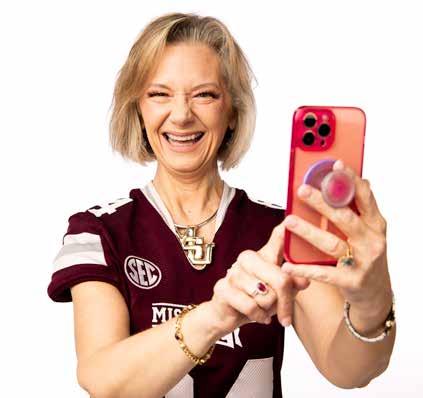


























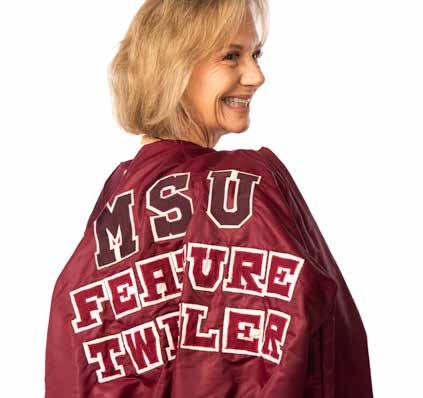

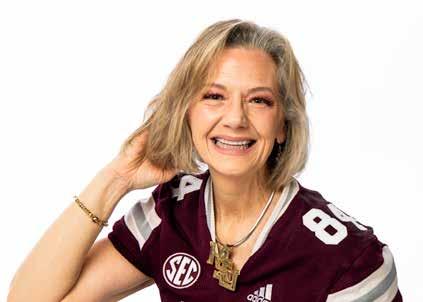
Lorem ipsum
Kathleen Olivieri
From the classroom to the camera, Kathleen Olivieri proves communication is always in style.
MSU CELEBRATES PARKER, College Alumni of the Year
By Addie Mayfield
Mississippi State University recognized Hal Parker Jr. as its National Alumnus of the Year during the MSU Alumni Association’s 2025 awards banquet.
A native of Pike County and longtime resident of Bolton, Parker earned a bachelor’s degree in business from MSU in 1969. He credits his time at the landgrant institution for helping him develop the confidence and skills to pursue big dreams—and ultimately build a foundation for a remarkable career spanning more than five decades.
The son of two MSU-educated teachers, Parker lived in Starkville briefly as a kindergartener while both parents pursued graduate degrees. Although the Parkers returned to southwest Mississippi, they maintained close ties to MSU, and Parker has many fond memories of attending sporting events and cheering on the Bulldogs with his family.
That early inspiration fueled Parker’s decision to attend MSU. His decision to study business was influenced by the small, family-owned businesses and the benevolent community leaders behind them that defined his hometown. Seeing the impact those entrepreneurs made in their communities sparked his desire to follow suit.
After graduation, Parker served in the National Guard and eventually landed a job at Sears, where he gained invaluable experience in networking and systems management. Just over a decade later, Parker became a partner in Climate Masters, an HVAC and insulation contracting company. In the early 1980s, he founded Sunbelt Wholesale Supply Co., a Pearl-based regional distributor of fiberglass insulation and roofing materials that would go on to become part of Service Partners LLC—the nation’s largest insulation distributor. He later became a partner in Mississippi Roofing Supply until its sale in 2006. Today, he remains involved as a general partner in Parker Land LLC, and serves as president of Parker CDJR Auto in Starkville.
For Parker, the greatest reward of his career has been creating jobs and building strong relationships with business partners and employees. Throughout his professional life, he has kept a people-first focus, something he attributes in part to lessons learned at MSU and at home. His mother, left to raise him after his father passed away at a young age, instilled a deep belief in the power of education to change lives. A
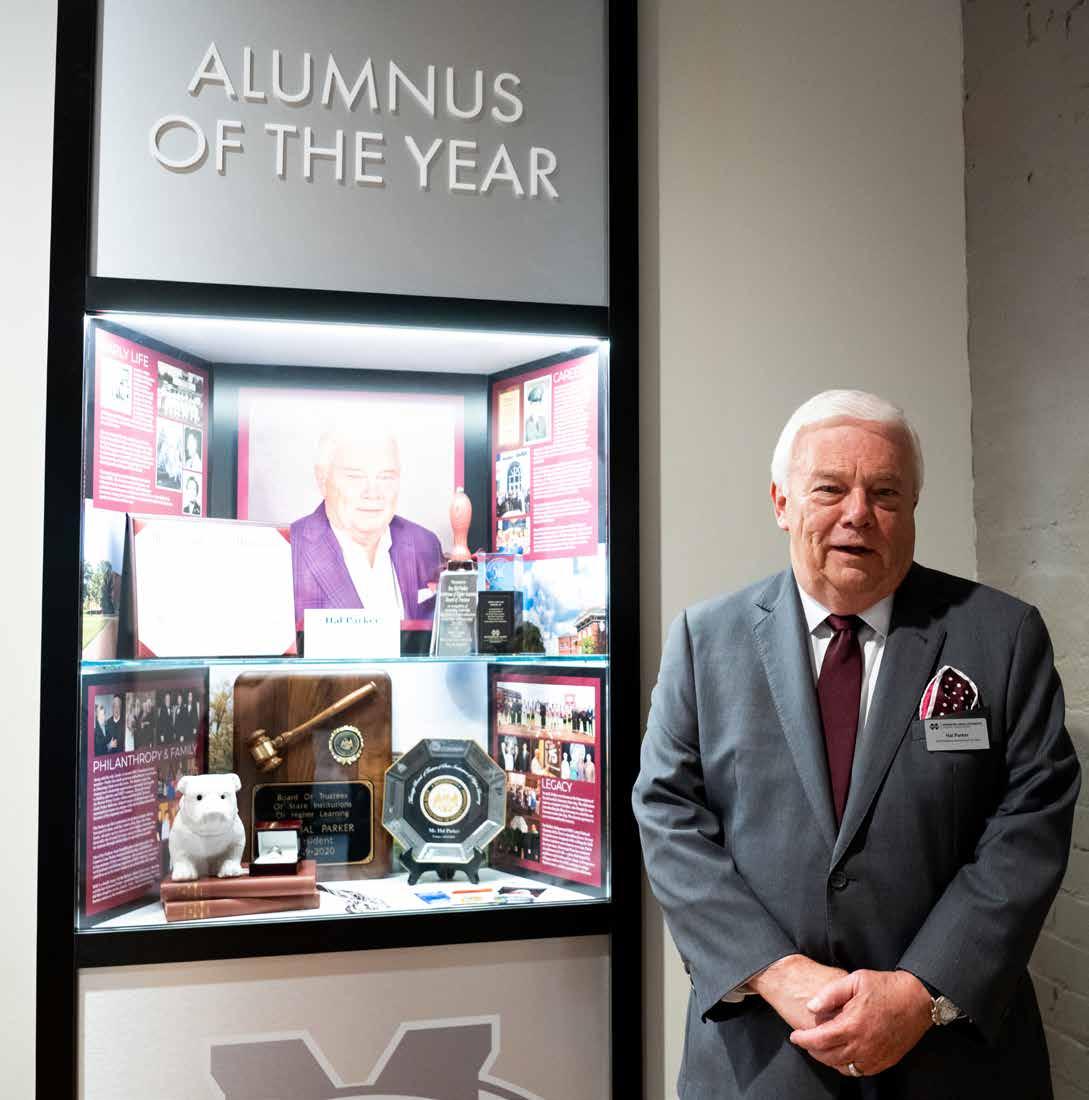
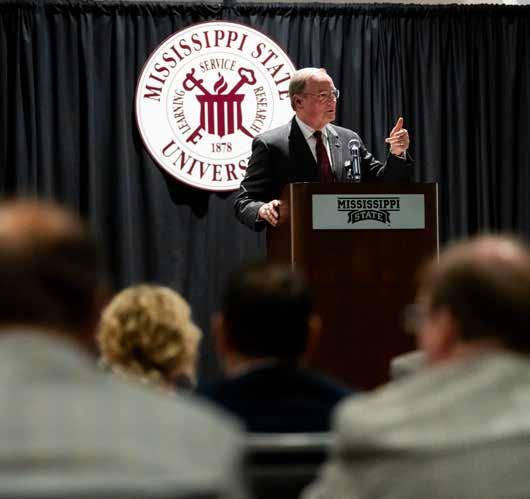
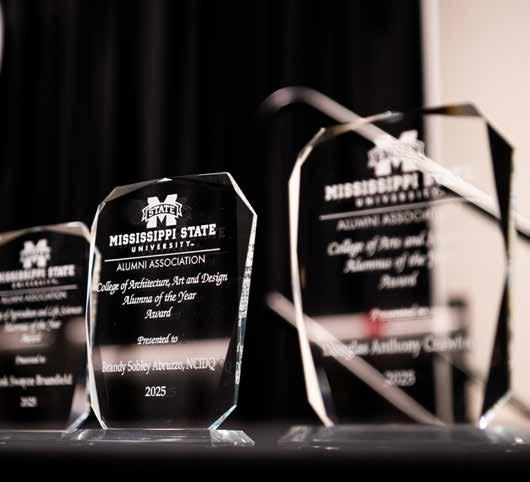

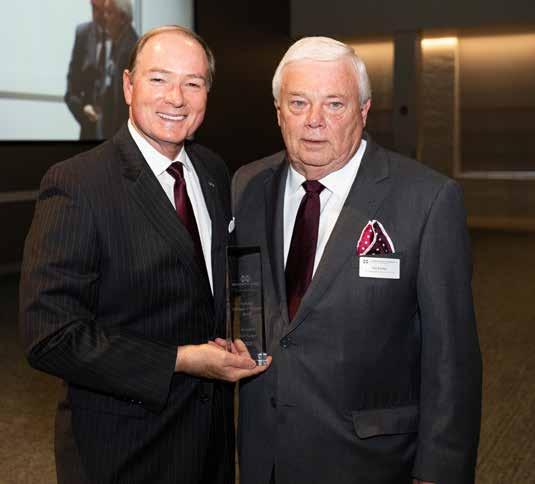

World War II company commander, she left a lasting legacy of service and commitment.
That same spirit of service has guided Parker’s enduring relationship with his alma mater. A second-generation Bulldog, Parker has served four terms on the MSU Foundation board, led the Bulldog Club as president for two terms and served on the national alumni board.
Beyond MSU, Parker represents higher education across the state as a member and former president of the board of trustees of State Institutions of Higher Learning. Additionally, he has contributed his leadership to other impactful organizations, including the Hinds Community College Foundation, Rankin Health Foundation, Rankin First and BankPlus.
Along with his wife Linda, a current MSU Foundation board member, Parker has made generous philanthropic investments in Mississippi State over the years. The couple has championed scholarship opportunities and made lasting contributions to Bulldog athletics and MSU’s campus. Their gift to the
Hunter Henry Center, which established the Hal and Linda Parker Ballroom, helped ensure a dedicated space and meaningful presence on campus for the Division of Development and Alumni to thrive.
The Parkers say their motivation for giving is simple: life has been good to them, and they want to help others in return. Linda, who grew up in a rural area where higher education was financially out of reach for many, says providing opportunities for students through scholarships is especially meaningful.
One of the Parkers’ most heartfelt gifts to the university is the Cameron Lane Parker Endowed Scholarship, established in loving memory of their son Cameron, who passed away last year. A 2018 graduate and lifelong supporter of MSU athletics, Cameron’s spirit lives on in the future students his scholarship will support.
MSU is a family legacy for the Parkers. Both of their sons, Brandon and the late Cameron Parker, graduated from Mississippi State, as did their daughter-in-law, Laurie. Today, their
granddaughter, Anna Payton, carries on the tradition as a fourth-generation Bulldog.
In 2018, Parker was chosen as the first recipient of the university’s honorary class ring. The distinction came as a surprise to Parker, who thought he was just attending The Ring Ceremony to watch his son Cameron receive his ring. The shared experience is now a treasured family memory.
For Parker, being named MSU’s 2025 National Alumnus of the Year is a humbling honor. He says it’s one he never imagined while walking the Drill Field as a student more than 50 years ago. But in the years since, Mississippi State has remained a touchstone in his life—a place that shaped his ambitions and reinforced his values. A strong sense of legacy and love for MSU continues to shape Parker’s story and the university he calls home.
Together with Parker, the MSU Alumni Association honors several other exceptional alumni as the alumni of the year for their colleges. Individual academic college selections for Alumni of the Year for 2025 include:
L-R: Lavon Fluker-Reed, Dr. Bonnie Boudreaux, W. David Purvis, Hal Parker, Frank Swayze Brumfield, Douglas Anthony Crawford, Stephen W. “Billy” May III, and Brandy Sobley Abruzzo.

COLLEGE OF AGRICULTURE AND LIFE SCIENCES
An Inverness native, now living in Chicago, Illinois, Frank Swayze Brumfield has built a distinguished career in agriculture, finance and investment while remaining a dedicated supporter of Mississippi State University. After graduating cum laude in 1988 with a Bachelor of Science in agricultural economics, he initially planned to return to his family farm; however, due to the challenging ag cycle of the 1980s, he sought new opportunities that led him to the Chicago Board of Trade. He spent 18 years at the CBOT mastering financial markets. In 2006, he founded FSB Companies, a private investment firm specializing in real estate, private equity, agriculture and strategic lending. As founder, chairman, and CEO, Brumfield focuses on leveraging his network and experience to create opportunities that advance his portfolio of companies, defining vision and strategy, and surrounding himself with top-tier talent to execute his ambitious plans. As a committed philanthropist, he attributes his giving to the influence of his wife, Mary Frances of Macon, and their three children, Swayze, Blake and Lucy. He has established multiple MSU scholarships in honor of his family and supports Delta Streets Academy, 4-H programs, and Children’s Lurie Hospital in Chicago. He is also a longtime Bulldog Club member, a past board member and a founding donor of the Strategic Finance Laboratory and Center for Entrepreneurship and Outreach at MSU. Brumfield credits MSU for the relationships and education that shaped his success, emphasizing the impact of the faculty, students and values instilled during his time in Starkville. Although his path initially led him beyond Mississippi, he has come full circle to where his roots run deep, focusing much of his energy and resources on developing agri-
businesses in the Mississippi Delta. His deep passion for agriculture and MSU remains unwavering, ensuring future Bulldogs have access to the same opportunities that helped shape his journey.

COLLEGE OF ARCHITECTURE, ART AND DESIGN
Brandy Sobley Abruzzo, NCIDQ, of Nashville, Tennessee, has dedicated her career to transforming senior living spaces through innovative and barrier-free design. A 1997 graduate of Mississippi State University with a Bachelor of Science in human sciences, she is a certified interior designer licensed in seven states. The Columbus native is a principal at Studio 121 Inc., a nationally recognized interior design firm specializing in senior living, where she oversees all design and furniture, fixtures, and equipment phases. Her passion for creating accessible environments was inspired by her grandmother’s challenges navigating public spaces in a wheelchair, leading her to focus on independent living, assisted living, memory care and skilled nursing design. Under her leadership, Studio 121 has earned numerous accolades, including the 2024 Senior Housing News first-place award for life plan communities. Dedicated to giving back, she serves on MSU’s Interior Design Advisory Board and employs, as well as mentors, MSU graduates entering the profession. She has also contributed to her local community by serving on various parent-teacher organization boards at her children’s schools. Abruzzo credits MSU with providing the education, professional network and lifelong relationships that have shaped her career.
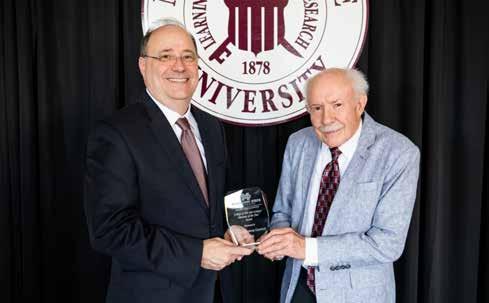
COLLEGE OF ARTS AND SCIENCES
Douglas Anthony Crawford, a Warren, Ohio, native and longtime Starkville resident, has dedicated his life to science, service and supporting education. He earned a Master of Science in chemistry from Mississippi State University in 1968 after completing a bachelor’s degree in chemistry and math at Hiram College. His professional career spanned more than 50 years as an analytical chemist, including long tenures at the State Chemical Lab at MSU and Southern Ionics in Columbus. A passionate supporter of MSU and Hiram College, Crawford has funded scholarships in multiple disciplines, from chemistry and aerospace engineering to social work and the arts, as well as provided financial support for special projects. Beyond academia, his commitment to community service includes decades of volunteer work with the Episcopal Church of the Resurrection, Habitat for Humanity and numerous charitable organizations. He has also contributed to local beautification efforts, maintaining George Evans Park and participating in litter cleanup. An amateur violinist, Crawford played with the Starkville-MSU Orchestra and was a familiar sight in the Starkville Christmas Parade, driving his red 1953 MG to represent The Independent Order of Odd Fellows Charitable Organization. Mississippi State became his home thanks to the welcoming mentorship of Donald Emerich, and he has since spent more than five decades giving back to the place that shaped his journey.
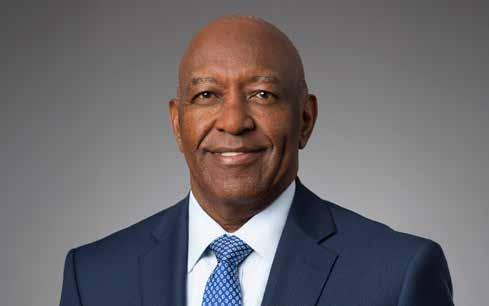
COLLEGE OF BUSINESS
Kenneth B. “Ken” Robinson , a Eupora native, lives in Boca Raton, Florida,where he has built a distinguished career in corporate finance and executive leadership. A 1977 MSU graduate with a Bachelor of Science in banking and finance, he later earned an MBA in finance from the University of Memphis, setting the stage for a career that spanned leading global corporations. Robinson held senior executive finance roles at Procter & Gamble and Exelon Corp., where he played a pivotal role in strategic financial planning and corporate governance. Now retired, he continues to shape the business world as an independent corporate board member, providing strategic insights and financial expertise. Robinson remains deeply connected to MSU, serving on the Executive Advisory Board for the College of Business and the MSU Foundation board, ensuring future generations of Bulldogs have the same opportunities for success. Honored as a College of Business Alumni Fellow in 2015, he credits MSU for instilling in him goal setting, adaptability and a strong work ethic. His passion for business and desire to make an impact continue to inspire both students and professionals alike.
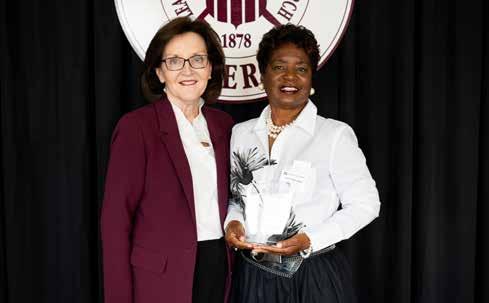
COLLEGE OF EDUCATION
Meridian native Lavon Fluker-Reed, who now resides in Madison, is a lifelong educator and leader dedicated to fostering student success and educational excellence.
She earned a Master of Education in 1976 and an Educational Specialist degree in 1983 from Mississippi State University. She also has degrees from Meridian Junior College, the University of Southern Mississippi and a Doctor of Education from the University of Alabama. Her journey in education began through a work-study program at Meridian Community College, which ignited her passion for special education—a field in which she has left a lasting impact. Retiring in 2007 as superintendent of the Aberdeen School District, she led the district to Southern Association of Colleges and Schools Accreditation, ensuring excellence in curriculum, instruction and operations. Her dedication to MSU continues through her role as co-founder of the Fluker-Reed/ Reed-Burrell Endowed Scholarship, her gifts to the Bulldog Club and her past service as an adjunct professor at MSU’s Meridian campus. Beyond her career, Fluker-Reed serves her community through organizations such as Rotary International, the USA International Ballet Competition and the Greater Pearlie Grove College Ministry. She has received numerous accolades, including serving as the president of the Mississippi Association of School Superintendents, serving on the State of Mississippi Board of Education, being inducted into the Meridian Community College Hall of Fame, being recognized as the Mississippi Association of Office Personnel Administrator of the Year, and having the Fluker-Reed Activity Center named in her honor. She remains dedicated to supporting future generations of students and educators.

JAMES WORTH BAGLEY COLLEGE OF ENGINEERING
W. David Purvis of New Orleans, Louisiana, has built an extraordinary career in the petroleum industry, combining technical expertise with leadership and mentorship.
A summa cum laude Bachelor of Science graduate of MSU’s chemical engineering program in 1983, Purvis discovered his passion for petroleum engineering during an internship with Shell. Over his career at Shell, he refined his skills in reservoir engineering and optimizing oil and gas field performance before moving into leadership and executive roles both in the U.S. and overseas. In his second career, he rose to vice president of engineering at BHP Petroleum, overseeing global technical standards, reserves estimation and staff development. After retiring, he joined The Alternative Board New Orleans as a partner, where he now coaches small and mid-sized business owners to help them achieve strategic growth. Purvis remains actively engaged with MSU, serving on the boards of the MSU Foundation, the Department of Petroleum Engineering and the dean’s advisory council for the Bagley College of Engineering. He also mentors students and teaches the petroleum engineering capstone senior design course. A licensed professional engineer and inductee of the MSU Chemical Engineering Hall of Fame, Purvis dedicates time to community leadership as the president of the First Baptist Church New Orleans Foundation and as an ambassador for the New Orleans Chamber of Commerce. He credits MSU with shaping his work ethic, critical thinking skills, and leadership capabilities while also introducing him to his wife, Susanne, who has stood by him throughout his international career journey.
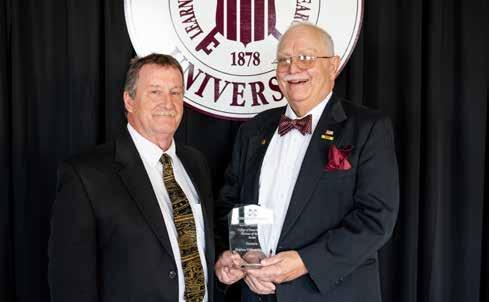
COLLEGE OF FOREST RESOURCES
Stephen W. “Billy” May III of Tuscaloosa, Alabama, has dedicated his life to forestry, public service and military veterans while maintaining a strong connection to Mississippi State University. After serving in the U.S. Army Security Agency, including
multiple Vietnam campaigns, he pursued his passion for forestry, earning a Bachelor of Science in forest resources from MSU in 1977. May’s career spans decades of leadership in both public and private forestry sectors, including vice president and chief forester for Delaney Development and Springdale Land Management, and fire division director for the Alabama Forestry Commission. Alongside his professional career, he has supported the state of Alabama and its forestry industry for nearly three decades through various appointments. May has served on the Solid Waste Advisory Committee, the Department of Conservation and Natural Resources advisory board and as a member of the Alabama Governor’s Regional Economic Development Advisory Board. He also contributed to the Alabama Board of Registration of Forestry and the Alabama Forestry Commission. A lifelong advocate for veterans, he holds lifetime memberships in organizations such as the Vietnam Veterans of America and the American Legion. At MSU, May remains engaged through his role on the Forestry Advisory Committee, facilitating research grants and establishing an endowed scholarship in the Department of Forestry.


A proud Bulldog Club member, he and his wife, Terri, actively support MSU athletics, passing on their Bulldog pride to their three daughters and grandchildren. Today, he continues to mentor the next generation of foresters while preserving a legacy of service, leadership and dedication to MSU.

COLLEGE OF VETERINARY MEDICINE
A Mandeville, Louisiana, native who now resides in New Roads, Louisiana, Dr. Bonnie Boudreaux has dedicated her career to advancing veterinary oncology and student success in veterinary education. A two-time Mississippi State graduate, she earned her Bachelor of Science in biological sciences in 2002, graduating summa cum laude, and her Doctor of Veterinary Medicine in 2005. Currently serving as the senior

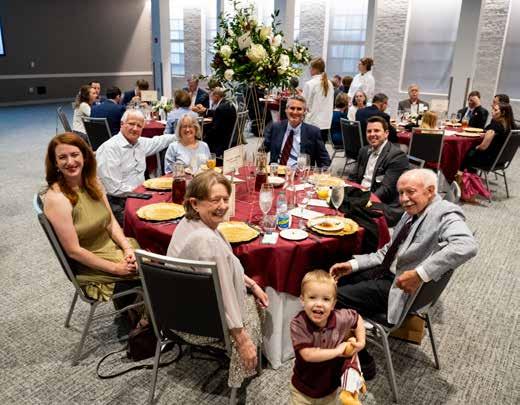
associate dean for student success at Louisiana State University’s School of Veterinary Medicine, Boudreaux leads a 14-person team that oversees student-related initiatives, the development of a competency-based veterinary education curriculum, and a new veterinary technician program. In 2016, Boudreaux was the medical oncologist on the healthcare team for Mike VI, LSU’s live tiger mascot, when he was diagnosed with spindle cell sarcoma. She worked with the team to diagnose and treat Mike VI and was the first author on the publication associated with his treatment. Her extensive career includes leadership roles with the American College of Veterinary Internal Medicine and the American Veterinary Medical Association, where she has shaped national veterinary education and oncology standards. She remains deeply connected to MSU, crediting clinical externships, the problem-based learning curriculum and faculty mentorship as the foundation of her professional success. Passionate about mentorship, she continues to support the next generation of veterinarians and has been recognized with multiple Dean’s Teacher Merit Honor Roll awards. She also gives back to her community through academic committees and volunteer work. n
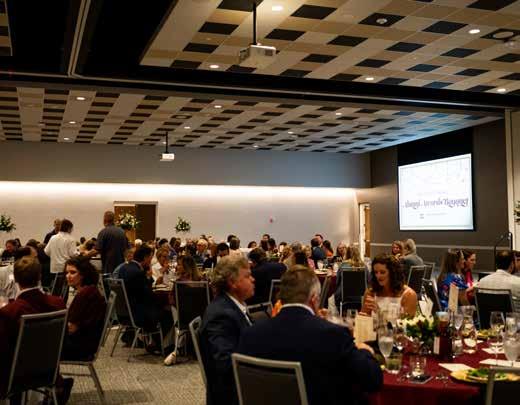

MSU Alumni Association National Board and Officers

The MSU Alumni Association welcomes a new slate of officers for two-year terms for the fiscal years 2025-27. Association leaders who assumed office in July include Lynn Twitty Burwell of Gulfport as national president, Riley Nelson of Vicksburg as national vice president and Dave Dickson of Monticello, Arkansas, as national treasurer. Dickson is filling an unexpired term for the fiscal year 2025–26. Terri Russell of Helena, Alabama, remains with the board as the immediate former national president. The group was elected in February at the association’s annual business meeting.
“Our national officers will uphold the tradition of volunteer service to our Bulldog family through their leadership in our association,” said Jeff Davis, the association’s executive director. “Our association continues to grow in program offerings, volunteers and alumni. Our leaders will help us better engage and involve them, along with more alumni and friends, in our efforts to support and promote Mississippi State nationally and globally.”
Burwell assumes the presidency following a two-year term as vice president of the MSU Alumni Association.
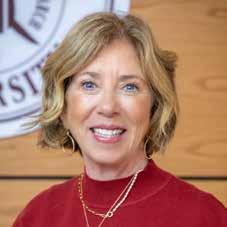
She earned a Bachelor of Science in home economics and child development in 1980 from MSU and is a senior sales advisor for direct sales at Card Connect. Before becoming vice president, she served two terms as a director on the association’s national board for the Mississippi South Region 3. She has long been an MSU Alumni Association volunteer on the Mississippi Gulf Coast, including her role as president of the Harrison-Hancock Alumni Chapter. She now volunteers with activities for the Mississippi Gulf Coast Chapter, such as the Road Dawgs Tour, Gulf Coast Highway cleanup and drawdown fundraiser. Burwell also volunteers with the Alumni Recruitment Network and is a mentor for the Bulldog Network Mentor Program.
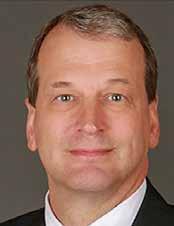
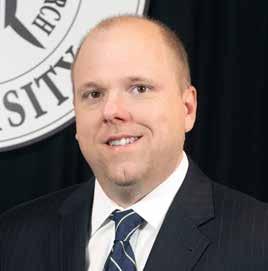
Nelson assumes the vice presidency following his role as the association’s national treasurer since 2019, where he also served as a representative on the MSU Foundation Investment Committee. He previously served the association’s national board as the Mississippi Central 3 Region director and held leadership roles, including multiple terms as chapter president with the
Warren County Alumni Chapter. Nelson earned two degrees from MSU, a Bachelor of Accountancy in 1999 and a Master of Taxation in 2001. He is the managing partner with May and Company LLP. He continues serving the Warren County Alumni Chapter and is a Richard C. Adkerson School of Accountancy Advisory Council member. Dickson, before his new role as national treasurer, served multiple terms on the association’s national board as Out of State Region 1 director. Dickson earned a Bachelor of Business Administration in banking and finance in 1987 from MSU. He is president and CEO of Union Bank and Trust Company in Monticello, Arkansas. Dickson is active in the Southeast Arkansas Alumni Club and is a longtime Alumni Recruitment Network volunteer, encouraging students to attend MSU. He also hosts the annual Southeast Arkansas Send-off Party. Following a twoyear term as president, Terri Russell assumes the office of immediate past president. Russell is a two-time MSU

graduate, earning a Bachelor of Science and a Master of Science in industrial engineering in 1984 and 1986, respectively. She serves as a principal member of technical staff at AT&T Labs Inc. She has been a longtime volunteer with the MSU Alumni Association’s Birmingham, Alabama, Chapter, where she has served in various roles over the past 25 years, including eight years as chapter president. She has been instrumental in student recruiting, community service, scholarship fundraising and coordinating events for alumni in the region. Russell also played an integral role in making MSU license plates a reality in Alabama, and she was honored with the MSU Alumni Association’s 2008 Distinguished Service Award.
Continuing directors include:

Bradley A. Garrison (’00) of Chandler, Arizona, continues as the out-of-state director for Region 1. He most recently served on the association’s national board as the at-large director and previously held the state director position for Texas. Garrison is the divisional sports field category manager for Ewing Outdoor Supply. He has volunteered and taken on various roles with the Nashville, Tennessee, Alumni Chapter and the Kansas City Alumni Club. He is a past president of the Dallas, Texas, Alumni Chapter.
Zwan Landfair (’94) of Woodstock, Georgia, continues as the at-large director. He has served on the national board since 2000 as the Mississippi North 1 Region director. Landfair provides leadership on the operations team for Zimmer Biomet in their Joint Medical Concepts division. He is active in the Alumni Recruitment Network, served as co-chair of MSU’s Black Alumni Weekend 2022 and serves as the current chair of the Black Alumni Advisory Council.

Adrienne Morris (’05) of Columbus will begin a second term as the Mississippi North Region 3 director. She is the district human resources manager for Aramark and the founder and owner of MORR Consulting Group LLC. Morris serves as president of the Lowndes County Alumni Chapter, having previously held the position of vice president. She has been involved with MSU on the communication department advisory board and the Montgomery Leadership Program advisory board. She currently serves as the scholarship chair for the Black Alumni Advisory Council.
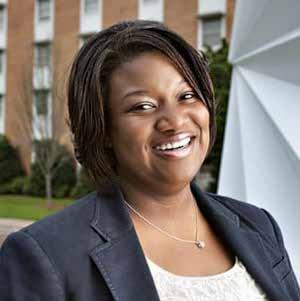
a longtime MSU Alumni Association volunteer and leader in the East Texas Alumni Chapter, where he serves as president. He has held various positions on the chapter’s board and has assisted with the chapter’s scholarship program, send-off parties and student recruiting events.
Stacy Haynes (’01) of Starkville joins the board as president of the Robert Holland Faculty Senate.

Haynes is a professor in the Department of Sociology, and her research focuses on issues related to victimization, sentencing, juvenile justice and criminal justice policy.
Connie Spells Raines (’85) of Conyers, Georgia, will continue her second consecutive term as state director for Georgia. She most recently served as the senior water enforcement officer at the Environmental Protection Agency before retiring after a 30-year career. In 2018, she was the chair of MSU’s Black Alumni Weekend and is actively involved with the Atlanta, Georgia, Alumni Chapter.

Directors new to the board include:
Sophia Barnett (’19) of Starkville joins the board as chair of the MSU Staff Council.
A 2019 graduate of MSU with a Bachelor of Science in Biological Sciences, Barnett serves as a Executive Assistant to the Vice President for Research.

Terry Boyd (’80) of Tyler, Texas, joins the board as the state director for Texas. He is an independent petroleum landman and the owner of T. Boyd Land Services LLC. Boyd has been

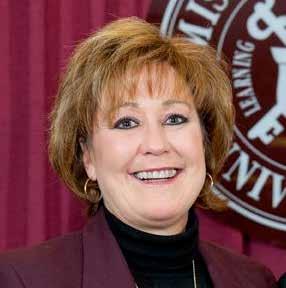
Karen Dugard Lawler (’82) of Madison, Alabama, will join as the representative of the former national presidents on the MSU Alumni Association board of directors. She recently retired from NASA, where she served as a financial management specialist and contracting officers representative in the Office of the Chief Financial Officer at Marshall Space Flight Center. She served as national president in 2010-11 and served nine years on the national board. A long-time volunteer with the Huntsville-Decatur chapter, she has served as treasurer, vice president and president.
The MSU Alumni Association was founded on June 17, 1885, by the first three graduating classes of the Mississippi Agricultural and Mechanical College. A full-service organization, it now includes nearly 100 chapters and clubs serving Mississippi State University’s more than 169,000 living alumni.
For more information about the MSU Alumni Association, contact Davis at 662-325-7000 or jdavis@alumni. msstate.edu. n



MSU Alumni Association HONORS FACULTY, STAFF
Mississippi State honored its exceptional faculty and staff with annual awards for their outstanding teaching, mentoring, advising and contributions to the university’s students.
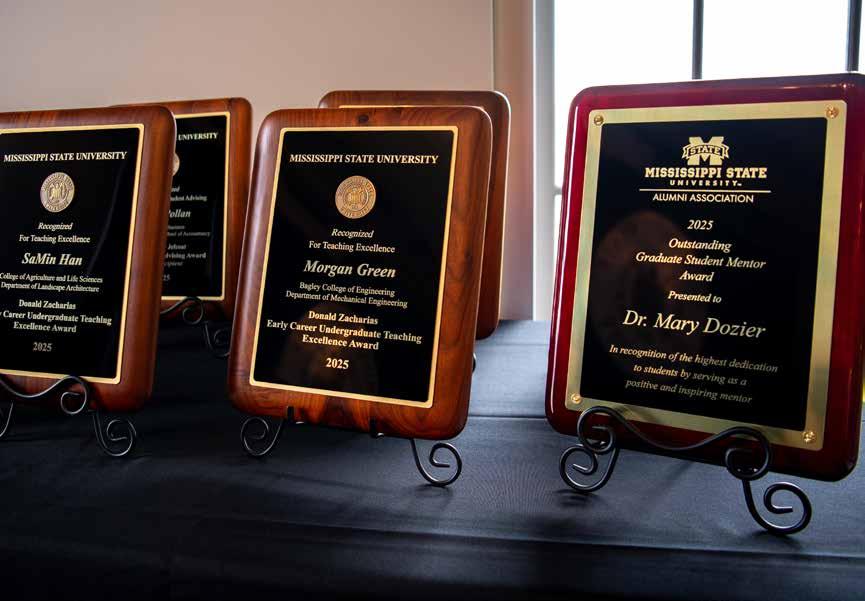


L-R: MSU Assistant Professor Mary Dozier, Outstanding Graduate Student Mentor Award; MSU Alumni Association Executive Director Jeff Davis, and Associate Clinical Professor Dr. Marc Seitz, Graduate and Professional Teaching Excellence Award. (Photo by Grace Cockrell)
Alumni Association Outstanding Graduate Student Mentor Award
Mary Dozier, assistant professor, Department of Psychology, College of Arts and Sciences
Alumni Association Graduate and Professional Teaching Excellence Award
Dr. Marc Seitz, associate clinical professor, Department of Clinical Services, College of Veterinary Medicine
2025 Donald Zacharias Early Career Undergraduate Teaching Excellence Award
Abigail Good, instructor, Department of Mathematics and Statistics, College of Arts and Sciences
Morgan Green, assistant teaching professor, Michael W. Hall School of Mechanical Engineering, Bagley College of Engineering
SaMin Han, assistant professor, Department of Landscape Architecture and Environmental Design, College of Agriculture and Life Sciences
Center for Distance Education Online Teaching Excellence Award
Liza Bondurant, associate professor, Department of Teacher Education and Leadership, College of Education
Irvin Atly Jefcoat Excellence in Advising Award Staff Recipient
Trina Pollan, academic coordinator, Adkerson School of Accountancy, College of Business
Irvin Atly Jefcoat Excellence in Advising Award Faculty Recipient
Terri Hernandez, assistant professor, Department of Communication, College of Arts and Sciences
Wesley A. Ammon Outstanding New Staff Advisor Award
Taylor Watson, academic coordinator, College of Business
Foil-Wyatt Outstanding New Faculty Advisor Award
Jessica Benson, assistant professor, School of Human Sciences, College of Agriculture and Life Sciences


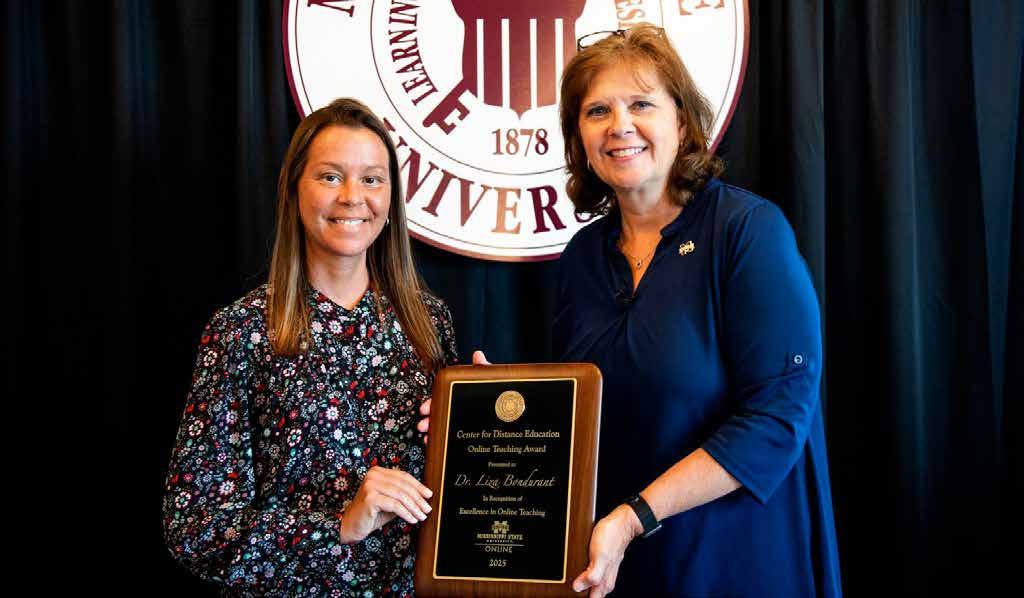

L-R: Associate Vice President for Academic Affairs Jim Dunne with 2025 Donald Zacharias Early Career Undergraduate Teaching Excellence Awardees, Morgan Green, assistant teaching professor; Abigail Good, instructor; and SaMin Han, assistant professor. (Photo by Grace Cockrell)
L-R: Associate Professor Liza Bondurant, Center for Distance Education Online Teaching Excellence Award, and College of Professional and Continuing Studies Dean Susan Seal. (Photo by Grace Cockrell)
L-R: Assistant Professor Terri Hernandez, Irvin Atly Jefcoat Excellence in Advising Award Faculty Recipient; Assistant Professor Jessica Benson, Foil-Wyatt Outstanding New Faculty Advisor Award; Academic Coordinator Trina Pollan, Irvin
Atly Jefcoat Excellence in Advising Award Staff Recipient; Academic Coordinator Taylor Watson, Wesley A. Ammon Outstanding New Staff Advisor Award; and Executive Vice Provost Peter Ryan. (Photo by Grace Cockrell)
BULLDOGS IN THE CITY
Alumni and friends of Mississippi State celebrated during delightful picnics in New York City and Washington, D.C., hosted by the Mississippi Society of DC and the Mississippi Society of NYC, respectively. Attendees enjoyed delicious food, camaraderie and shared pride for their cherished state and alma mater.
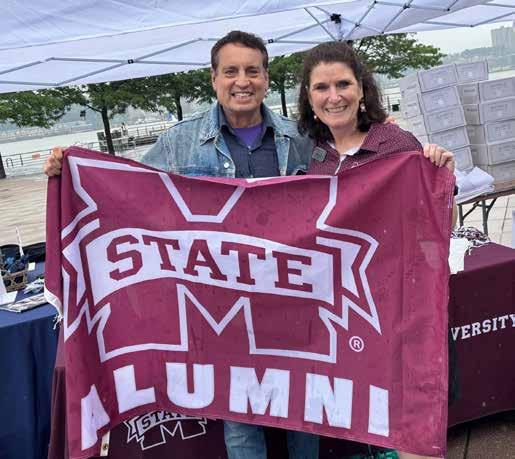



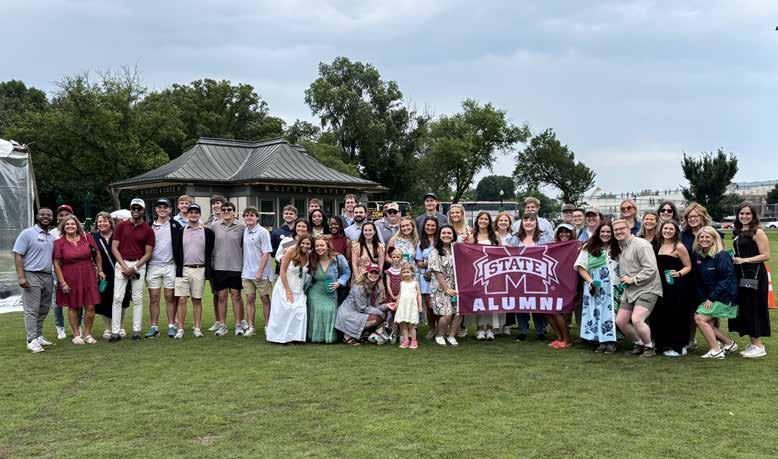
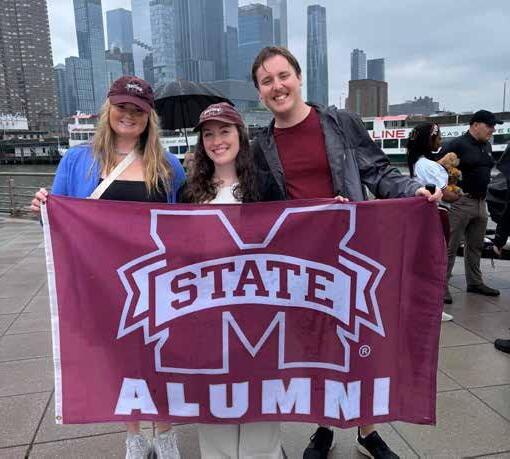

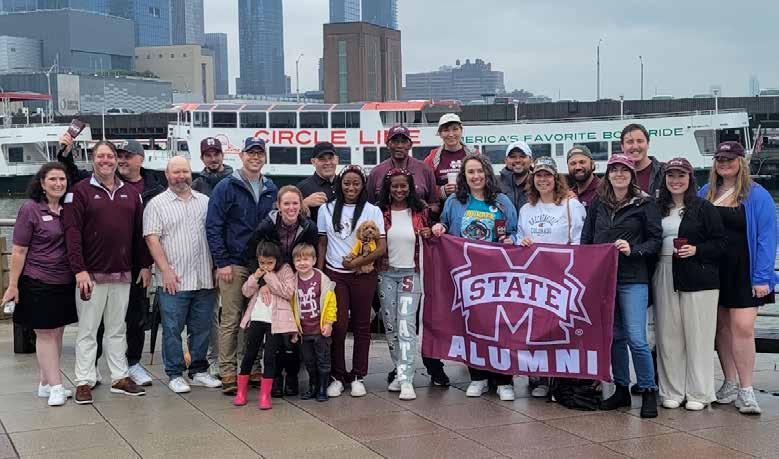

SENIOR CELEBRATION
The MSU Alumni Association hosted its annual spring Senior Celebration at The Mill prior to spring commencement. More than 500 graduating seniors celebrated with lively music, delicious food, fun photo opportunities, exciting door prizes and an overall atmosphere of joy as the alumni association embraced them as the soon-to-be newest members of the alumni family. Congratulations to the spring 2025 graduates!


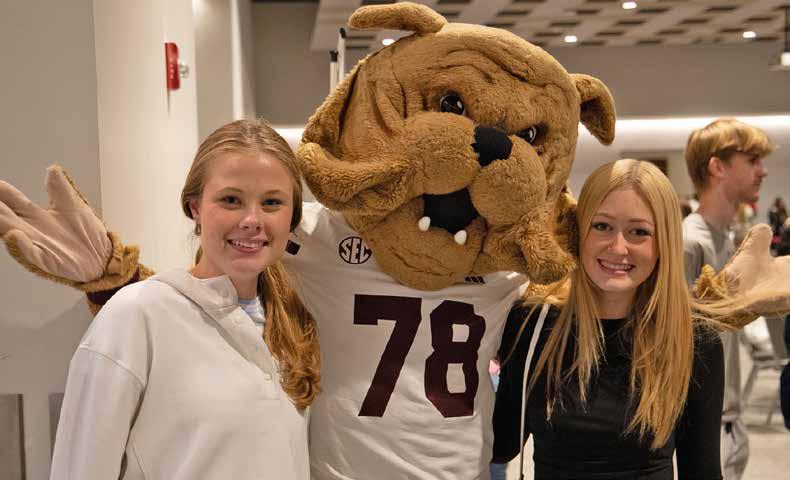
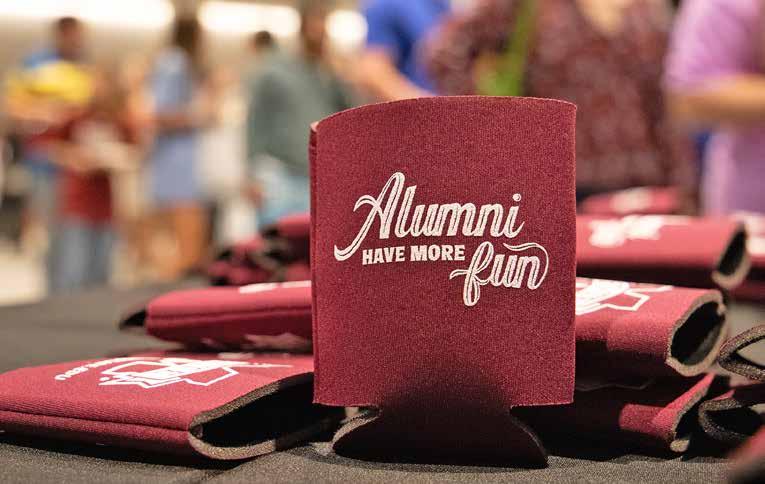
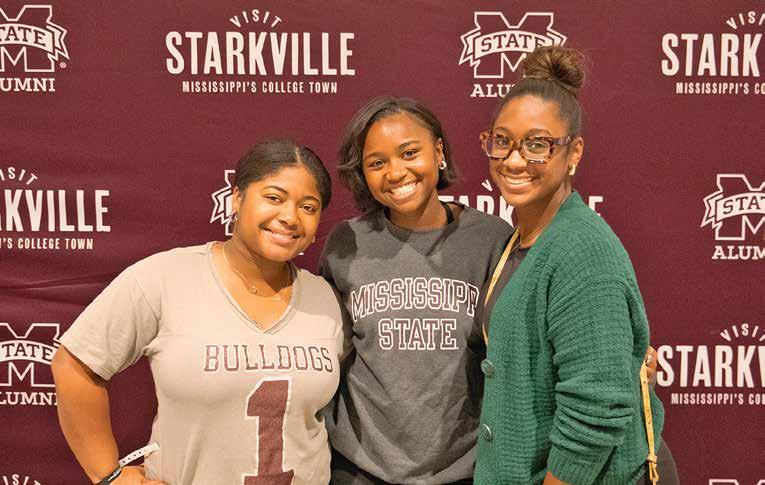

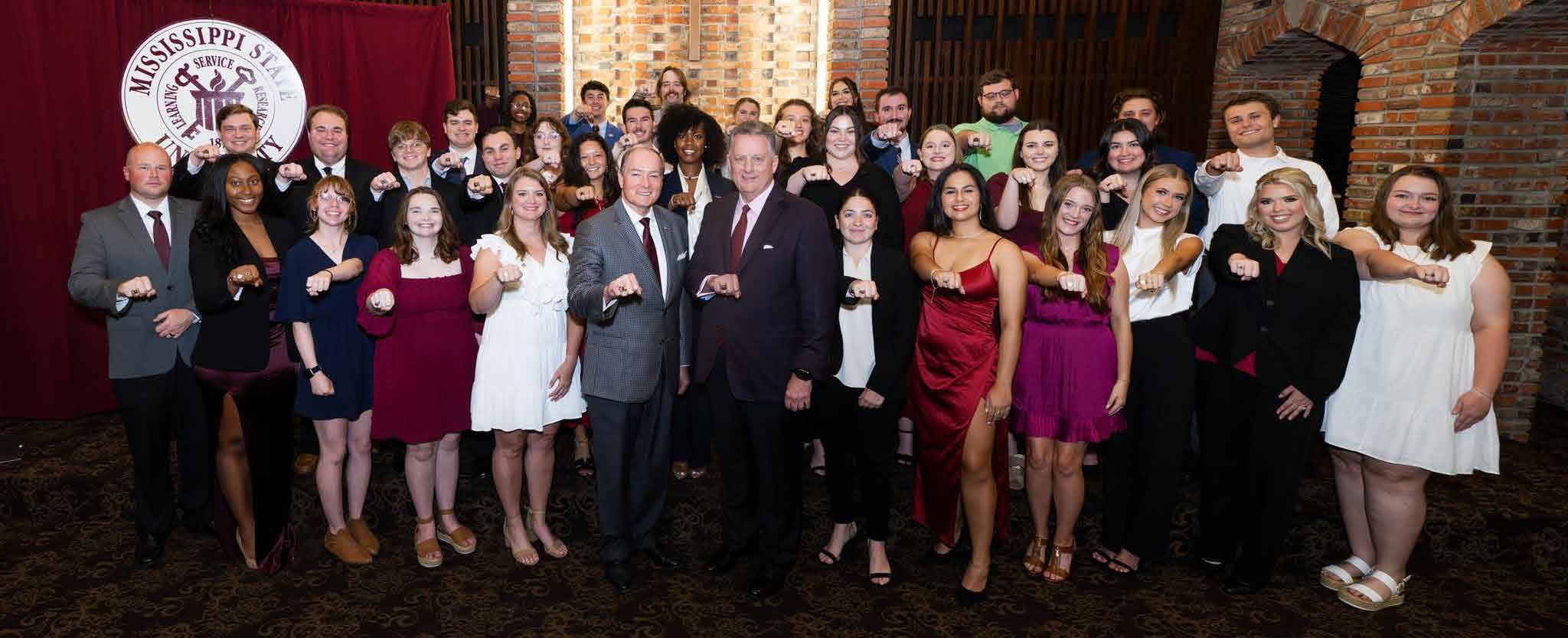
Spring Ring Ceremony
The MSU Alumni Association hosted the official Ring Ceremony at the Chapel of Memories in May. Held twice a year, before the fall and spring commencement ceremonies, the Ring at MSU is a cherished tradition for presenting official university class rings. MSU President Mark E. Keenum spoke and presented the participants their rings. MSU’s
Former National Presidents
Former national presidents of the MSU Alumni Association gathered at The Mill for Former National Presidents Day. They heard updates from the association and the university, took facility tours and enjoyed opportunities for fellowship. This group is recognized biennially for their dedicated service. Those in attendance included:
Front Row: L to R: Jackie Ford, Allen Maxwell, MSU Alumni Association National President Terri Russell, Sherri Carr Smith, B.B. Hosch, Mississippi State University President Mark E. Keenum. Second Row: Former MSU Alumni Association Director Charlie Weatherly, Walter Becker Jr., Camille Scales Young, Bill Long,
ROTC and Black Voices Gospel Choir also gave special presentations during the ceremony. The MSU Alumni Association recognized dedicated alumnus Jay Pryor as the spring ring honoree. Pryor, a 1979 graduate in petroleum engineering, recently retired as vice president of Chevron Corporation after a 40-year career with the organization. If you or someone you know is interested in a class ring, please contact the MSU Alumni Association at info@alumni.msstate.edu

A.D. Hunt, Lamar Conerly. Third Row: David Jones, Ron Black, Tommy Roberson, Steve Taylor, Clay McWilliams. Back row: Robby Gathings, Ronnie
Walton, Ret. Maj. Gen. Janson D. Boyles, MSU Alumni Association Executive Director Jeff Davis.
Telling Our Story Alumni Recruiting Network lets Bulldog family spread the Maroon word
By Kevin Tate
As alumni of Mississippi State University, our graduates are uniquely suited to share the excitement of potential college students, because they’ve experienced it for themselves.
Time passes and trends come and go, but the core of the college experience is enduring. Connecting alumni to potential students is a great way to welcome new members of the Bulldog family into their new and forever home. The MSU Alumni Association can help you reach out and make a real difference as a member of the Alumni Recruiting Network, one of the many available volunteer opportunities.
As a member of the Alumni Recruiting Network, you can volunteer to be a Maroon Mail Writer, join Bully’s College Fair Crew, or speak to potential students directly as a Hail State Event Rep or featured speaker at an event.
Our Maroon Mail Writers pen cards for students who have received their acceptance letter to Mississippi State. The note cards and a sample text are provided, while the volunteering alumni adds a personal touch and the postage.
The value of a handwritten note extends well beyond the message itself. As writing letters by hand has fallen increasingly out of custom, these personal notes have grown even more meaningful. They are a powerful tool for building relationships, because they offer a tangible connection and personal
touch to go along with the message itself. Representatives who volunteer to be part of Bully’s College Fair Crew attend their local high schools’ events, help host the Mississippi State table, and interact with students and their parents, answering questions and making connections to help with the decision process. The MSU Alumni Association makes sure each volunteer host is equipped with appropriate literature and the answers to most basic questions. They also have resources for students who follow up with more specific queries. Events like these help introduce students to Mississippi State, affording them opportunities to explore a school they might not previously have considered, and making them aware of the wide array of majors and disciplines for which our university is known.
As a Hail State Event Rep or the speaker at an event, alumni attend high school awards days to deliver certificates conferring certain scholarships upon graduating seniors. They may be invited to say a few well-chosen words about Mississippi State and about the scholarship in particular. In all cases, the MSU Alumni Association takes care to send the volunteer afield with everything they need to speak knowledgeably and confidently about the subject in question.
Visit www.alumni.msstate.edu to learn more or volunteer. n
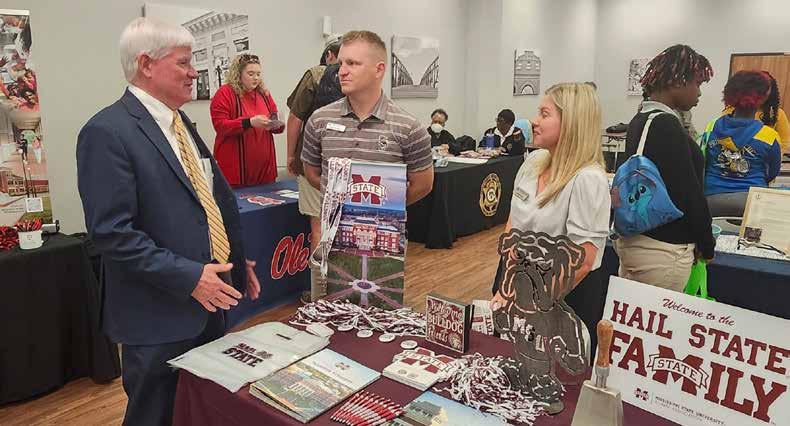

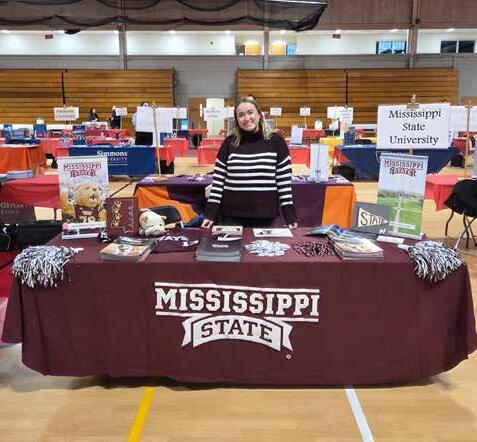
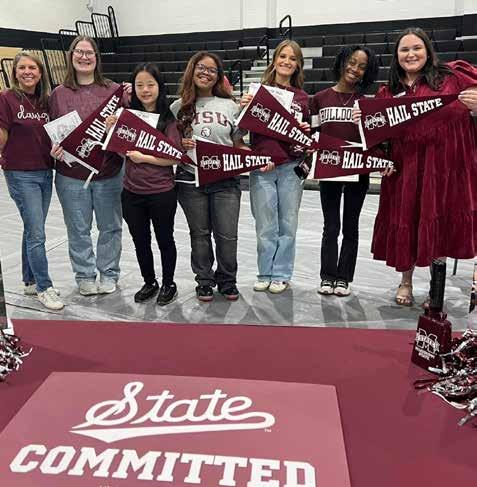


Legacy Receptions
Mississippi State University welcomed new Bulldogs during the Legacy Receptions at The Mill. Students and their devoted parents enjoyed delicious food and entertainment in a friendly, family-oriented atmosphere. The MSU Alumni Association hosts Legacy Receptions to help new students and their parents—regardless of whether the parents are MSU alumni—celebrate the start of their Bulldog experience.
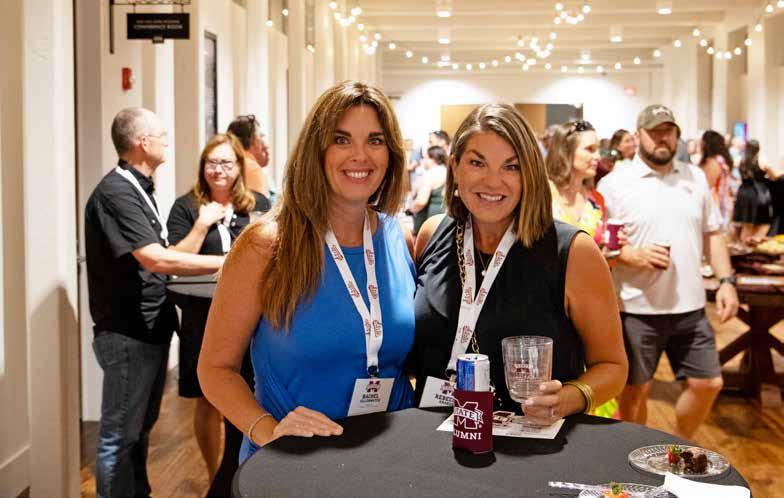
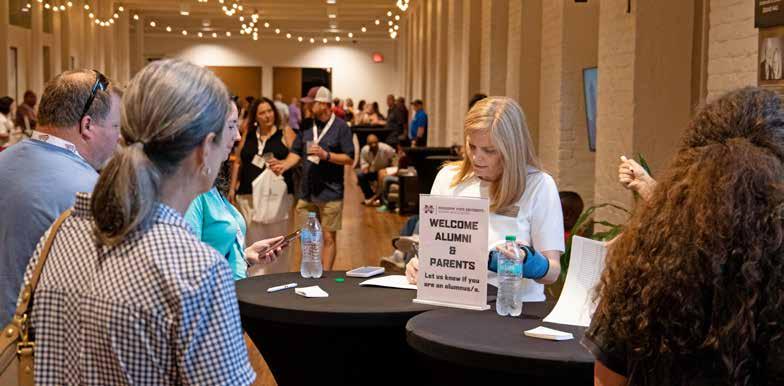



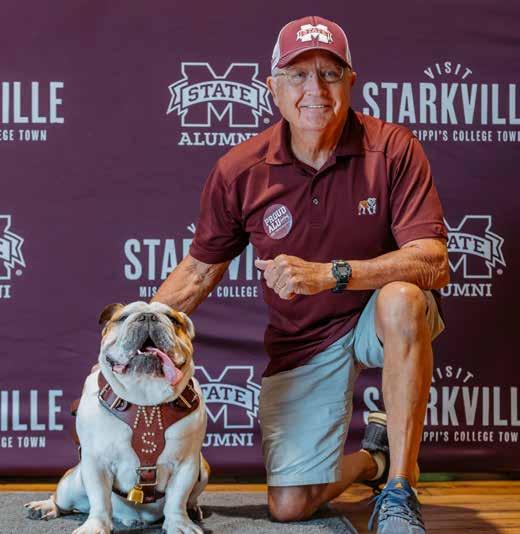


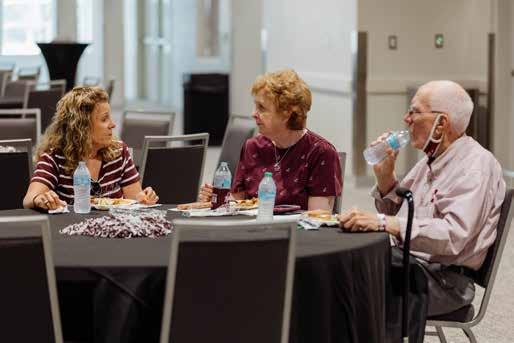

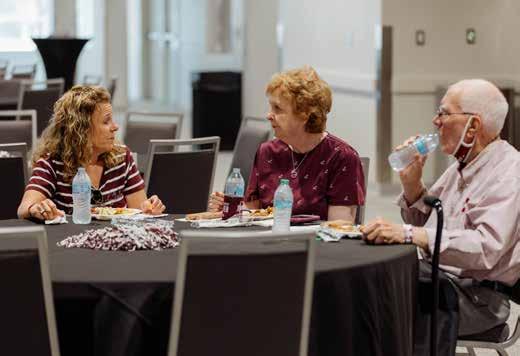
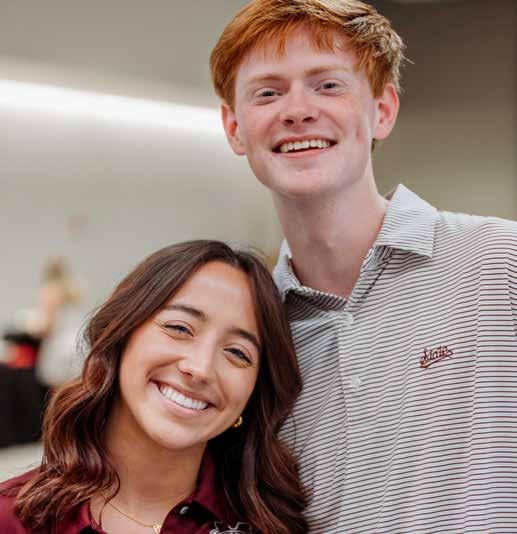
Last year, alumni and friends gathered at The Mill on football Saturdays for the MSU Alumni Association’s pregame tailgate events. These gatherings were a great way to celebrate our Bulldog pride and support our coaches and players. This year, we’re hosting more exciting tailgates during four Bulldog home games! Football season at The Mill is the perfect time for food, fellowship, and fun. Get your tailgate tickets on our website today.


ALUMNI ASSOCIA T ION






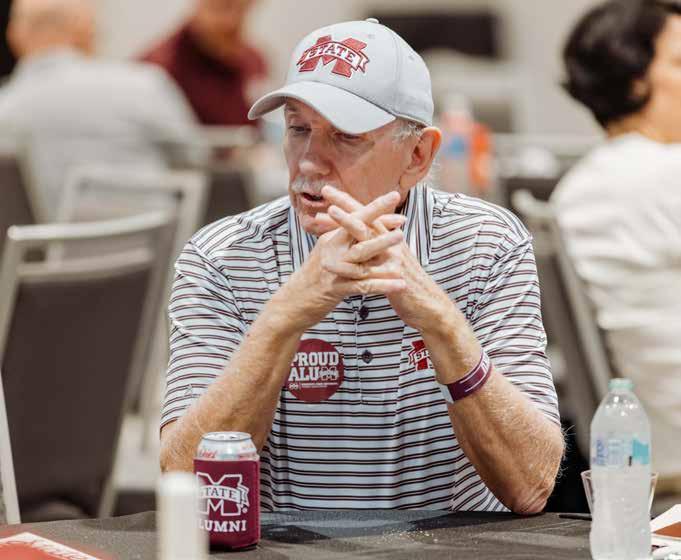
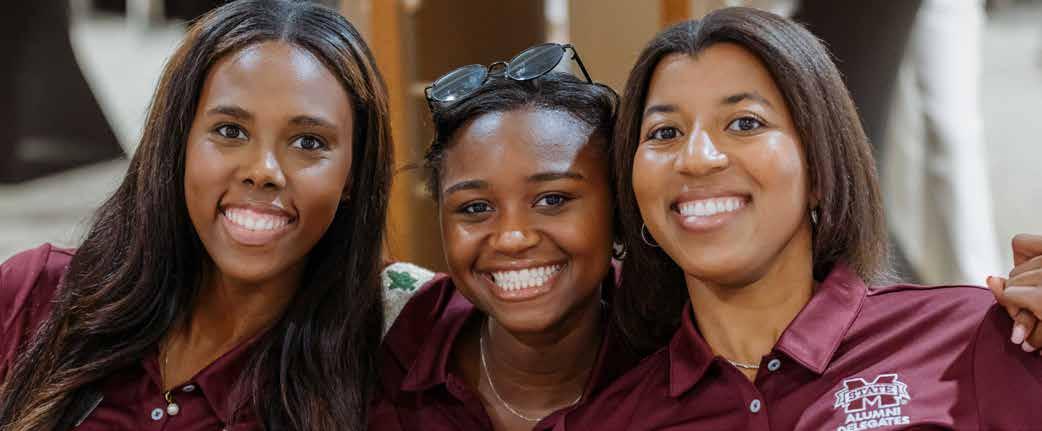

Traveling Bulldogs Reunion
The spirit of adventure was alive and well as nearly 175 alumni and friends gathered at The Mill for the inaugural Traveling Bulldogs Reunion Event—a celebration of past journeys and the potential for future adventures.
This reunion marked a milestone for the program, which began in the late 1970s and continues to grow. Attendees included former travelers who have created memories around the globe and newcomers interested in traveling with the MSU Alumni Association. Guests enjoyed brunch, shared stories and visited with surprise guest Bully, who brought a special dose of Bulldog spirit to the occasion.
The MSU Alumni Association’s Traveling Bulldogs program collaborates with eight tour partners to offer customized tours for alumni and friends. Tour partner representatives participated in the event and showcased the upcoming season's trips. Guests received an exclusive first look at the 2026 Traveling Bulldogs tour lineup, featuring 43 curated trips across all seven continents. Attendees were entered into a drawing for travel voucher giveaways, with Orbridge concluding the event by giving away a free trip to Alaska.
The reunion served as a clear reminder that Traveling Bulldogs is about more than just seeing the world—it is about building community, exploring new cultures and creating lasting memories together. Travelers not only have fun, but our specially designed tours also promote educational and cultural experiences that enrich alumni and friends during their journeys. Whether you are a seasoned traveler or dreaming of your first alumni trip, there has never been a better time to join us in painting the globe maroon and white. n
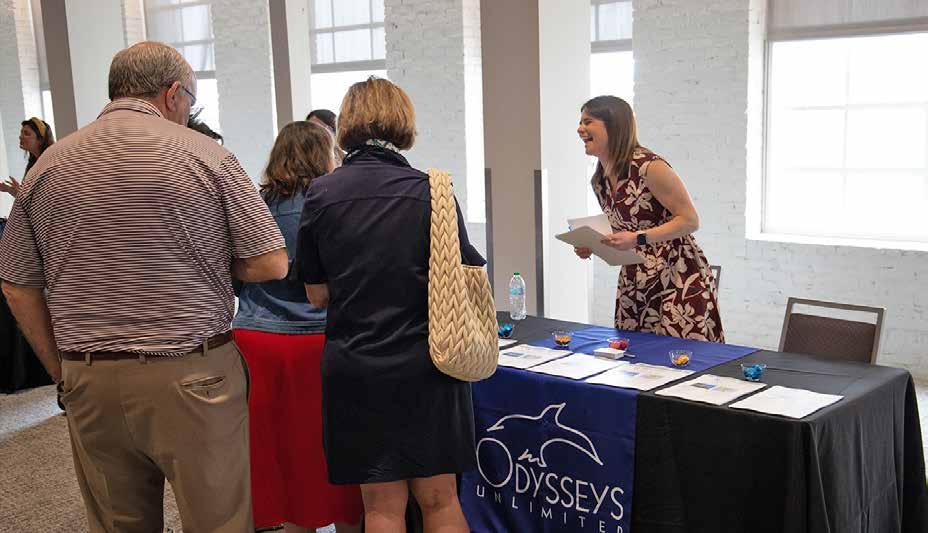
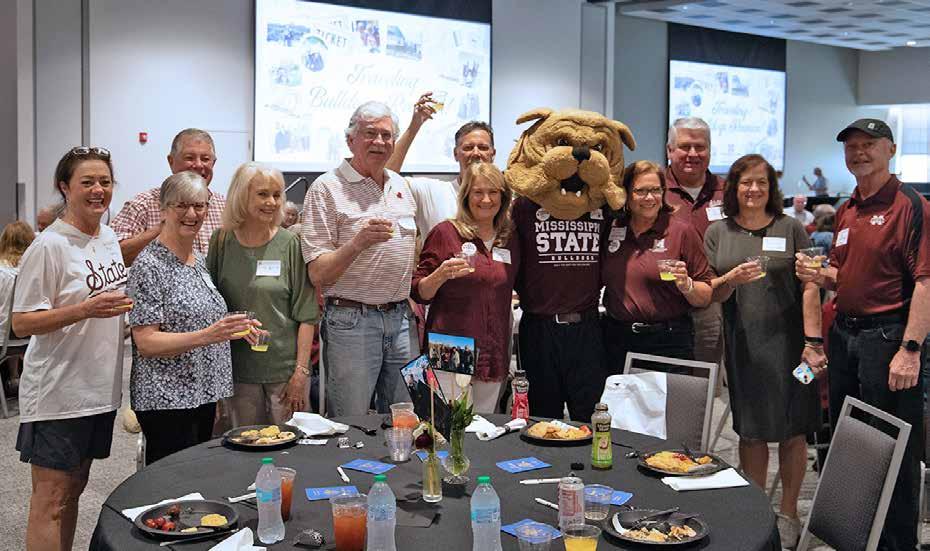
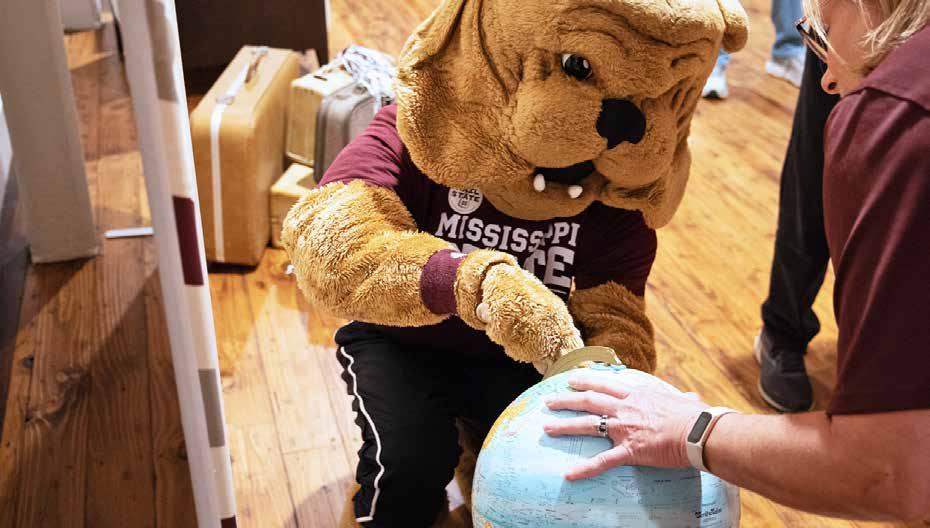

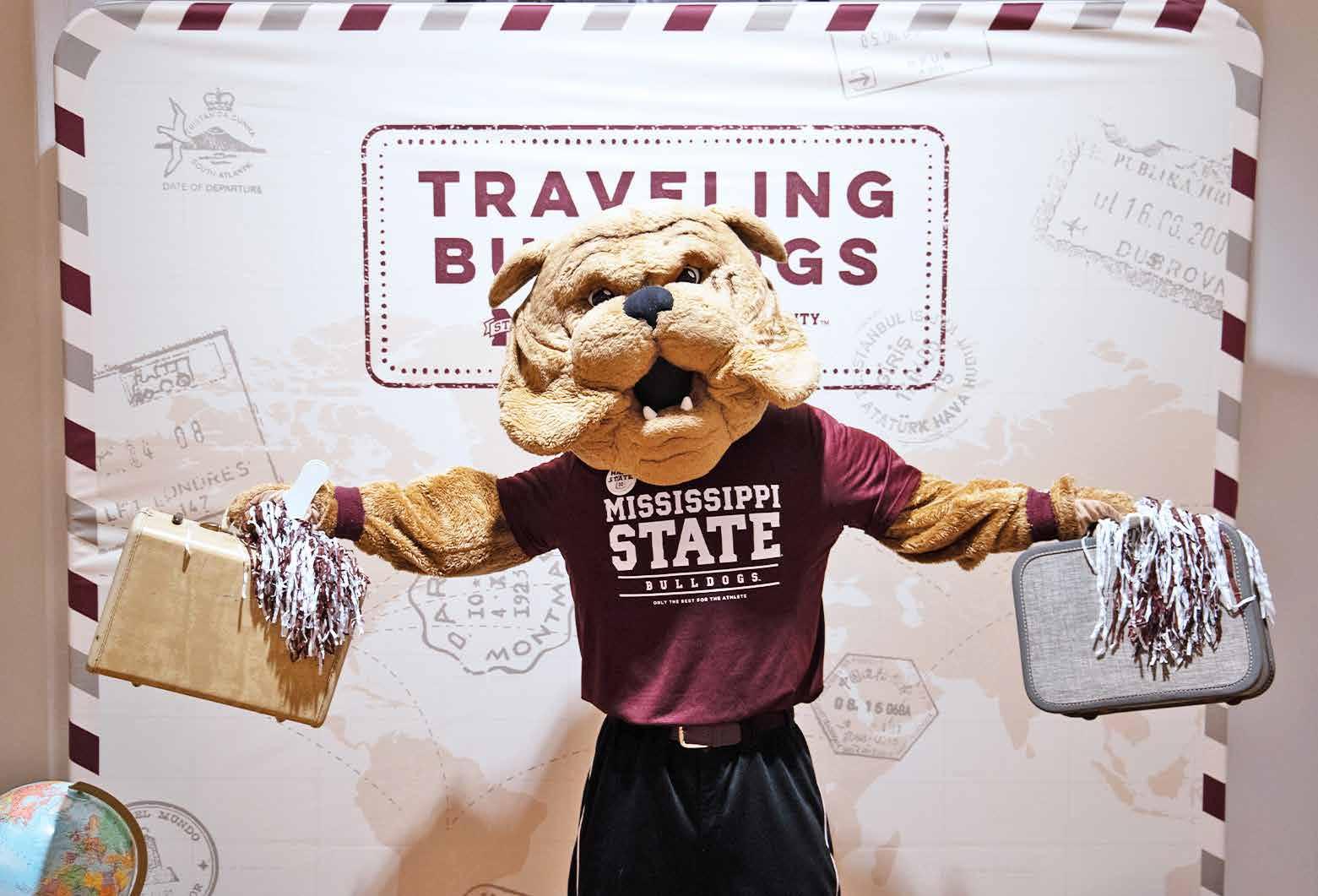
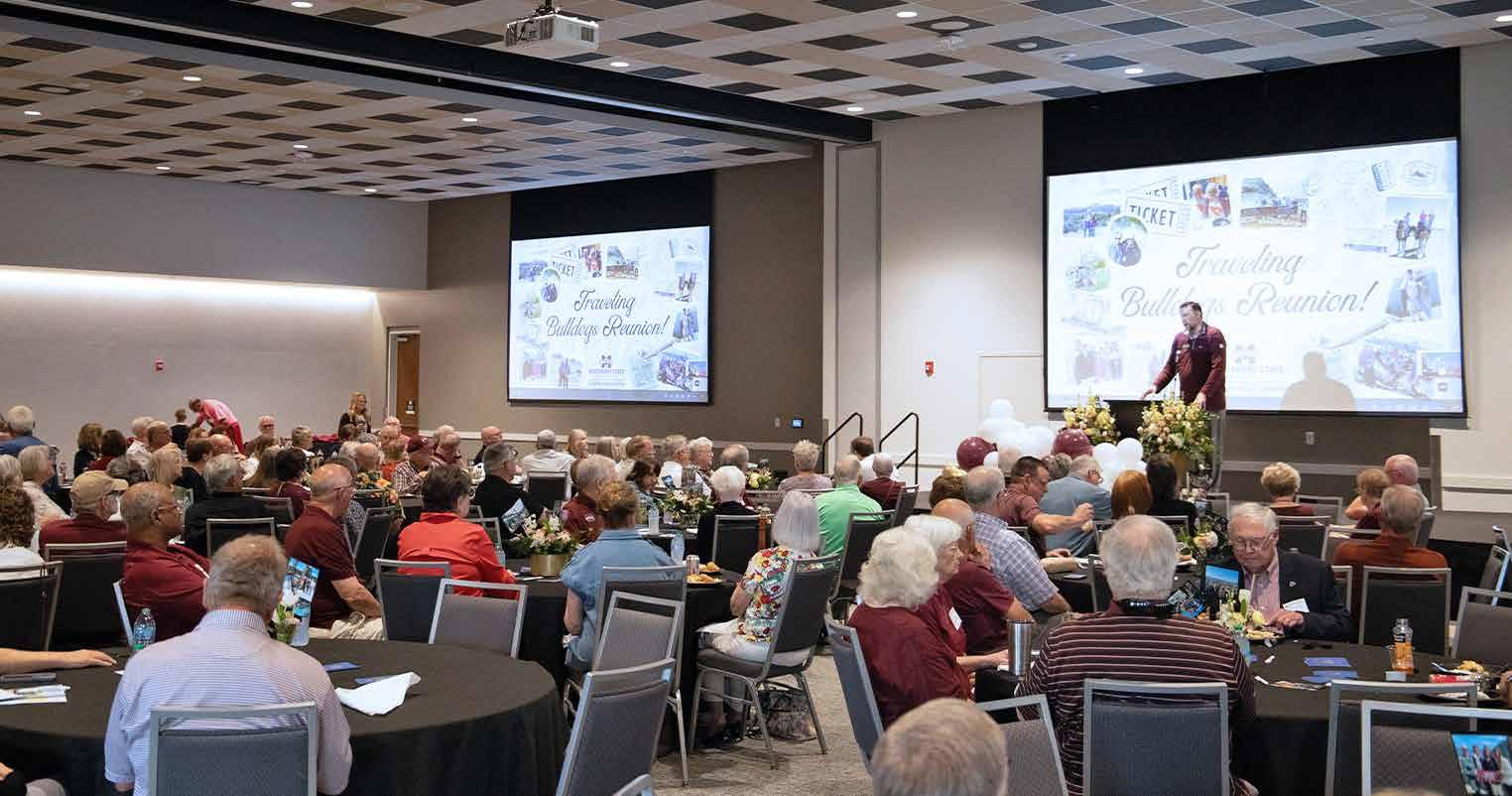
Volunteers fill a number of roles in helping Mississippi State University thrive and grow. Working through chapters of the Mississippi State University Alumni Association, alumni volunteers serve every county of the state and in 21 states beyond the Mississippi line.
Working in teams or as individuals, Bulldog alumni plan and host MSU events, serve as MSU representatives, work as reunion contacts, operate chapters and clubs, work with the Alumni Recruitment Network, and serve on an alumni advisory council or on the national board of directors.
“We have volunteers who began volunteering 26 years ago,” said Michael Richardson, MSU Alumni Association assistant director for regional and volunteer engagement. “In some cases, they took time off of volunteering when their lives got too busy, then took it up again when time allowed. It’s a chance to interact with fellow alumni and work for the love of giving back to the university that gave us so much.”
Janet Downey, who is the association’s coordinator of volunteer engagement, said that’s the beauty
OPPORTUNITIES CONNECT NEW, RECONNECT EXISTING BULLDOGS
By Kevin Tate
of serving as an alumni volunteer: flexibility to help as much, as little and in whatever way fits your life.
“We have opportunities to fit every shape and style of time and talent,” Downey said. “There are different areas in which to serve and different ways and types of opportunity to serve in each.”
Richardson said that if a Bulldog wants to serve, the MSU Alumni Association is there to help find the right job for that person’s strengths.
“Not everyone can be an alumni chapter president, and not everyone would want to,” Richardson said. "We oversee nearly 100 chapters in the nation, and there are lots of volunteer opportunities available in each one of them.
“If you’re in an area with an alumni group, we can connect you to your local chapter so you can explore all the local opportunities,” Richardson continued. “If you’re in an area without an alumni group, we can connect you to fellow alumni and prospective students in many other ways.”
Visit alumni.msstate.edu to learn more or to contact the MSU Alumni Association. n
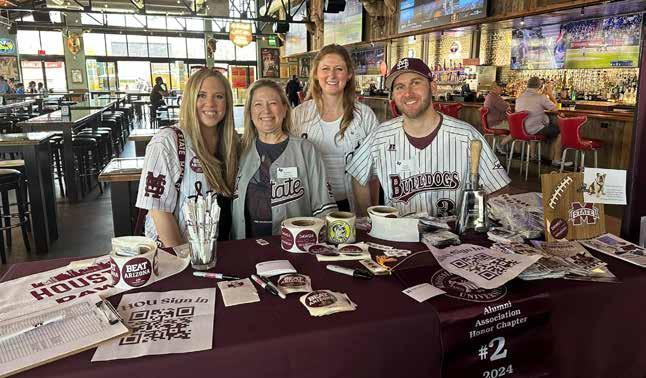
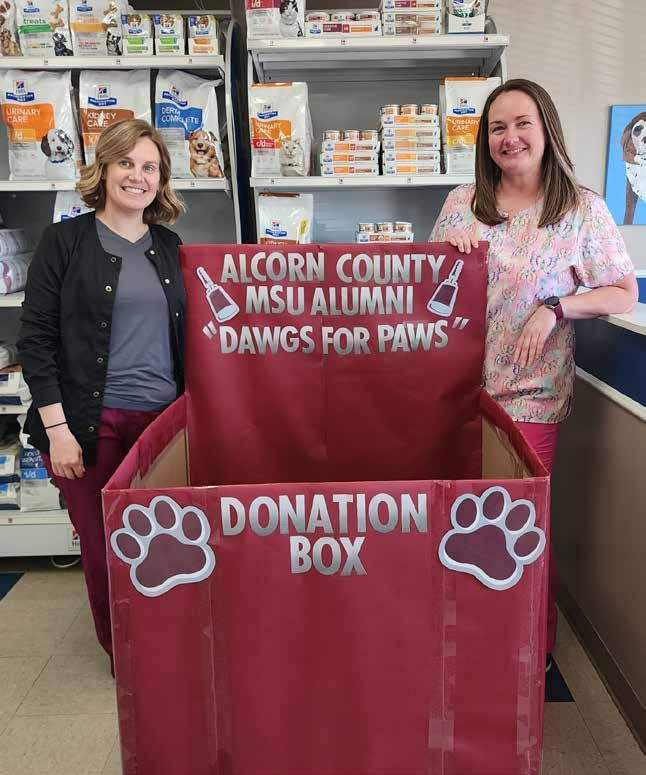


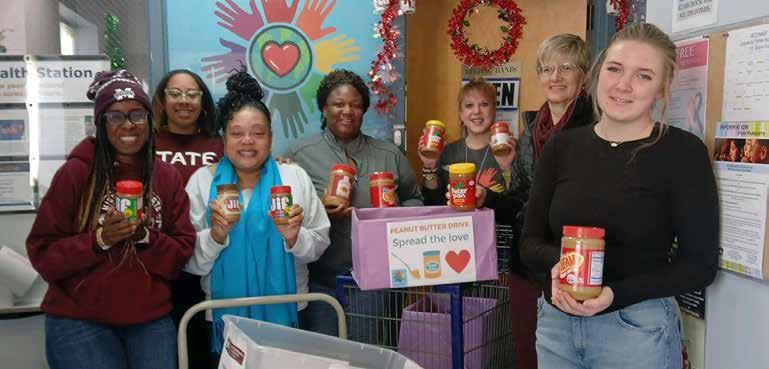

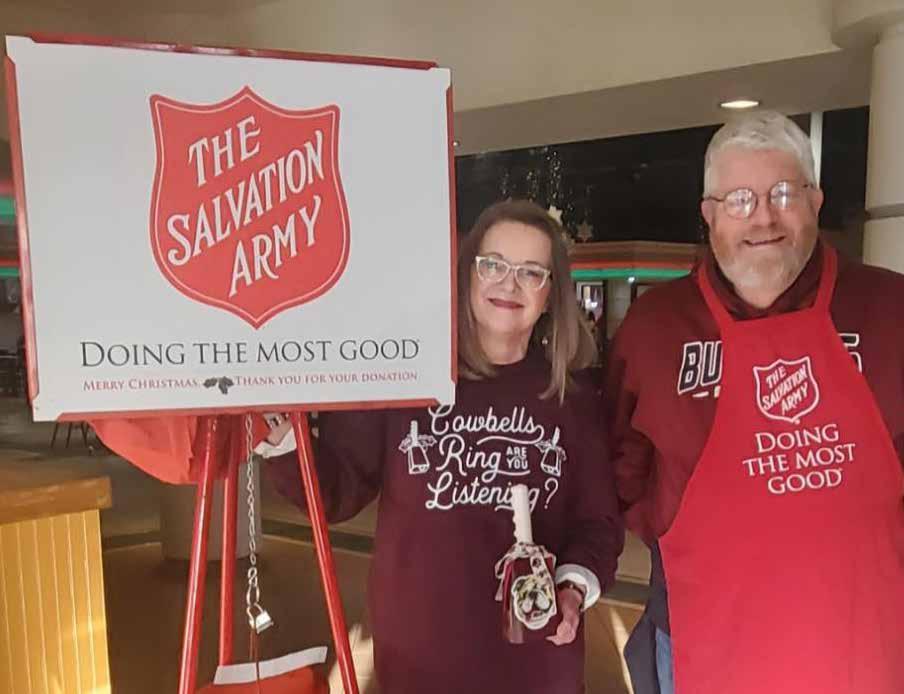

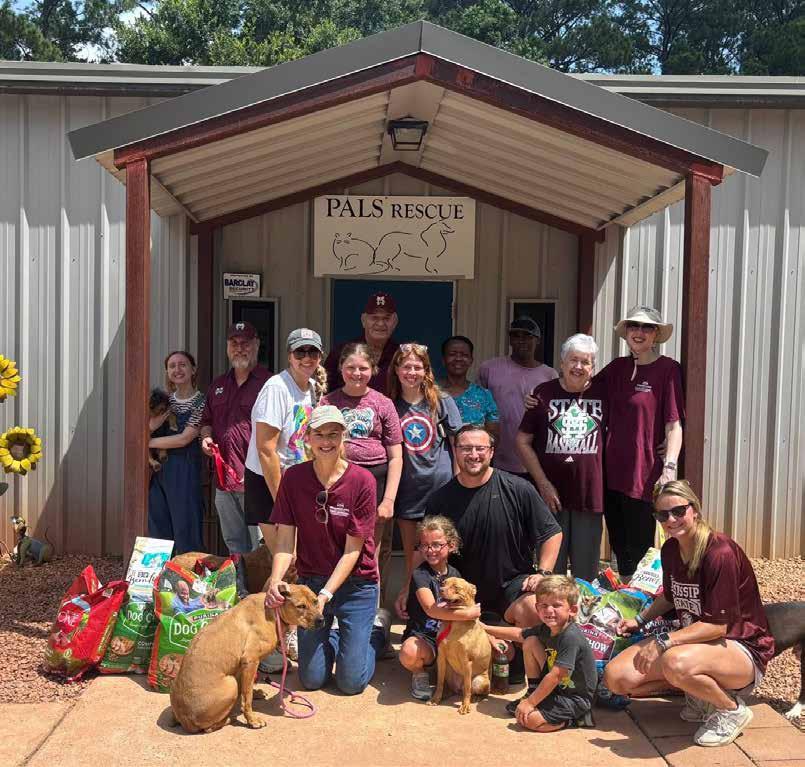
EMBARK ON AN

Traveling Bulldogs 2025 & 2026 Trips
The MSU Alumni Association sponsors trips across the globe through the Traveling Bulldogs program. Itineraries are booked through 2026. Explore our website for more details at alumni.msstate.edu/travel or contact the MSU Alumni Association at 662.325.7000.
Invite your friends and family, and start crossing destinations off your travel bucket list!
Scan Me

Booking Trips for 2025 & 2026 *
NOVEMBER 2025
Douro River Voyage
Macy's Thanksgiving Day Parade
DECEMBER 2025
Iceland and The Northern Lights
Holiday Markets Along the Rhine Christkindlmärkte Along the Danube River
Montreal & Quebec City
Christmas Markets
JANUARY 2026
Expedition to Antarctica | Journey to the Earth’s Last Frontier
Costa Rica's National Heritage
FEBRUARY 2026
Finland: Arctic Magnificence
The Luxurious Caribbean Sea
The Galapagos Islands
MARCH 2026
A Collector's Treasure: Australia & New Zealand
Portrait of Italy
Discover Egypt & the Nile Valley
Hawaii Three Island Adventure
APRIL 2026
Village Life Cotswolds
Enchanting Ireland
Across Spain and Portugal
Celtic Greens and Coastal Fairways
Espionage & Intelligence: The Allied Secret Agents & Codebreakers of WWII
MAY 2026
Isles of the Mediterranean
Cruise the Norwegian Fjords
Great European Journey
Masters of the Air: The Mighty Eighth
Over The Skies of Europe
Greece / Athens & Kalamata

JUNE 2026
Swiss Alps & the Italian Lakes
National Parks & Lodges of the Old West
Kenya Safari: The Big Five
Historic Baseball Tour
Easy Company
Battle of Normandy and the Liberation of Paris
JULY 2026
Majestic Vistas & Wildlife
Scandinavia and the Baltic Sea
Discover the Canadian Rockies by Rail
AUGUST 2026
Northern Italy
Exploring Iceland
African Expedition by Private Train
SEPTEMBER 2026
Scotland: Highlands and Islands
Landscapes & Lighthouses of Coastal Maine
Great Trains & Grand Canyons
OCTOBER 2026
Rivieras of France & Italy
Intriguing India
Bali, Singapore, Thailand & Angkor Wat
NOVEMBER 2026
Macy's Thanksgiving Day Parade
DECEMBER 2026
A Royal English Christmas
Holiday Markets
Montreal & Quebec City Christmas

Bill and Karen Kern Hudnall shared more than five decades together, dedicating their careers to education and shaping countless lives along the way.
The lasting impact of kindness ALUMNUS
CAREER, GIFT, ENABLE STUDENTS TO FIND THEIR PATHS
By Kevin Tate
Bill Hudnall has made changing lives his life’s work. As a school counselor, he helped hundreds of young men and women land scholarships, locate jobs and navigate challenges. His work has made an impact every day.
During his career, every moment mattered, and now, thanks to his planned gift, those moments always will. His estate will create three endowments in the Hudnall family name to help others follow the path to service and excellence that so captured and rewarded him.
“You think many times as a counselor, ‘What impact am I having on these kids?’ but, countless times over later years, I’ve run into former students who’d say something that blew me away,” Hudnall said. “They’d
mention how I had really helped them get through a tough time, or that I’d made a big, lasting difference in their lives with an
“It’s hard to explain to people what it means to have had the experience of growing up and growing into the Mississippi State family. There’s an atmosphere and a spirit at MSU that just doesn’t exist many other places.”~ Bill Hudnall
interaction I only remember as minor. That, more than anything, told me I’d been in the right profession. It also tells you something about how far a small kindness can go.”
Hudnall grew up in the Prairie community north of West Point in northeastern Mississippi. He graduated high school at 16, started college at Itawamba in Fulton, then transferred to Mississippi State.
“MSU allowed me to blossom,” Hudnall said. “I matured a lot, and the family at Mississippi State had a great deal to do with that.”
Hudnall’s undergraduate education led him on a path toward coaching but, as he traveled that road, something didn’t feel just right. A conversation with a friend led him to consider the role of counselor.
“My friend was a school counselor and he tried to explain the job and the career by describing the sort of people who go into it,” Hudnall said. “Finally, we reached a point
in the conversation where I knew in my heart the candidate he was describing was me.”
As he looked into the career path, he saw he could do a job that would make a lasting difference for people. At that time, in the late 1960s, one of the foremost institutions for graduate studies in counselor education was in Commerce, Texas, so he enrolled at East Texas State University. There, in a small town 40 miles northeast of Dallas, he met Karen Kern, who he married and treasured for 52 years. Both earned degrees from ETSU, and the two later returned to Mississippi State where each earned further degrees.
“You think many times as a counselor, ‘What impact am I having on these kids?’ but, countless times over later years, I’ve run into former students who’d say something that blew me away… That, more than anything, told me I’d been in the right profession. It also tells you something about how far a small kindness can go.”~ Bill Hudnall
Hudnall ultimately completed his doctorate in counseling and guidance at Mississippi State in 1979, and the two spent the largest share of their careers with the students of Cooper Independent School District, located 90 miles northeast of Dallas. While Bill was a counselor, Karen taught elementary school and, later, served as the school’s librarian.
The Hudnall Family Undergraduate Endowed Scholarship in the College of Education will help students pursuing an undergraduate degree. The Hudnall Family Graduate Endowed Scholarship in Counselor Education will help those seeking to follow the career path Hudnall chose. The Hudnall Family Excellence Endowment in Baseball will assist the growth and development of the Bulldog baseball team.
“It’s hard to explain to people what it means to have had the experience of growing up and growing into the Mississippi State family,” he said. “There’s an atmosphere and a spirit at MSU that just doesn’t exist many other places. It’s been important to me and an important part of who I am all my life.” n

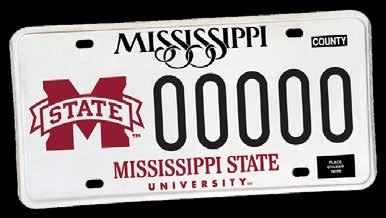
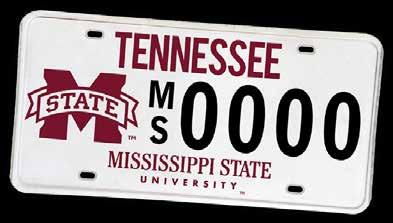
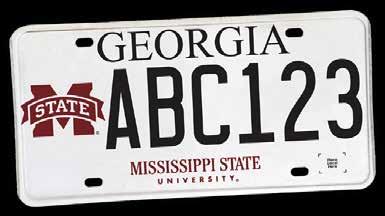




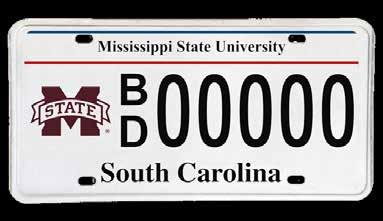
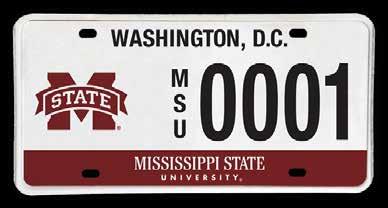

UNDER THE SAME SUN Production of protein, power compatible on same ground
By Kevin Tate
The study and advancement of modern agriculture is all about improving sustainability. A gift from Wayne and Alice O’Quin will help Mississippi State University push those pursuits into the light of a new day.
“The O’Quins are contributors to society in the truest sense of that word,” said Jeff Little, senior director of development for the Bulldog Forest program. “Their interests in conservation, combined with their generosity, will have an impact for generations. They are making the world a better place.”
Wayne grew up near Osyka, in Pike County. He earned a degree in chemical engineering from Mississippi State in 1959 and enjoyed a 38-year career with TotalEnergies, a company that specializes in oil and biofuels, natural gas, green gasses, renewables and electricity. He served as a plant manager for 26 years at facilities in Kentucky, Oklahoma and Texas. His wife, Alice, grew up in Brooklyn, New York and had a long career in hospital management in Kentucky and Texas.
In 2000 the O’Quins retired to Galveston, Texas, and in 2008 they donated a tract of land with great potential to MSU’s Bulldog Forest program. The 127-acre swath of timbered soil in Pike County had been in Wayne’s family since 1900. It is now under management as a wildlife habitat by Mississippi State’s College of Forest Resources and has grown to be a haven for fauna and flora alike.
Both Wayne and Alice are Texas Master Naturalists. Sustainability of the world’s wild, quiet places has long been a passion for them. Specifically, they are interested in maximizing what the land can produce. That’s where their latest gift to Mississippi State comes in—the science of agrivoltaics, the practice of using the same land for both solar photovoltaic energy generation and agriculture.
The Wayne and Alice O’Quin Agrivoltaics Solar Endowed Excellence Fund in MSU’s College of Agriculture and Life Sciences will help explore ways to make solar applications more resilient. It will do this by working in conjunction with animal husbandry, crop production, pollinator
habitat, aquaculture and more. The Wayne and Alice O’Quin Innovative Sustainability Endowed Excellence Fund in MSU’s Bagley College of Engineering will be used in the Swalm School of Chemical Engineering to provide support for educational programs related to sustainability.
The joint goal is to make the solar generation of electricity on farm and ranch land more productive and beneficial to both landowners and the world at large.
“Solar plant fields are often seen as taking productive land away from agricultural uses,” said Scott Willard, dean of the College of Agriculture and Life Sciences. “Establishing creative ways to work between or underneath the panels, grazing compatible livestock like sheep among solar panel installations, or applying engineering tools to manage cultivated systems in confined spaces will further enhance our ability to combine solar endeavors with production agriculture.”
In the College of Agriculture and Life Sciences, the O’Quins’ gift will support agrivoltaics research within the Mississippi Agricultural and Forestry Experiment Station, known as MAFES. It will support creative teaching opportunities and sponsor a lecture series on the subject. It will support competitions to engage students in exploring how agrivoltaics can be integrated into Mississippi landscapes, and it will drive the sharing of knowledge on agrivoltaics overall.
In the Swalm School of Chemical Engineering, the O’Quin gift will sponsor student and faculty field trips to local industries to learn about their sustainability practices. It will support lab demonstrations and prototype-building activities, and it will cover software necessary for deep technical studies in agrivoltaics.
“Agrivoltaics is a science still in its earliest stages,” Wayne said. “Think, for example, of how aquaculture and power production might work together. In a catfish farming environment, for example, solar panels gathering energy could act also as shade, slightly reducing the temperature of the water below and so allowing it to hold higher levels of oxygen. Meanwhile, the panels could be generating electricity to run related aerators and other pumps or implements.” n

Sheep graze beneath solar panels in a demonstration of agrivoltaics, the practice of combining renewable energy generation with agricultural production.
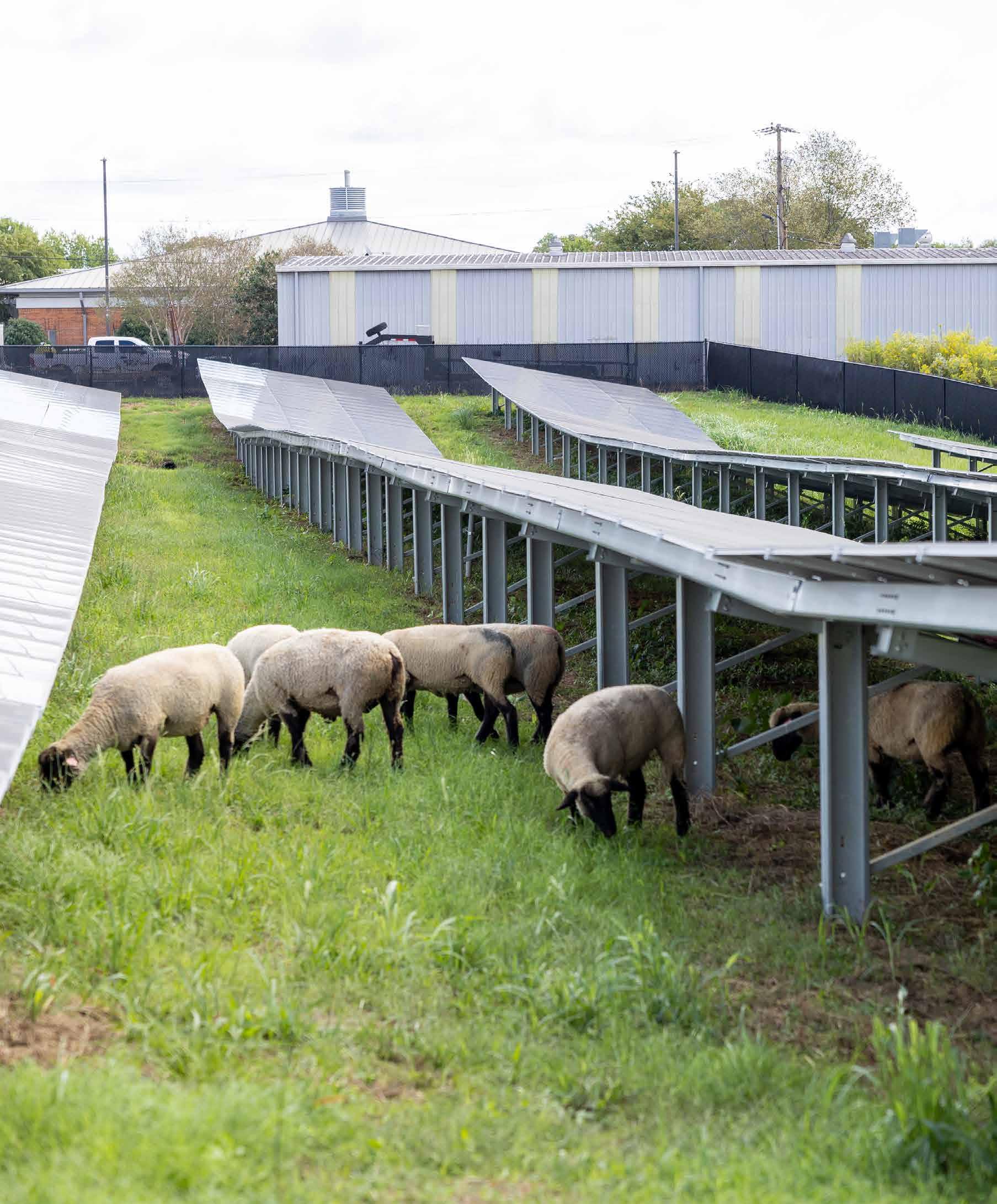
“Establishing creative ways to work between or underneath the panels, grazing compatible livestock like sheep among solar panel installations, or applying engineering tools to manage cultivated systems in confined spaces will further enhance our ability to combine solar endeavors with production agriculture.” ~ Scott Willard

MORE THAN A SCHOLARSHIP
Ed and Susanne Martin champion hands-on learning for engineering students
By Shun Pounds, Photos Submitted
Ed and Susanne Martin’s desire to give back led them to an unconventional path to empower students, not just in the classroom but in competition.
With the establishment of the Ed and Susanne Martin Endowed Student Competition Support Fund, the Martins have created the first named endowment in the Bagley College of Engineering solely dedicated to supporting student competition teams. The fund will provide resources for MSU’s nationally recognized teams, such as EcoCAR, Space Cowboys, Formula SAE and others to help students compete, innovate and represent the university on a national stage.
For the Martins, the gift is personal and purposeful. Though Susanne earned her degree
in accounting from MSU in 1979, and Ed studied electrical engineering at MIT, their shared enthusiasm for real-world problemsolving and education has long shaped their philanthropy. They said supporting MSU competition teams felt like a natural extension of their values.
“We’ve been giving to MSU for some time now,” Susanne said. “When this project was presented to us, we immediately felt it was a great way to allow our gift to have a specific and tangible impact.”
A native of Tupelo, Susanne was a firstgeneration college student. She credits her parents with encouraging her to attend MSU, as they were passionate fans of the Bulldogs whose support for the university originated
from their roots in Mississippi’s agricultural community.
After earning her degree from the College of Business, Susanne eventually made her way to New York, where she shifted into a career in fashion merchandising. She met Ed while windsurfing at the beach in Greenwich, Connecticut. They married in 1998 and settled in New England, but her heart remained rooted in Mississippi.
“We still visit friends and family in the Tupelo area,” Susanne said. “And I take every opportunity to deck out in my MSU attire and attend MSU games wherever I can find them.”
While Ed may not have been a Bulldog by diploma, he’s undoubtedly one by spirit.
“Sadly, I set foot in Mississippi and on
MSU’s campus for the first time only after I met Susanne,” he said. “I didn’t realize what a wonderful place it is. The people, culture, and learning experiences made a lasting impression on me.”
As an MIT-trained engineer, Ed still carries the problemsolving mindset he honed as a student. He recalled the energy of an engineering design class mirroring the spirit of today’s student competitions. Though he never took the class himself, it left a lasting impression.
“In most engineering classes I took, we were solving welldefined problems,” he said. “But there’s always the unknown factor of what your competitors will do in a competition. That unpredictability better reflects real-world engineering and life.”
These hands-on challenges allow students to apply technical knowledge in dynamic, fast-paced environments. More importantly, they foster valuable soft skills like communication, project management and collaboration—qualities employers value highly.
“Engineering can sometimes be dry, even for those fully immersed in it,” Ed said. “We hope the competition will spark enthusiasm for creative problem-solving in a spirited and fun way. If incoming students anticipate participating in ‘the competition,’ we’ve succeeded. Especially if the Dawgs win!”
That kind of excitement is contagious and deeply needed. According to Robert Green, associate dean for academics at the Bagley College of Engineering, competitions like these are transformative learning experiences, but they are expensive.
“Competition teams allow students to apply the knowledge gained in the classroom to design while they manufacture and test solutions to problems within defined constraints, but these teams are often costly,” Green said. “Travel to the competitions is often expensive, and sometimes students pay out of pocket. Funds from alumni allow these teams to offset the often large travel costs, purchase additional materials and pay competition entry fees.”
Without private support, many of MSU’s engineering teams would struggle to stay competitive. Industry gifts help, but the gap remains substantial, especially concerning travel and specialized equipment. Gifts like the Martins’ ensure MSU’s brightest minds don’t miss these formative opportunities.
In addition to their latest gift, the Martins have supported the College of Business, the TK Martin Center for Technology and Disability, and the College of Education. Their generosity reflects a deep belief in the university’s mission to provide transformative education and opportunity.
“Giving back to worthy causes has increasingly become a priority for our family,” Susanne said. “We want to help the next generation of students get as much out of the MSU experience as possible.”
With the Martins’ support, engineering students will continue to build, race, code, fly and solve problems.
“I hope our gift encourages others to explore all the ways they can give,” Ed said. “It doesn’t have to follow a formula. If it helps a student grow, it matters.” n

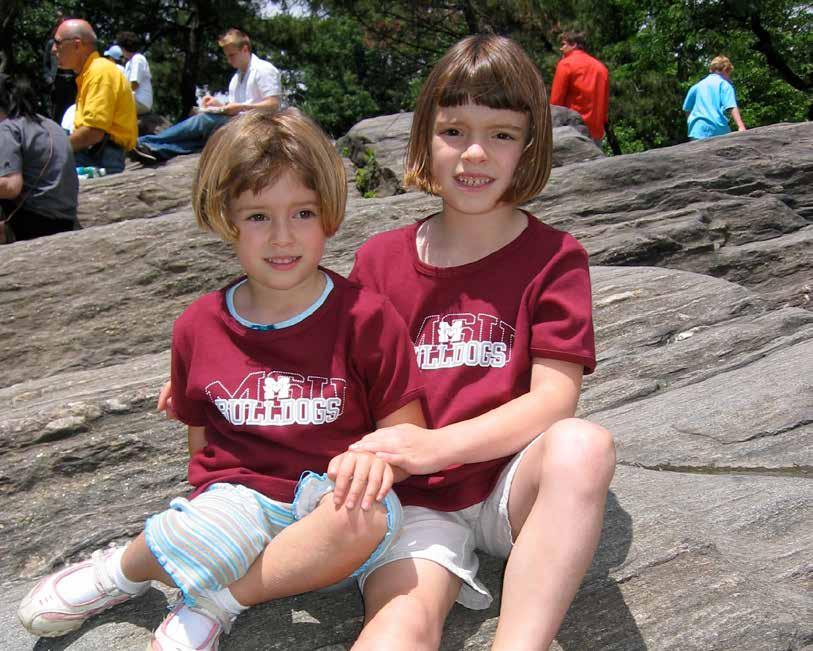
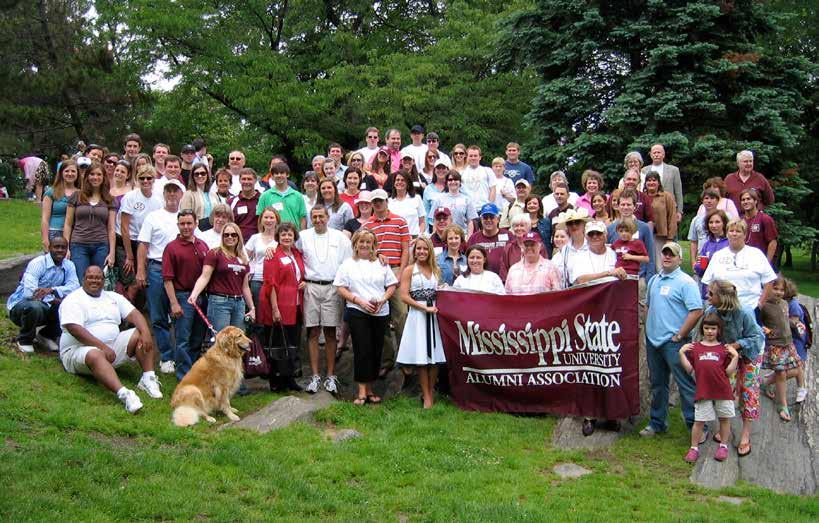
Top: Ed and Susanne Martin cheer on the Bulldogs at Dudy Noble Field during MSU’s matchup against Florida, April 19, 2025. Middle: Annsley and Susie Martin, daughters of Ed and Susanne, enjoy the Mississippi Society of New York’s annual picnic in Central Park, June 2004. Bottom: Mississippi State alumni gather at the Mississippi Society of New York’s annual picnic in Central Park, June 2004.
A Legacy Continued Burwell
follows in her father’s footsteps as national alumni president
By Shun Pounds, Photos Submitted
For Lynn Twitty Burwell, Mississippi State University is home. Her earliest memories are steeped in maroon and white: Saturday games at Davis Wade Stadium, Thanksgiving dinners at Perry Cafeteria, and cheering on the Bulldogs in the Egg Bowl. However, this year, the tradition takes on deeper meaning as she becomes the latest national president of the MSU Alumni Association, marking the first time in university history two generations of one family have held the position.
Following in the footsteps of her late father, William “Buddy” Twitty, who served as national alumni board president in 1986, Burwell carries a legacy rooted in family, service and Bulldog pride.
“I’m beyond excited,” Burwell said. “It’s humbling, especially since I feel like I’ve grown up in the alumni association.”
Burwell was an only child until she turned 18, when her family welcomed her sister, Shelly, during Burwell’s sophomore year at Mississippi State. Shelly later attended MSU, following in her sister’s footsteps.
A proud mother of three and

grandmother of five, Burwell and her family enjoy attending MSU sporting and alumni events. The kids and grandkids always loved spending time with their “MoMo” and Buddy Twitty. Continuing the family tradition, Burwell’s youngest son graduated from MSU.
“I’m beyond excited. It’s humbling, especially since I feel like I’ve grown up in the alumni association.” ~Lynn Twitty Burwell
Burwell always shared a particularly close bond with her father. The two were inseparable at MSU alumni and sporting events, rain or shine. Her dad’s passion for Mississippi State was infectious.
Thanksgivings when Starkville hosted the Egg Bowl hold especially fond memories

for Burwell. In the mornings, the fatherdaughter duo would drop her mother off in Pontotoc to spend time with family, then barrel down the highway to Starkville. They would enjoy juicy cuts of turkey and heaps of dressing with white country gravy under the wooden arches of historic Perry Cafeteria. As they ate, Twitty would share MSU facts with admiration.
“I’d smile at trivia like how one out of every three meteorologists in Mississippi is an MSU alum, or the biomedical engineering program sends more students to medical school than Ole Miss,” Burwell said. “His mind was a Bulldog encyclopedia.”
After dinner, they would head to the game. Those moments together were invaluable. The yelling, cheering, and sometimes sobbing—every bit of it was special.
Twitty’s devotion extended beyond facts and football. He believed in showing up, giving back and helping others find their place at Mississippi State.
Twitty was born in Tishomingo County in 1934. After graduating from MSU in


“You never know who the person you recruit might become. Maybe they’ll be an alumnus of the year or someone who makes a difference in someone else’s life. That’s how we grow this family.” ~Lynn Twitty Burwell
1957, he founded Twitty Insurance Agency in New Albany and became active in the Union County Alumni Chapter. In 1986, he became the national alumni president, a role he embraced with pride.
He was an MSU guy to his core, even in his final months.
“In his last few months, he went to Sonic and struck up a conversation with a high school student who said she wanted to attend MSU but didn’t think she could afford it,” Burwell said. “He mentored her and followed up with her counselor. She enrolled at MSU, earned a scholarship and had a 4.0 GPA her first semester.”
Burwell began her service as a student. She joined Kappa Kappa Gamma, participated in Campus Crusade for Christ and the Baptist Student Union, served on the Omega Board, and remained active in her academic clubs until she graduated from MSU in 1980 with a degree in home economics.
After moving to the Mississippi Gulf Coast in the late 1990s, Burwell helped launch the Harrison-Hancock Alumni
Chapter, now known as the Coast Chapter. The group spent its early years hosting community events, golf tournaments and scholarship fundraisers. Today, she helps coordinate events like Dining with the Dawgs and participates in service projects such as shelter supply drives and cancer awareness walks.
“I want everyone to find their niche,” she said. “Some people love roadside cleanups. Others love mentoring or visiting nursing homes. We want to make it easy for people to get involved in a way that’s meaningful to them.”
Burwell’s leadership role expanded with time. She served two terms as the Mississippi South Region 3 director, led the Coast Chapter as president and was named vice president of the national alumni board before being elected president. She also volunteers with the Alumni Recruitment Network and the Bulldog Network Mentor Program, maintaining close connections with prospective and current students.
Burwell believes in the power of personal connection through writing handwritten
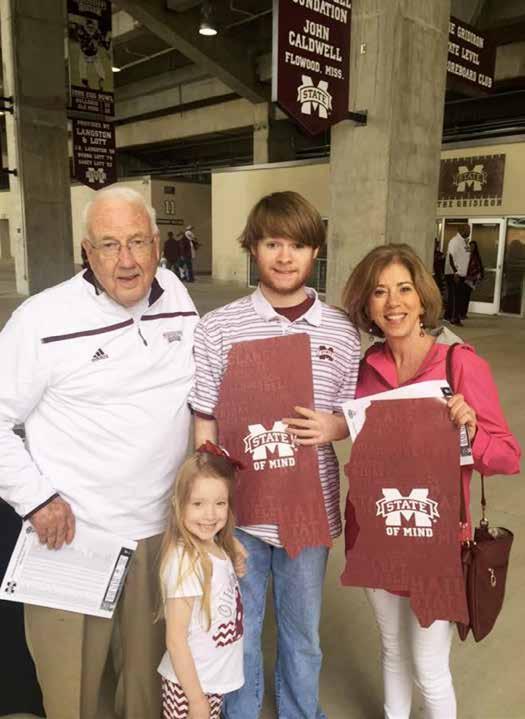


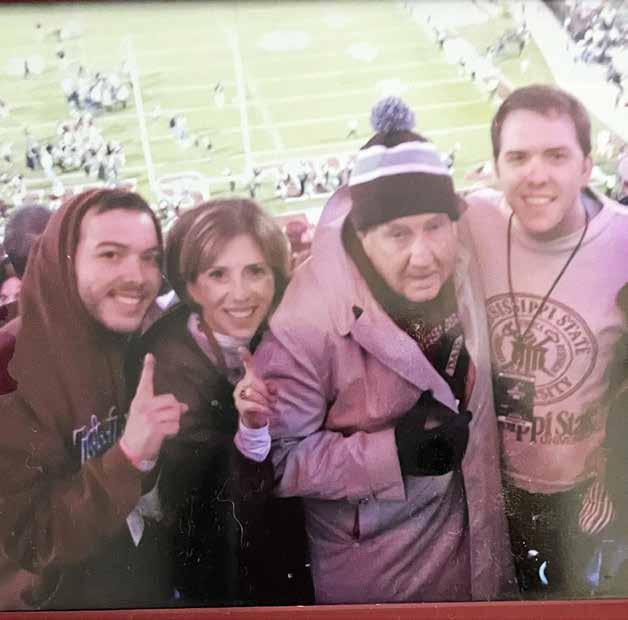
Family has always been at the heart of Lynn Twitty Burwell’s Mississippi State story. From cheering alongside her father, William “Buddy” Twitty, to sharing Bulldog traditions with her own children, the Burwell legacy reflects a bond of Maroon and White passed from one generation to the next.
notes to recruits or mentoring young alumni.
“You never know who the person you recruit might become,” she said. “Maybe they’ll be an alumnus of the year or someone who makes a difference in someone else’s life. That’s how we grow this family.”
As the national president, Burwell views herself as a bridge between generations, local chapters, university leadership, and new ideas and time-honored traditions.
“I want alumni to feel like they have a place at the table, no matter their age or background,” she said. “Whether through a golf tournament, a happy hour, a 5K or a handwritten note, we all have something to give.”
Burwell also expressed deep gratitude for her predecessor and close friend, Terri Russell, whom she credits with creating unity among the board.
“Terri has done a fabulous job. She’s made the board feel like a close-knit family,” Burwell said. “I’m grateful to have had her

guidance, and I know she’ll continue to be an important part of the association.”
Looking ahead, Burwell hopes to enhance communication between chapters, launch new engagement opportunities and help alumni rediscover what makes MSU special.
“Some people don’t even realize their coworkers are Mississippi State grads,” she said. “I want to find those opportunities to connect people, whether at work, in their community or through events.”
She also envisions new programming reflecting the wide range of alumni interests. Most of all, she wants to cultivate a culture of giving financially as well as through service, encouragement and connection.
Her message to fellow alumni is simple: show up.
“You don’t have to take on a big responsibility,” she said. “Just come to dinner. Come to a happy hour. Meet someone new. Reconnect with what made Mississippi State special to you.” n

“I want alumni to feel like they have a place at the table, no matter their age or background. Whether through a golf tournament, a happy hour, a 5K or a handwritten note, we all have something to give.”
~Lynn Twitty Burwell


Moments with her father, from being perched on his lap blowing out birthday candles, to taking early steps with his steady hand, and later gathering with her own children by his side, illustrate how Lynn Twitty Burwell’s Mississippi State journey has always been rooted in family.

1970s
Yazoo City-native Aubrey Hill (B.S., M.S. microbiology, ’74, ‘76) has released “Moon Hollow,” his first novel. Set deep in the Alabama woods, the book centers on the fate of two hunters and the lives of the mysterious Moon sisters. Hill drew inspiration for the book from a still image of a young, well-dressed woman captured on a trail camera in a remote area of Talladega National Forest near a handmade marker reading “Don Moon Hollow,” which he was unable to learn about despite research. In addition to his MSU degrees, Hill holds a master’s in computer science from Jackson State and a doctoral degree in the same field from the University of Alabama, Birmingham. “Moon Hollow” is available from online booksellers in print and digital forms. (photo)

Presidential Rank Award, the Meritorious Civilian Service Award and the Bronze Order of the DeFleury. She was also among Mississippi’s 50 Leading Business Women in 2007 and an MSU Distinguished Fellow in 2003.
1990s
Army’s modernization mission. He serves in the Chief Information Office at Army Futures Command headquartered in Austin, Texas.
Pete Weisenberger (B.S., M.S. animal and dairy science; ’78, ’82) was appointed to a three-year term on the board of trustees of The FarmHouse Foundation which supports the work and mission of the FarmHouse Fraternity. He joined the MSU chapter in 1978 and is an independent agricultural business management consultant in Tyler, Texas, where he is also active with the East Texas Chapter of the MSU Alumni Association.
1980s
Beth Fleming (B.S chemical engineering, ’88; M.S. chemical engineering, ’94) was named director of the U.S. Army Engineer Research and Development Center. As director, the fourth in organization history, she leads one of the most diverse research organizations in the world, comprising seven laboratories across four states, with more than 2,600 employees, $1 billion in facilities and an annual program valued at $2.2 billion. She is a 16-year member of the Senior Executive Service with extensive leadership experience. In addition to her MSU degrees, she holds a doctoral degree in civil and environmental engineering from Louisiana State University. Her numerous honors include the Superior Civilian Service Award, the Distinguished
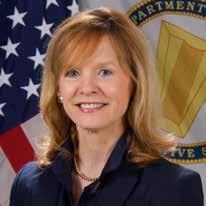
Christi Robinson (B.S., M.S. civil engineering; ’93, ‘96) now leads the Huntsville, Alabama, regional office of Waggoner Engineering as principal engineer. With more than 25 years of experience in the area, she will now provide leadership for the company’s continued growth, including development, implementation and coordination of projects, plans and programs designed to enhance community infrastructure. Additionally, she has taught part-time at the University of Alabama, Huntsville for 15 years, earning recognition for excellence in her approach to capstone course instruction. She is also pursuing a doctoral degree in systems engineering from the University of South Alabama.
Zack Ivey (BBA, ‘99) is now chief investment officer at Savant Wealth Management. He was an advisor and chief investment strategist for Bridgeworth Wealth Management before it was acquired by Savant. In addition to his MSU degree, he holds an MBA from the University of Alabama and is a member of the Chartered Financial Analyst Society of Alabama and the Financial Planning Association.
2000s

Richard Russo (B.A. communication, ’00) is serving the Mississippi Association of Coaches as the statewide football chair. He was awarded the Marshall County Sports Network Lifetime Achievement Award. During his 24-year career, he has coached 783 varsity players and 84 college signees.
Blake M. Macon (B.S. software engineering, ‘03) was awarded the Civilian Service Achievement Medal in recognition of his contributions to the
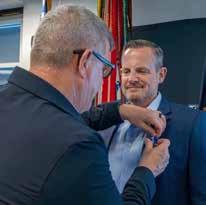
Janis A. Hearne (B.S. educational psychology, ’05; M.S. counselor education, ’08) was accepted to the Walden University health education and promotion doctoral program where she will focus on behavioral health. She works with The Wellspring Alliance for Families in Louisiana and is a case manager and housing stabilizer for its Supportive Services for Veterans and their Families, Permanent Supportive Housing and Home At Last programs.
2010s

John Blanchard (B.A. political science, ’13) is now a partner at Hammonds, Sills, Adkins, Guice, Noah and Perkins LLP. He earned his law degree at the Southern University Law Center in Baton Rouge, Louisiana, and joined the firm full time in 2016 following his graduation.

Christina McField (BFA, ‘16) was selected as one of the featured artists of the Mississippi Museum of Art’s 2025 Mississippi Invitational exhibition which highlights contemporary artists living and working in the state.
2020s
Courtney Lee (B.S biomedical engineering, ‘24) is a student ambassador at the Southern College of Optometry in Memphis, Tennessee. In this role, she assists in student recruitment, admissions and public relations activities.
Birth Announcement
Jack William Estess born April 19, 2025, to Paige and Conner Estess (’15) of Petal.



Spencer K. Bedenbaugh (B.S. accounting, ’49) 98, Vestavia Hills, Alabama – The son of a professor, he is said to have “grown up” on the Mississippi State campus. He interrupted his college education to enlist in the U.S. Navy during the last year of WWII and was stationed in Hawaii. Following an honorable discharge, he returned to MSU to finish his degree. After his graduation, he moved to Birmingham, Alabama, where he worked as an internal auditor for U.S. Steel until his retirement. — March 27, 2025
Anne Charisse Cook Crawford (B.S. business education, ’79) 67, Blanco, Texas – A native of Picayune, she and her husband lived and worked in various Gulf Coast cities before settling in Texas. She was a devoted wife and mother and pursued her passion for design by earning a bachelor’s in interior design and founding Crawford Creations. June 8, 2025
Frank M. Davis (B.S., M.S., Ph.D., entomology, ’61, ’63, ’65; Emeritus professor) 85, Starkville – A former MSU tennis star, he was a longtime research entomologist for the USDA and an adjunct professor at MSU. Throughout his far-reaching career, he authored or co-authored 163 publications, patented the “Davis Inoculator” and was instrumental in establishing the first insect rearing educational program in the U.S., which now bears his name. In 2000, his contributions to agriculture were recognized in Mississippi Senate Concurrent Resolution 568, and, in 2005, he was named a Fellow of the Entomological Society of America. Also a civic leader, he served as vice mayor for Starkville and on the city’s Board of Aldermen.
— Jan. 10, 2025
James Berry “Jim” Hollis Sr. (B.S. agriculture, M.Ed. agricultural & Extension education; ’64, ’74; retired Extension agent) 83, Meridian – Following his MSU graduation, he and his wife Linda moved to Meridian where he joined the Lauderdale County Extension office as the 4-H Youth agent. He retired as the lead Lauderdale County agent after 28 years with the Extension service. Following the loss of their daughter, the Hollises joined other grieving parents to
cofound a chapter of Compassionate Friends with the mission of supporting bereaved parents. — Jan. 27, 2025
Bennie Charles Keith Jr. (M.S. agronomy, Ph.D. agricultural science, Ph.D. agronomy; ’74, ’81, ’91; retired Extension agent, faculty) 72, Starkville – A native of Hollandale where he learned the value of hard work on the family farm, he was a high school football star and won the state science fair with his invention of the brake fluid indicator. This light was first manufactured by the Ford Motor Co. and became a standard feature on all cars. Following his graduation from MSU, he began a career with the MSU Extension Service at the Delta Research Extension Center in Stoneville. He later became department head of MSU’s Foundation Seed Service. He was director of the Mississippi Seed Technology Program at the time of his retirement. During his academic career, he authored numerous publications, taught graduate-level courses and established seed labs in foreign countries. He had a second career with the Mississippi Crop Improvement Association, serving 20 years as the executive secretary. He also provided valuable service to the Association of Official Seed Certifying Agencies as president in 2007-08. He was recognized among the Who’s Who in Mississippi and a member of the Knights of Columbus. Active in the community, he coached little league baseball, including the local All-Stars and leading a team to the Little League World Series. — May 31, 2025
Hardy Cole Kergosien (B.S. industrial engineering, ’69) 77, Hazlehurst – A member of the Pi Kappa Alpha fraternity at Mississippi State, he began his career at Union Carbide Corp. in Texas. He later returned to his hometown, Hazlehurst, where he served his community for 31 years in the hardware business. He was active in a variety of civic organizations and his church.
— Feb. 17, 2025
Robert Thomas “Bob” Littlejohn (B.S. accounting, ’66) 79, Murfreesboro, Tennessee – Born, with twin sister Betty, on Mississippi State’s campus to W.W. Littlejohn, who
established MSU’s accounting program, he was a lifelong Bulldog and a CPA.
— Dec. 17, 2024
Rev. Joseph Clifton “Jody” McWilliams Jr. (B.A. religion and philosophy, ’59) 87, Richmond, Virginia — He was commissioned as an officer in the U.S. Army, and was inspired by his service to pursue a master’s in divinity and theology, and another in psychology and pastoral counseling from Boston University. He was ordained in the United Methodist Church and began training to be a chaplain at the Medical College of Virginia. He later led two small congregations around Ruther Glen, Virginia, while earning his third master’s degree, this one in social work from Virginia Commonwealth University. From 1971 until 2004, he served as executive director of the William Byrd Community House in Richmond, Virginia, including working with the community toward racial integration in the 1970s, successfully fighting the expansion of VCU in the 1980s and supporting the growth of WBCH’s service area in the 1990s. Throughout his life he mentored hundreds of social workers. He earned recognition from chairing the United Neighborhood Center of America Executive Board and earned VCU’s Alumni Star Award. He was an active member of the Kiwanis Club and Leadership Metro Richmond. — March 9, 2025
James Carson Patton Jr. (B.S. social studies education, ’76) 71, Starkville – Following his graduation from MSU, he earned a law degree from the University of Mississippi. He has a reputation as a ferocious litigator who dedicated his practice to helping the underserved. — Dec. 5, 2024
Boma Cave Pennebaker Sr. (B.S. physical education, ’72) 75, Flowery Branch, Georgia
– A Georgia native, Pennebaker attended Mississippi State on a full track scholarship, becoming a four-year letterman in high hurdles. He was a member of the Pi Kappa Alpha fraternity and an Air Force Reserves veteran. He owned and operated Pasquale’s restaurant in Gainesville, Georgia, for more than 30 years and enjoyed traveling the world with his wife JoAnne. — Dec. 28, 2024
Fred Oliver Simons Jr. (B.S. electrical engineering, ’60) 87, Orlando, Florida –Following his graduation from MSU, he earned master’s and doctoral degrees in the field of electromagnetics from the University of Florida with a Ford Foundation Fellowship. He then joined the electrical engineering faculty at Florida teaching graduate-level courses through a first-of-its-kind statewide, interactive, live TV system. He later moved to the University of Central Florida where he spearheaded the electrical engineering department’s evolution into an electrical and computer engineering department. He was then selected by Florida State University to launch the FAMU-FSU College of Engineering. During his career he produced more than 150 research papers. He retired as a Professor Emeritus at Florida State. — Oct. 26, 2024
Tommy E. Smith (B.S. electrical engineering, ’65) 82, Ocean Springs – His career with Mississippi Power spanned 30 years, taking him from junior engineering to Power Generation and Services director before his retirement in 1998. — June 2, 2025
James Hobert “Jim” Taylor (B.S. agricultural engineering, ’51) 95, Opelika, Alabama –Following his MSU graduation, he served in the Korean War. He then worked at International Harvester Co. in Memphis, Tennessee, until moving to Auburn, Alabama, to pursue graduate studies. He earned a doctoral degree in what is now biological engineering. In 1978, he was named one of 30 Engineers of the Century to celebrate the university’s 100th anniversary. He spent 30 years as a research engineer with the USDAARS National Soil Dynamics lab and was an adjunct professor, responsible for directing master’s and doctoral candidates for Auburn’s graduate school. A registered Professional Engineer, his basic traction research culminated in leadership of national and international programs as a national technical advisor for traction and controlled traffic. He was a member of several professional societies and worked closely with scientists from around the world. He died one day shy of turning 96. Jan. 27, 2025

with KENNETH “KENNY” ROGERS
When nepotism policies prevented my return to the Starkville Police Department, where my uncle was a captain, that could have been the end of my law enforcement career—and it did pause it for a year. During that time I sold cars at Premier Ford, Lincoln, Mercury in Columbus. It was an interesting job, but it wasn’t what I was meant to do.
That’s why I applied for and gladly accepted the most entry-level policing position at Mississippi State—ticket writer. It didn’t make me the most popular person on campus but was the first step toward what is a very fulfilling career at Mississippi State.
Since 1996 I have held every position with the MSU Police except dispatcher and worked under every police chief the university has had except B.S. Hood. The experiences I’ve had have given me a perspective of this university and its people that most people never get to experience.
Remember the parachute accident at Davis Wade Stadium prior to the Bulldogs 17-16 upset of No. 11 Alabama in 1996? I was on duty. I can still remember the collective gasp then hush of the crowd when the sky diver landed and was severely injured. I also remember the absolute roar at the end of the game when Jackie Sherrill’s team had beaten Gene Stallings’.
Bulldog legends? I’ve shaken their hands. Performers? I’ve seen them backstage. Dignitaries? I’ve met so many. In 2008, when both former Secretary of State Colin Powell and former Supreme Court Justice Antonin Scalia spoke on campus, I was at each event and got to meet them. The same in 2013 with former Secretary of State Condoleezza Rice.
But it’s not the famous names or historymaking events that make me love my work. It’s the people and campus that make Mississippi State so special. In fact, one of my favorite duties isn’t providing security for high-profile guests. It’s bike patrol.
Using a bicycle to patrol campus provides a level of community engagement you can’t get in a squad car. It kept me in shape and provided me with the opportunity to
connect with people and see everyday campus activities from a different perspective. It’s something I really enjoy and really miss. Even though I’m not 30 anymore, I would still like to do it again.
I’ve spent over half my life here and as my career has grown and role has changed, so has the university. And that’s never more apparent than when riding around campus on a bike or patrolling the buildings—it’s amazing to see how this university has evolved. And those changes in the size and scope of the university mean our job as a police force changes, and the department has been able to adapt.
The one thing that doesn’t change at Mississippi State is the community that makes up the Bulldog family. The students are all here to learn—and have some goodnatured fun like the occasional fraternity rivalry or prank among friends that gets us called out. And I am honored to get to protect and serve them as they reach their goals and become the leaders of tomorrow.
Kenneth “Kenny” Rogers was named Mississippi State’s chief of police in 2023, capping a longtime and distinguished career with the nationally accredited law enforcement agency. A native of Starkville, he is a graduate of the FBI National Academy and the FBI Mississippi Law Enforcement Command College. He earned a bachelor’s in business administration in 2002 and a master’s in public policy and administration in 2016, both from Mississippi State University.



Rogers with former U.S. Secretaries of State Colin Powell (2008) and Condoleezza Rice (2013) during their visits to Mississippi State University.

Found in the University Archive, this photo captures a packed day at Mississippi State’s Left Field Lounge, a one-of-a-kind tradition where fans cheered on Bulldog baseball from tailgates, trucks and homemade seating just beyond the outfield fence. What began in the 1960s as fans pulling up their pickups to watch a game evolved into one of college baseball’s most famous atmospheres. Today, Dudy Noble Field looks very different with its modern stadium design and built-in suites, but the Lounge’s legacy remains a point of pride for Bulldog fans. Were you part of Left Field Lounge or do you have memories of MSU baseball from those days? Share your stories at alumnus.msstate.edu or by emailing alumnus@msstate.edu. Include your name, major(s), and graduation year(s)—your memory could be featured in a future issue.
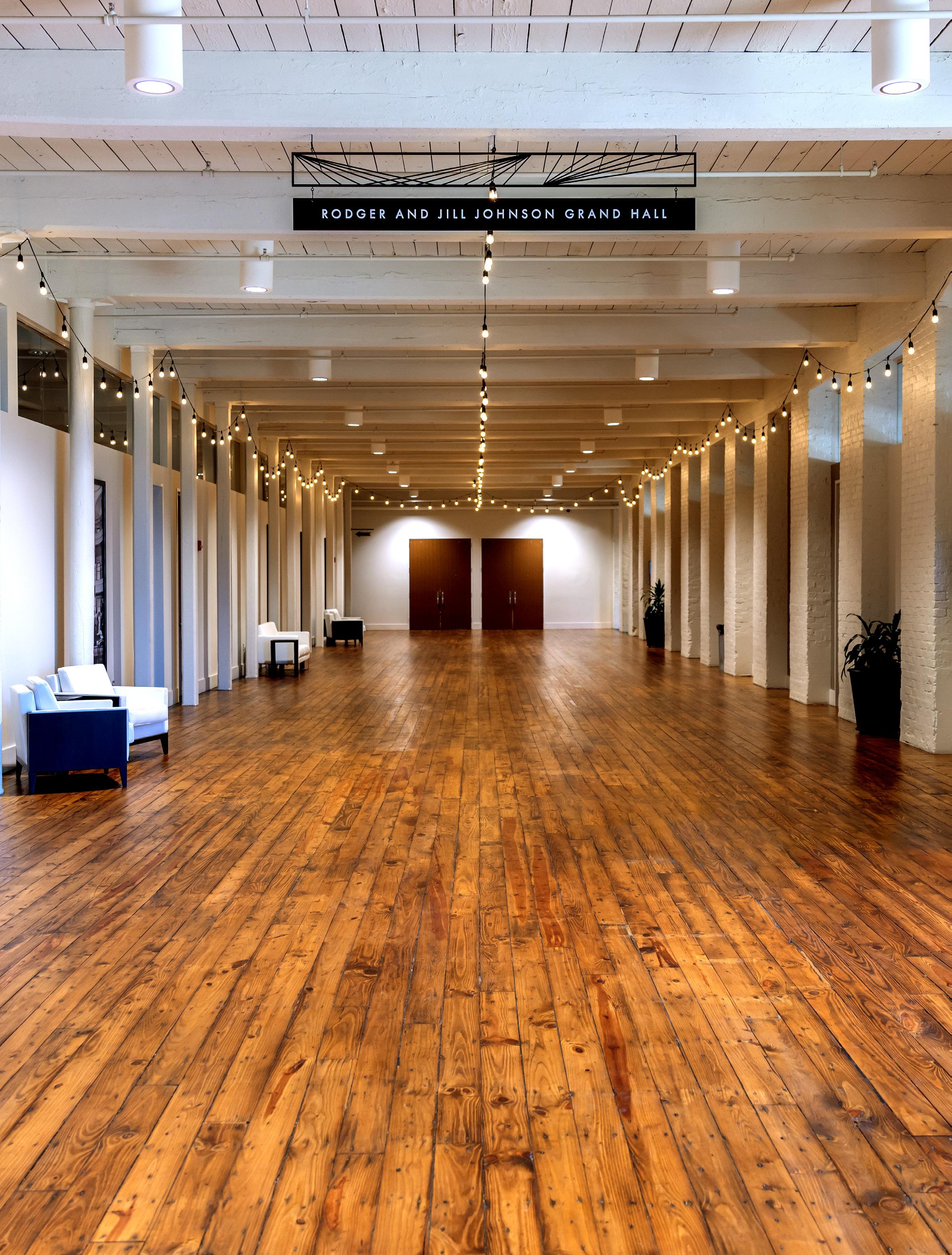
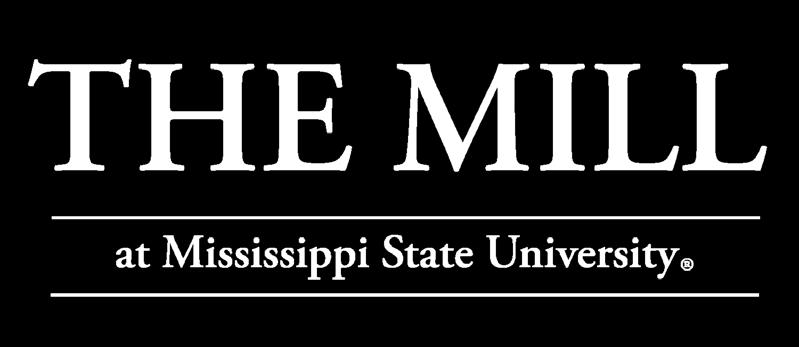
For your next unforgettable event, choose The Mill—a beautifully restored 90,000-square-foot venue built in 1902 and listed on the National Register of Historic Places. The Grand Ballroom, perfect for large events, accommodates up to 1,000 guests. For more intimate gatherings of up to 100 people, consider the Randy and Nina Cleveland Gallery. With stunning backdrops perfect for celebrations and photography, the choice is yours at The Mill.
Contact The Mill Event Management Staff at 662.325.7300 for more information, or visit our website www.themillatmsu.com. Make your event unforgettable by choosing
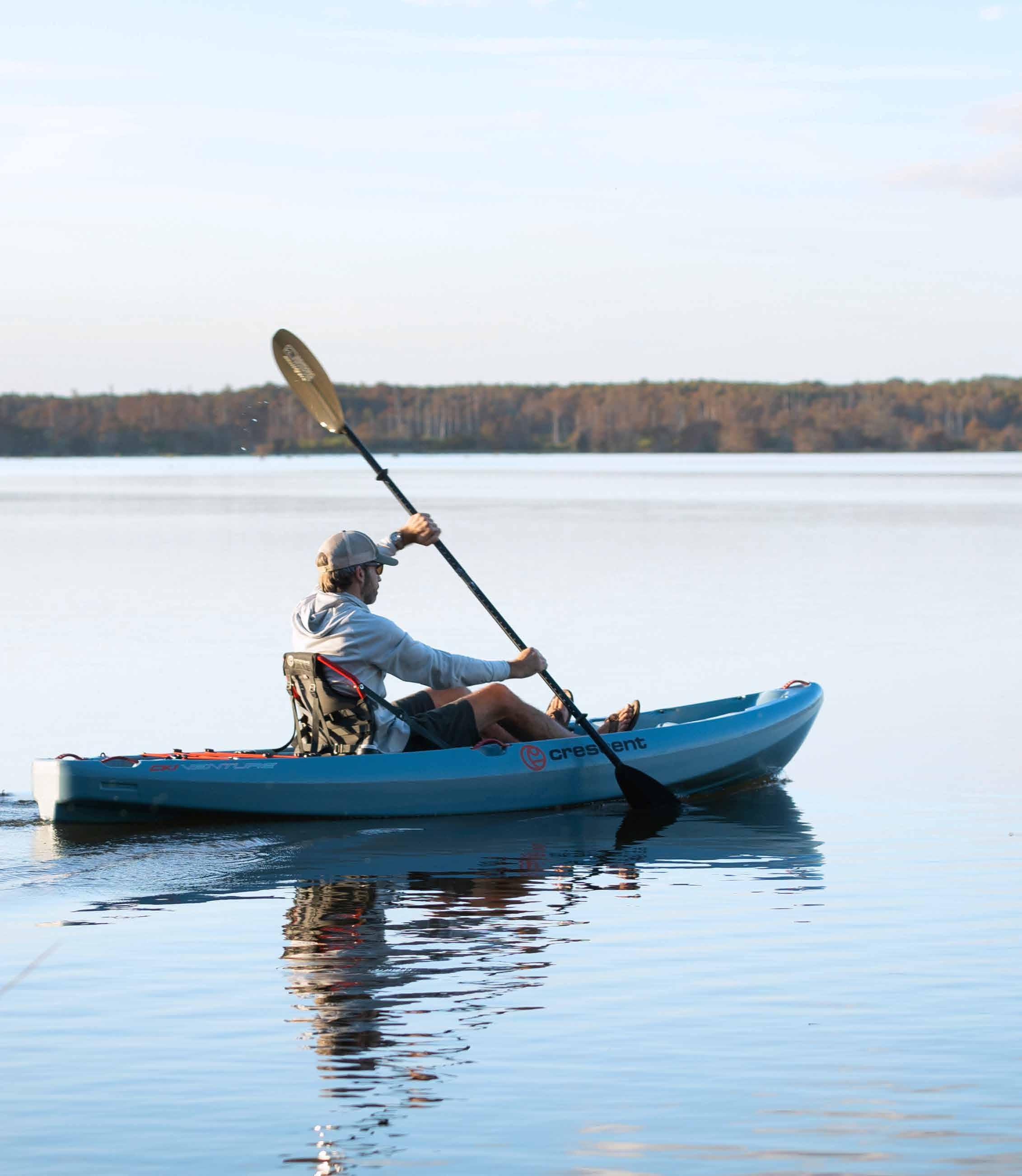
600

BRAGGING RIGHTS
MSU Esports looks to extend its statewide dominance through the upcoming 8 th Annual Esports Egg Bowl. With a 5-2 all-time record over rival Ole Miss, the Bulldogs are building a legacy of success in competitive video gaming—the fastest growing sport in the world. p. 12
